The Bulletin

MAGAZINE - March 2023
 APEA (The Association for Petroleum and Explosives Administration)
APEA (The Association for Petroleum and Explosives Administration)
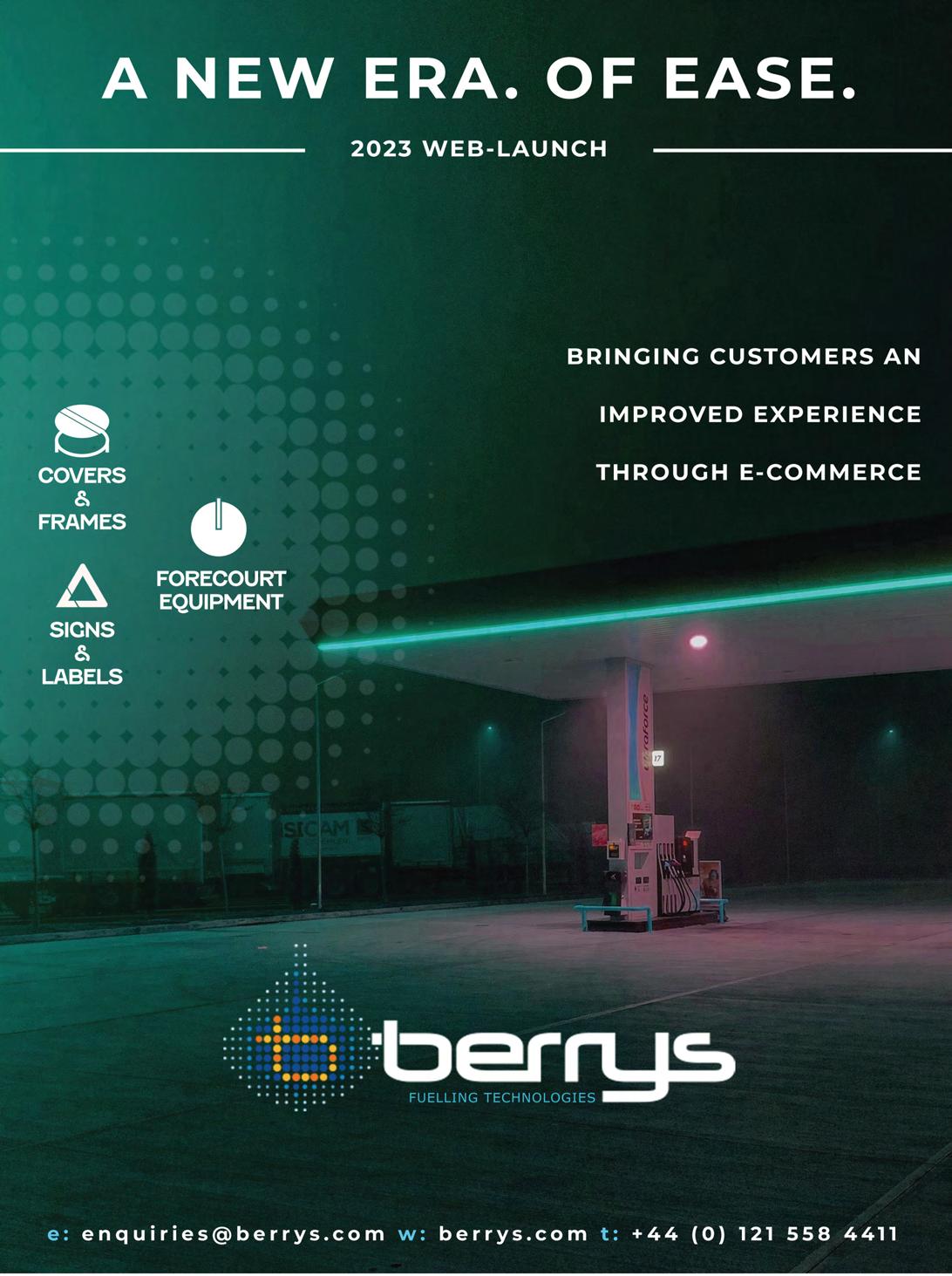
Publications Information
2024 Yearbook - How to complete your free entry. Deadline 1st April
APEA AGM - 17th November 2022
APEA Live - 17th November 2022
Montpellier Port Replace Corroding Metal Pipes with KPS Corrosion-Resistant HDPE Piping to Prevent Fuel Permeation
APIApipe™ Bunded Pipework System from Fuel Storage Solutions for Safe Storage and Use of Liquid Fuel
Is Your Asset Maintenance Approach Providing True Value in the Real World?
Fuel Retailers are Feeling the Pinch
TSG’s Driver-Controlled Delivery System
Why Ad-Blue is Not Green
Understanding Total Cost of Ownership (TCO)
Petroleum Sales Declining: New Fuels Growth
The EV Revolution - Are We Playing with Fire?
The Evolution of Wetstock Management
Canopy Maintenance - Do I Need to Maintain my Canopy?
PEI Recommended Practices
APEA Online Training Courses
Manipulation Proof Control Box for Gas Tankers Patented
News
Press Releases
Branches
Training
APEA Live 2023 Conference, Exhibition and Awards Dinner
Opinions expressed in this magazine are not necessarily the views of the Association. The technical content is not an official endorsement by or on behalf of the APEA and are entirely the views of the authors.
Inside Inside APEA tel: 0345 603
www.apea.org.uk 3
5507
Published by the APEA (The Association for Petroleum and Explosives Administration) A company Limited by Guarantee Registered in England No. 2261660. Front cover: Orlen petrol station Bydgoszcz Poland 4 6 8 10 10 14 16 18 20 23 26 26 29 31 34 36 38 40 42 44 46 52 53 70 76 78 80 Welcome Editorial Business Manager New Members
Welcome
choose is, almost, a low point in the evening as we need to let them tell us their reason for existing. This year I chose Mates in Mind because I believe that our industry has a duty to support the workers within it – many of whom work away from home and although often with colleagues that can still be incredibly isolating. Particularly if you have problems at home that a) you are not there to deal with and b) can’t talk to your colleagues about. I know that some people were deeply touched by the presentation so, if it upset you I apologise but I am delighted with the money we raised for such an important cause. Any worthwhile charity we pick will hit home to someone in the room.
Welcome to 2023! Although it seems a while ago now I would like to thank everyone involved in making APEA Live 2022 another outstanding success. Given the changes within our industry it really is a challenge to keep everything we do relevant – so well done team!
Having written in the last Bulletin about how often people come and go in our industry, for me this photograph epitomises APEA Live. Jacquie and I have crossed paths many times over the years in our various roles. APEA Live is where you catch up with everyone, chat about the past and look to the future.

Moving away from APEA Live, the next revision of the Blue Book is now underway with our Technical Committee working with the Energy Institute and other stakeholders to review each section and recommend any improvements. There will be a lot of work in the background over the coming months followed by the usual industry review of any proposed changes before publication.
Many Branches are still struggling to arrange face-to-face local Branch meetings which is a great shame as the online meetings don’t allow for the networking element which is so valuable. And I miss conference lasagne and chips! Joking apart it has become increasingly difficult for members to justify time away from their business to attend events. Don’t forget that we always try to include enough content to justify issuing a CPD certificate if that helps anyone to make their case.
As many of you will have heard, our Training Committee was delighted to work with the Petroleum Enforcement Liaison Group (PELG) to provide a package of online training courses which would provide petroleum enforcement authority officers a foundation level of knowledge to undertake their role. This is great news. After all that’s why the APEA is here.
One of the features of our awards dinner is the opportunity for a charity to raise some funds through our event. It is the prerogative of the incumbent Chairman to choose the charity; it’s not an easy decision to make. Charities exist for good reasons so whatever we
APEA Business Manager

(contact for all APEA Business and Bulletin advertising, design and typesetting)
Jane Mardell
APEA, PO Box 106
Saffron Walden, Essex CB11 3XT
Tel: +44 (0) 345 603 5507
Mobile: +44 (0) 7815 055514
email: admin@apea.org.uk
I’m sure some of you will have experienced challenges with our website. having been through the process of change a couple of years ago, which allowed for auto renew of membership, the regulations changed last year which resulted in the platform our web designers had used not being compliant. That is why, over the last year, you will have been told that your membership has expired and needs renewing. Once you’ve completed the process again it “should” then auto renew – famous last words!
Publications Chairman

Andy Kennedy
Mobile: 07469 212063

email: andykennedy@apea.org.uk
Editor
Brian Humm
Mobile: +44 (0) 7507 478533
email: b.humm@outlook.com
Find us on Linkedin and Twitter
Doreen Pooley APEA Chairman
Welcome APEA tel: 0345 603 5507 www.apea.org.uk 4

Editorial
Brian Humm Editor
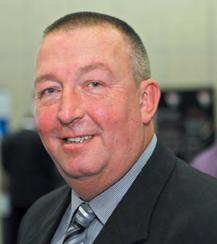
Welcome to this new edition of the APEA Bulletin magazine, the first one in 2023. So, I know it is a bit late but I would like to start with wishing all our members a happy and prosperous year! I sincerely hope that you enjoy the usual mix of articles and news items that we have managed to cobble together for your perusal. This may sound familiar to members but once again I would like to appeal to you to consider submitting something for publication; anything you think maybe worthwhile and of interest to members. I’ll happily consider anything. If you are thinking of submitting photographs can I ask that they are high resolution and of good quality, otherwise they are hard to reproduce to an acceptable standard.
Major financial issues are being experienced within the UK, and in fact the world. Inflation running high, energy prices going through the roof, worrying times indeed, hopefully a more stable future lies ahead and the worries of how to afford to live might ease. Bearing in mind that the UK is to ban the sale of conventional ICE vehicles and place reliance on EV, Hydrogen, CNG etc, this will obviously mean that people will have to look at investing in a new vehicle that complies at a considerable cost, something that is daunting for a lot of people in society. Gone will be the days where you could buy a cheap run-around for a small price, with the ICE ban and the introduction of low emission zones it will certainly be challenging.
At the moment of writing the Mayor of London is looking to expand the ultra-low emission zone (ULEZ) to encompass the whole of the area inside the M25. This will lead to a lot of stress for a lot of residents; £12.50 a day to drive a vehicle, that doesn’t meet the standard, 7 days a week, 24 hours a day. Obviously challenges are underway but this could be the beginning of the end of driving in the Greater London area - watch this space!
Further on in this edition, on page 46 you will see an article in regard to the APEA/Olive Group online training collaboration. Good news in respect of this training; the Petroleum Enforcement
Liaison Group (PELG, a UK HSE sanctioned working group) has endorsed this training as part of the training required to become appointed as a petroleum officer (PO). This is exciting news; training of PO’s throughout the UK ranges from excellent to nonexistent. My training as a PO lasted for a whole year and included shadowing experienced officers and being tested at regular intervals. This was in the heady days of the early 80s, when the GLC reigned and had money to facilitate this type and level of training. This obviously cannot be done today; there was a BTEC in petroleum regulation but this has now been discontinued. PELG has looked at the APEA training and agrees that it is a good foundation for a PO to start from. If they couple the online training with the physical courses we run then that will ensure that the person undertaking the role will have the necessary tools to undertake the position.
On a lighter note, I have just seen an advert on the television for a well-known chocolate bar. It is based on a petrol forecourt where a customer fills a car and pays through the night window, buying a chocolate bar as well. He then walks back to the car and leaves the chocolate with the young girl who served him. It transpires that this is his daughter, who then uses the site tannoy system to say thank you; long winded to get to this point but it is good to see a working tannoy! I jest, but did you know the availability of the tannoy system is what enables self-service? In the swinging 1960’s self-service was to be brought in and the petroleum regulators believed that Armageddon would occur. They requested that the person in control of the forecourt be able to communicate with the customer at the dispenser; originally it was two-way communication! I can imagine some of the language unleashed towards the cashier on some occasions! They soon got rid of the two-way function. If the tannoy is not working then a filling station should not operate self-service until it is available again, something which operators are not always aware of.
It has struck me recently that today we rely heavily on the technology around us. Amazing as it is (I am a technophobe) my reliable old laptop, which I have enjoyed for some 12 years, kept flashing up a message that something wasn’t going to be supported from January 2023. It was also running very slow, and finally it decided not to want to play anymore, sad but inevitable. The venture into a new one was eye opening; the amount available is staggering, which one to choose? The new one I have sourced is taking a while to get used to, six months now and still learning. One thing I will say is I now back up all my files regularly; the amount of info I have lost is staggering, lesson learned!
On that note I hope you enjoy this edition, until next time…
6APEA tel: 0345 603 5507 www.apea.org.uk Editorial
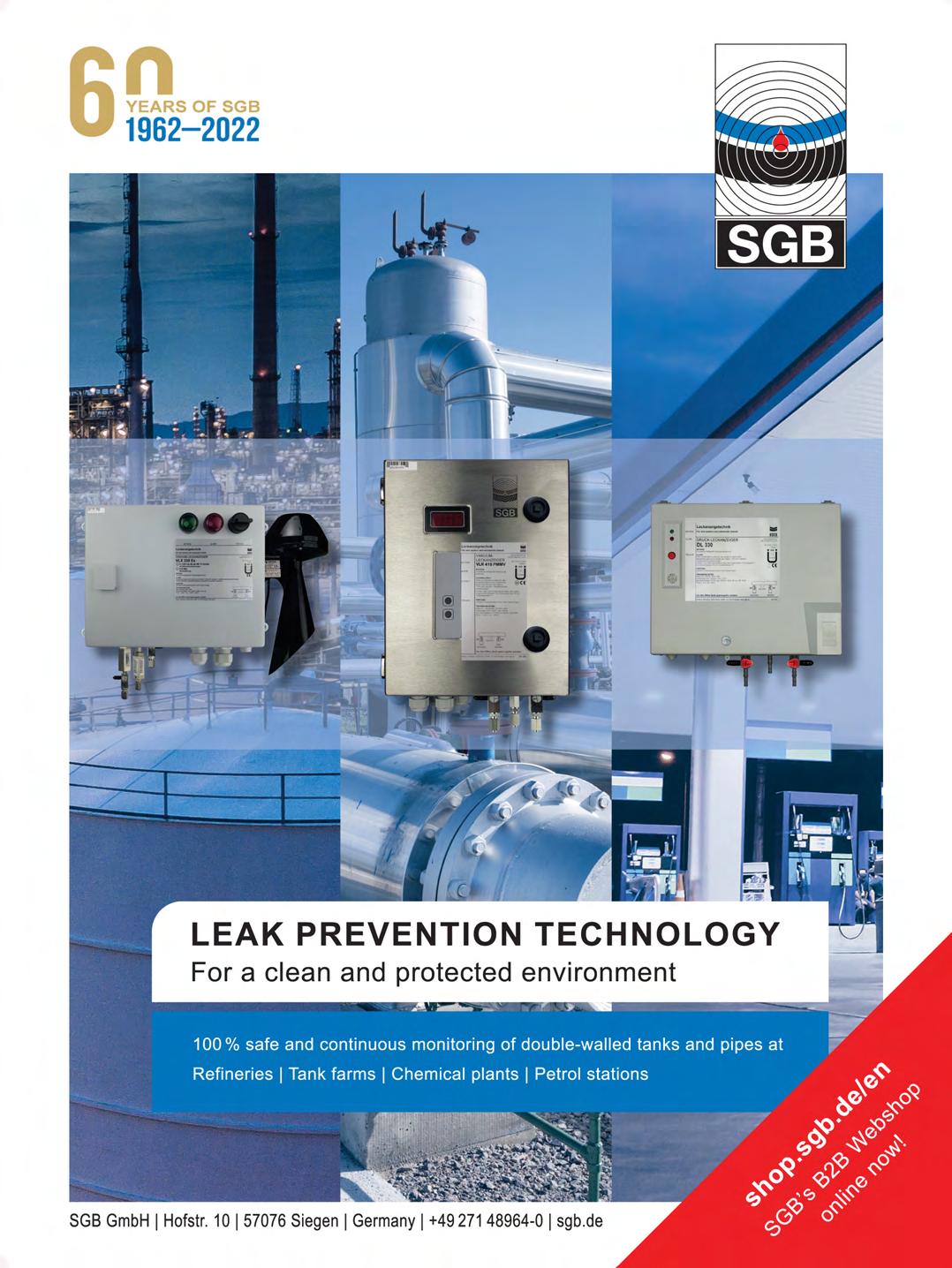
Business Manager
Important: Only entries completed by members for the 2024 Yearbook will be displayed on ‘Directory’ page of the website at www.apea.org.uk and printed in the hard copy.
Membership
Memberships run for 12 months from the date of joining or payment for a renewal. Once the membership has been paid by debit or credit card it will auto renew by card one year later.
Jane Mardell Business Manager

I hope you all had a good Christmas and wishing you well for this year. I am looking forward to the warmer weather after the arctic blasts this winter.
APEA Live
It was good to see so many of you at APEA Live 2022 in November at Stadium MK. It was very well attended; I hope that those of you who attended enjoyed yourselves and it was beneficial to your business.
The APEA Live review magazine was sent to all members in December including awards coverage and photographs of the day and evening. There is coverage in this issue of The Bulletin of the AGM, on page 16 and the report from APEA Live magazine on page 18.
I sent out an email to all members with a link to view the photos in November, in case you missed this you can view the photos at https://photobucket.com/u/APEALive.
If you would like information or wish to exhibit at APEA Live 2023 please contact Tom Treverton at Tom@fivesensesmedia.co.uk.
The Bulletin
Thanks go to the advertisers that have booked space in the publication this year. We would not be able to produce the magazine if we did not have this income. It has been a tough year for everyone, and we are grateful for the continued support.
We are always looking for press releases and articles for The Bulletin. If you have anything you think would interest our readers please email it to me at admin@apea.org.uk and I will forward it to the editor, Brian Humm, to approve.
2024 Yearbook
Please ensure you complete your entry before 1st April. Your membership contact details are not automatically included.
Please log on to your account at www.apea.org.uk to complete your entry. See detailed instructions on page 14.
You will still receive an email one month before expiry notifying you that the payment will be taken on the date of renewal. If you wish to change or cancel your membership before payment is taken you can do so by logging onto your membership record at www.apea.org.uk.
Card payment details cannot be changed manually, however, you can click on the ‘End Membership’ button in the ‘Membership/Certificate’ section and the membership will run until the expiry date and then you will receive an email on that date advising that your membership has not been renewed. You can then use a new card to pay.
To summarise, from the ‘My Account’ area you can:
•Download a membership certificate in pdf format
•View previous purchases and download invoices and receipts
•Change your membership
•Change your email address, contact details and password
•Change your Yearbook entry
•Select which format you receive The Bulletin (electronic or hardcopy)
Electric Vehicle Charging Installations at Filling Stations
This publication is now available to purchase from the website in hardcopy or pdf format. Please go to page 12 for more information and the publications page on the website at www.apea.org.uk.
Website Banner Advertising
You can place your banner on the APEA website. This is £200 plus vat for one year. Please contact me at admin@apea.org.uk if you wish to make a booking.
Member’s email addresses
Most APEA communication to members is carried out by email except for mailings of The Bulletin and Yearbook. Please ensure that you log on to your membership record to change any contact details at www.apea.org.uk.
New Members
There have been 23 new members joining during October, November and December, details on page 10.
General Assistance
If you need any assistance with general or technical matters, please do not hesitate to contact me at admin@apea.org.uk or on 0345 603 5507. There is comprehensive contact information on the APEA website too at www.apea.org.uk.
0345 603 5507 www.apea.org.uk
8APEA tel:
Business Manager
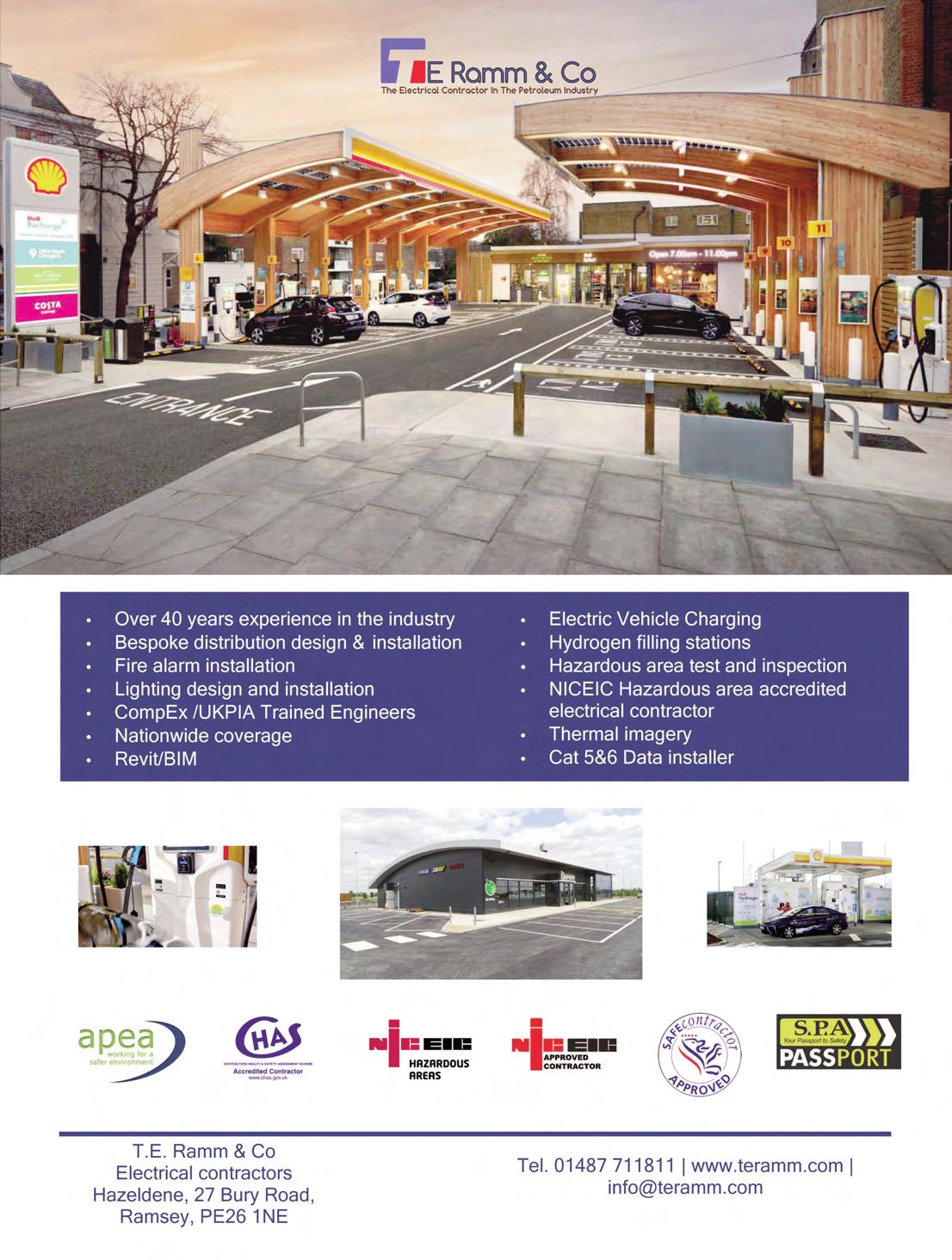
New Members (October - December)
Corporate Membership
Carl Pike Cable Glands UK Ltd
Fergal Walsh Inver Energy Ltd
Paul Howson Fuel ManagementTechnologies SL
Joaquim Muchacha MBFS COMMODITIES,SA
Emma Graves Lynx Construction Limited
Individual Membership Aaron Hinton EconetiQ
Alex Naylor McArdle Doyle
Andy Murray Dundee City Council
Craig Wilcox Ken Wilcox Associates, Inc.
David Kettle McArdle Doyle Ltd
David Price IMF Solutions Ltd
Helen Love Motor Fuels Group
James Hayfield RS Sales & Distribution Ltd.
James Kay Motor Fuel Group
Jonathan Clermont Clermont Electrical E.E & C. Ltd
Neil Robson A J Robson (Electrical) Ltd
Omar Jamali
Paul Wilson Fairburns Group
Rav Kahlar
Richard Leedham Greenergy
Steven Hunt Wiltshire Council
Tom Newton Leicestershire County Council
Retired Membership John Rome Forecourt Consultancy Limited
Publications Information
4th Edition of the Guidance for Design, Construction, Modification, Maintenance and Decommissioning of Filling Stations“Blue Book” (Revised 2018)
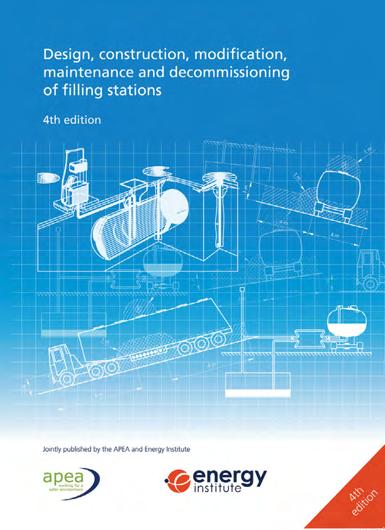
ISBN 978 0 85293 888 1
Price for hard copy
APEA Member rate - £75
Non APEA Member rate - £150
Price for pdf version (please note the pdf version is licensed to the purchaser only and cannot be shared or printed)
APEA Member rate - £75
Non APEA Member rate - pdf £150
If you wish to purchase the guide please go to the APEA website at www.apea.org.uk and click on the “Publications” page. You can select to pay by credit/debit card.
The APEA also publishes the Code of Practice for Ground floor, multi storey and underground car parks. This can be downloaded directly from the APEA website and is available to members at £11.00 and £21.00 to non APEA members.
10APEA tel: 0345 603 5507 www.apea.org.uk
New Members/Publications Information
Electric Vehicle Charging Installations at Filling Stations
Price for hard copy
APEA Member rate - £32.50
Non APEA Member rate - £50
Price for pdf version (please note the pdf version is licensed to the purchaser only and cannot be shared or printed)
APEA Member rate - £32.50
Non APEA Member rate - pdf £50
This Code of Practice is an authoritative guide to all installations of electric vehicle charging equipment. It has been updated in line with recent changes in BS 7671 (IET Wiring Regulations) and reflects some major developments in this area including vehicle to grid, smart integration and inductive charging.
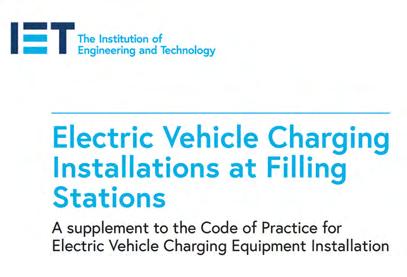
As part of the rapid growth and development of the whole electric vehicle charging infrastructure, filling stations are seen as an obvious place to provide charging facilities. However, it is recognised that difficult safety and logistical issues are linked to such installations.
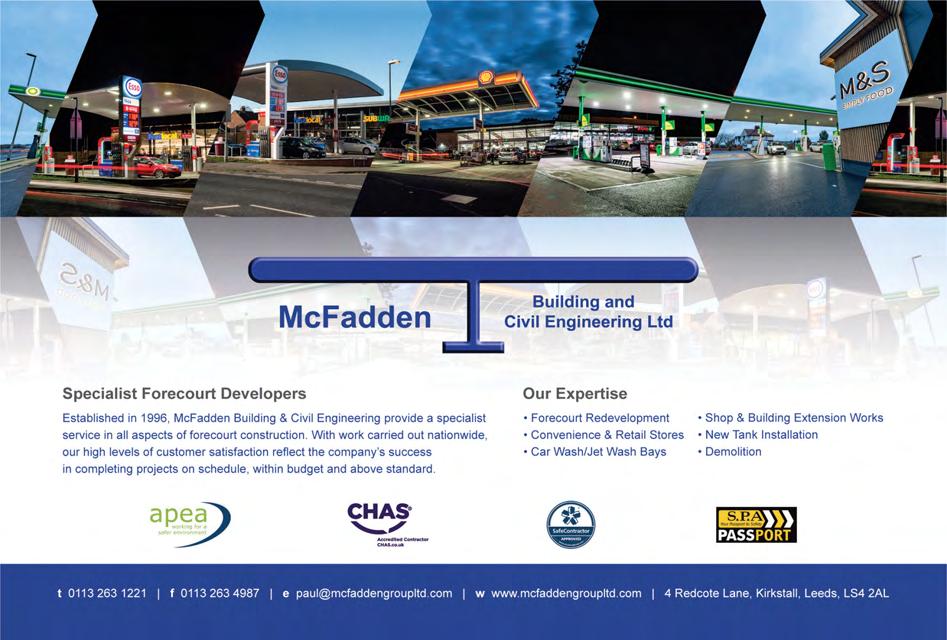
When the 4th Edition of the Code of Practice for Electric Vehicle Charging Equipment Installation was published, significant technical discussions were still underway about this area to help finalise and clarify the safety issues that needed to be addressed. The work behind these meetings was led by APEA (the Association for Petroleum and Explosives Administration) who represent the major stakeholders in this sector. APEA and the IET are therefore now issuing this joint publication to help provide important guidance in this area.
ISBN-13: 978-1-83953-315-0
Publication Year: 2020
Pages: 30
11 APEA tel: 0345 603 5507 www.apea.org.uk Publications Information
About The Bulletin and how you can submit copy to be included
•The Bulletin is published four times a year with a print run of 2200
•Free issue to APEA members (approx 1200 members worldwide)
•Has international distribution and readership
•Respected source of industry specific news and information
•Contains relevant articles, news items, press releases and reports from UK and overseas
•Individual, Fellow and Retired members receive one copy each and Corporate members receive 5 copies each per quarter
The editor of The Bulletin, Brian Humm, is always on the look out for new material, so if you have something you want to be included, please email it to the APEA office at admin@apea.org.uk and it will be forwarded to Brian for approval.
Please email the text in Word format and any images as separate high resolution pdf or jpeg files to admin@apea.org.uk.
We are always pleased to receive contributions from our members and it ensures that The Bulletin remains an interesting and informative read.
Priority is given for press releases and articles submitted by Bulletin advertisers to be included.
Deadline dates for copy and advertising artwork 2023/2024
Please note the deadline date for the March 2024 issue is early due to Christmas and New Year holidays.
Bulletin Advertising
If you would like to book advertising in The Bulletin, please email your requirements to admin@apea.org.uk or call the office on 0345 603 5507. Please ensure you send your artwork to admin@apea.org.uk.
Priority is given for press releases and articles submitted by Bulletin advertisers to be included.
Discounts are available for booking in more than one issue, please contact Jane Mardell at admin@apea.org.uk for more information. Bulletin advertisers that book in 3 or more issues in one year also receive a 50% discount off rates for advertising in the annual Yearbook, see table below.
12APEA tel: 0345 603 5507 www.apea.org.uk Publications Information Size of advert (all rates exclude VAT) Advert fee in 1 issue Advert fee in 4 issues (includes 25% disc
page (210mmw x 280mmh with 10mm border or with 3mm bleed) £498.00 £1494.00
page (185mmw x 125mmh) £249.00 £747.00
Full
½
120mmh) £125.00 £375.00
¼ page (90mmw x
Issue Copy deadline date Posting date June 2023 27th March 5th May Sept 2023 3rd July 11th August Dec 2023 25th September 3rd November March 2024 8th January 16th February
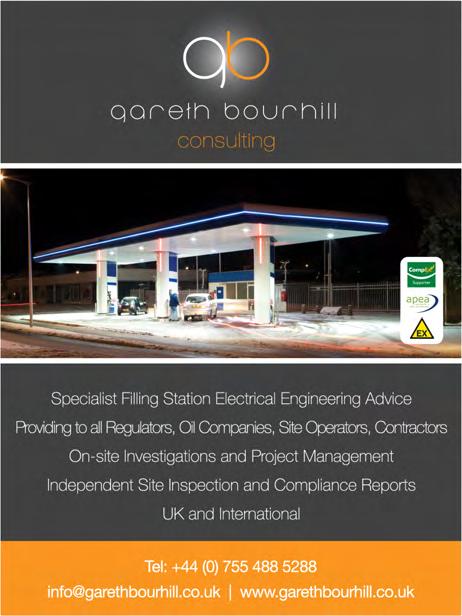

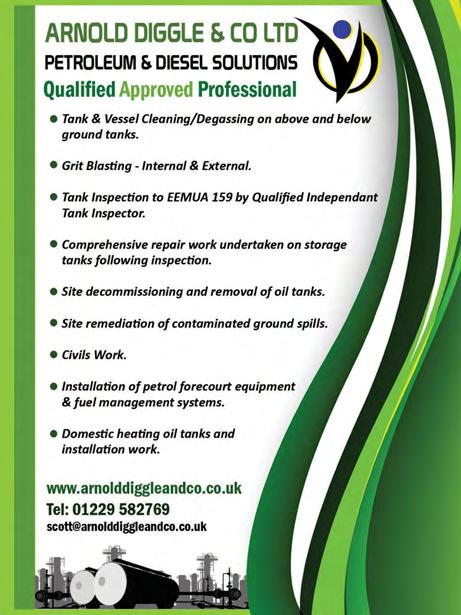

2024 APEA Yearbook
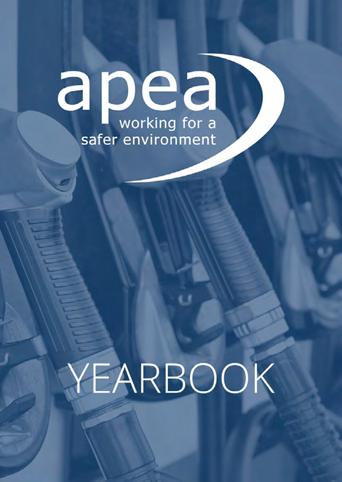
How to complete your free entry Deadline 1st
April
By Jane Mardell, APEA Business Manager
In order to ensure that your details are included in the 2024 Yearbook and on the APEA website in the ‘Contacts’ section it is essential that you complete your online entry by 1st April. Even if you do not wish to advertise in the Yearbook, to have your contact details and industry sector information included you should complete your entry as detailed below.
Please note I will be contacting enforcing authorities separately to update these details. If you are from an authority please do not complete the instructions below.
1.To start your entry go the APEA website home page at www.apea.org.uk
2. Log on to your membership record and go to ‘My Account’ and then click on ‘Yearbook’ on the left hand side. If you have never completed an entry you will see figure 1 (see opposite page). If you completed an entry for the 2023 you will see figure 2 (see opposite page) which you amend.
3. Create or update your contact details and select the Industry Sector or Industry Sectors that you wish to be listed under.
4. When completed you will see figure 3 (see opposite page) and receive a confirmation email. If you do not receive the email the entry has not been completed.
Each member is entitled to one FREE entry in the Petroleum Company Contacts section and one FREE Industry Sector per entry in the Yearbook, (see images above).
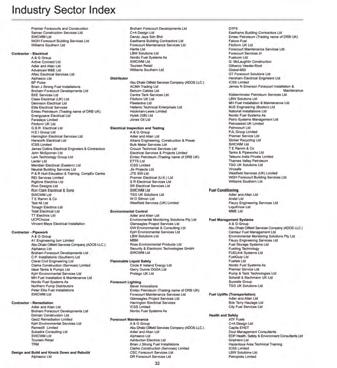
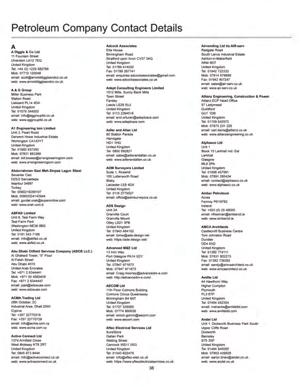
Additional Industry Sectors and Trade names are charged at £30 each. Your invoice and receipt will be emailed to you once your entry is complete and uploaded to your account on the website.
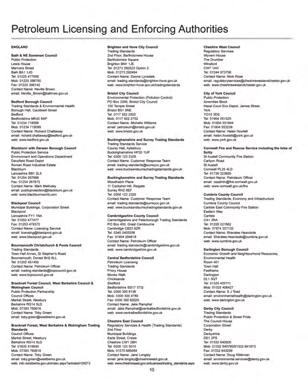
14APEA tel: 0345 603 5507 www.apea.org.uk 2024 Yearbook
What you will see when you go to ‘My Account’
For members that have never created a Yearbook entry the website will display the information, right, when you click on ‘Yearbook’

For members that have created an entry for the previous issue,, the website will display the information, right, when you click on ‘Yearbook’
Once the entry is complete you will see this page and you will received a confirmation email


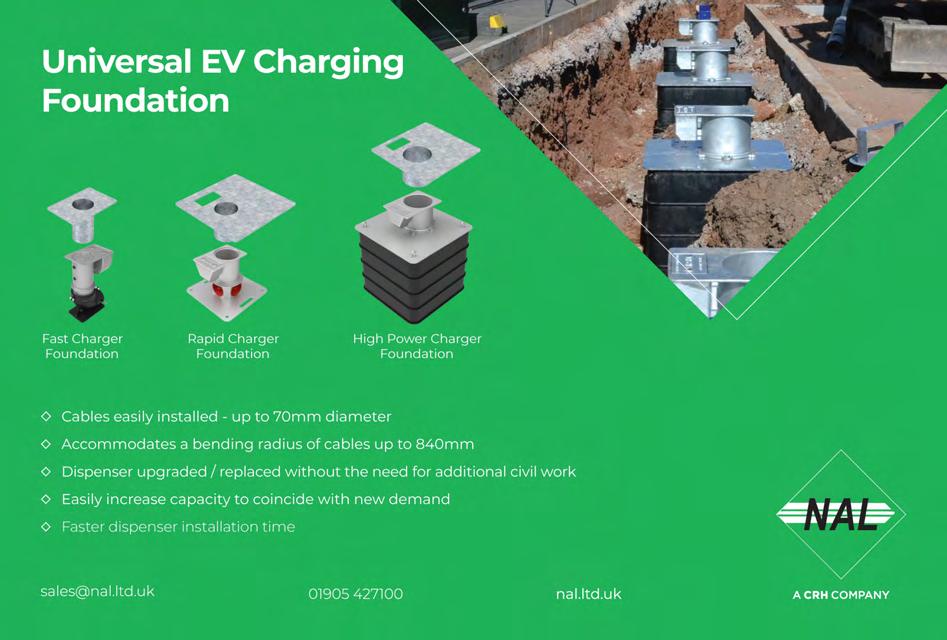
15 APEA tel: 0345 603 5507 www.apea.org.uk 2024 Yearbook
Figure 2.
Figure 1.
Figure 3.
Articles
APEA AGM - 17th November 2022

 By Jane Mardell, APEA Business Manager
By Jane Mardell, APEA Business Manager
The APEA AGM was held during APEA Live 2022 at Stadium MK, Milton Keynes. A report from the event is on page 18.

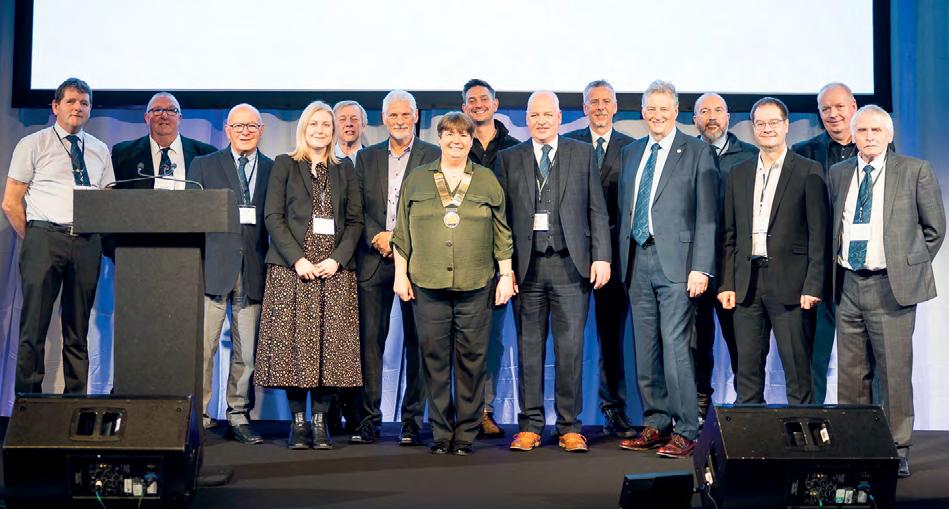
The minutes are available to view and download to APEA members on the APEA website at https://apea.org.uk/agm/
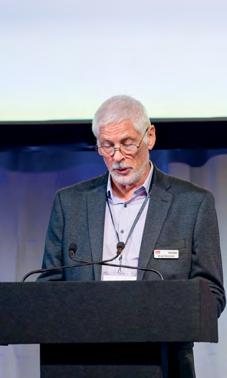
16APEA tel: 0345 603 5507 www.apea.org.uk Articles
Gareth Bourhill presenting the Treasurer’s report at the AGM
Andy Kennedy presenting the Honorary Secretary report at the AGM
Brian Humm presenting the Editor’s report at the AGM
Doreen Pooley APEA Chairman presenting the Chairman’s report at the AGM
APEA Council Members
A vote was held for the council member positions and the officers appointed below. There were 128 votes received from members. D Pooley said that Daniel Thompson was unsuccessful this year but would encourage more people to be nominated to council. For the
2023 AGM nominees will be able to submit information as to why they should be nominated to council and this will go to all members. The officers below were appointed.
PostPersonProposerSeconder
ChairDoreen PooleyChris RamshawDavid Sommers
Vice ChairBrian HummJamie ThompsonAndy Kennedy
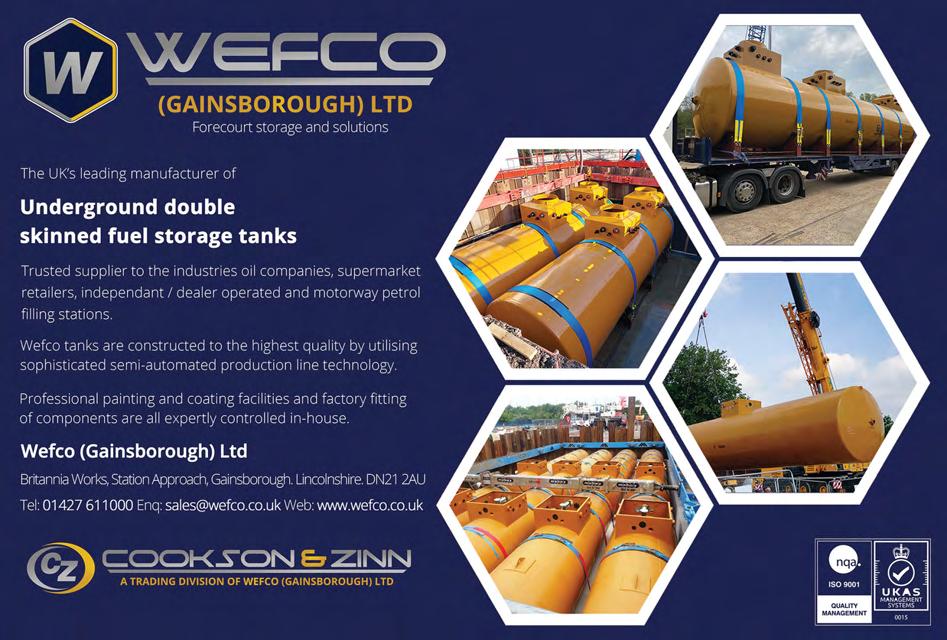
Honorary SecretaryAndy KennedyGareth BourhillBrian Humm
TreasurersGareth BourhillMark RobbinsMatthew Swanerel
EditorBrian HummJamie ThompsonAndy Kennedy
Council MemberKillian TallonThomas DalyDoreen Pooley
Council MemberAnton MartiniussenJamie ThompsonGareth Bourhill
Council MemberClare ScawthornDaniel ThompsonBarrie May
Council MemberJamie ThompsonThomas DalyBrian Humm
Immediate Past ChairmanThomas Daly
17 APEA tel: 0345 603 5507 www.apea.org.uk Articles
APEA Live - 17th November 2022
By Andy Kennedy, APEA Honorary Secretary
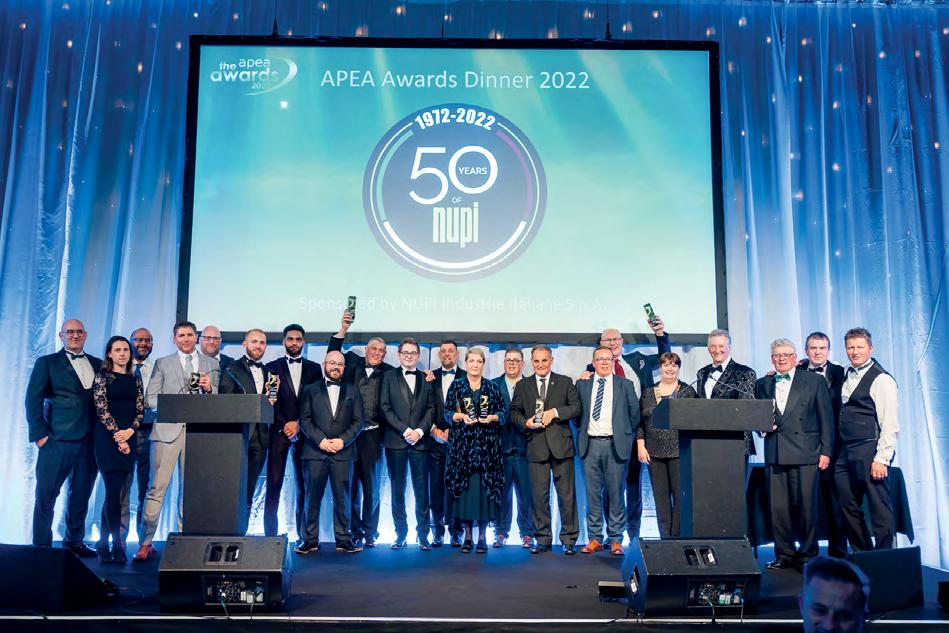
What an APEA Live event we have had this year! Walking around the Elaflex sponsored sold-out exhibition, it seemed busier than ever. A diverse variety of products on show saw something for everyone; an excellent mix, providing visitors with a broad range of products and considerable innovation to explore. Speaking to the suppliers, they were very happy with footfall, citing many great contacts being established. This is now the best event on the UK calendar for suppliers to show their latest products for the forecourt.
Conference
This year, Financial Times’ Motoring Correspondent, Peter Campbell, was invited back to host the conference, sponsored by Elaflex. His detailed understanding of all aspects of motoring and fuel politics and ability to make panellists feel at ease made Peter an inspired choice to steer the conference through the topics of the day.
The Regulators’ Update was led by Jamie Thompson who discussed the UK drive for zero emissions. With a ban on petrol and diesel vehicles from 2035 the UK has said they will cut 50% of vehicle emissions by 2030. As well as E.V. the European Committee for Standardization CEN are working on regulations for multi-fuel vehicle fuels such as Hybrid Electric Vehicles (HEV) and Petrol Electric Vehicles (PEV) expecting hydrocarbon fuels to be around for a long time yet.
This was followed by William Knatchbull (Petroleum & Alternative Fuels Group Manager, London Fire Brigade), who advised on the main tasks currently being reviewed. Dylan Kavanagh (Vice President, Olive Group) then discussed their Olive Media online training platform, with 8 training modules currently available; all PELG approved and very well received by the regulator communities.
The final speaker of the morning was Gordon Balmer (Executive Director, PRA). Gordon discussed the main aims of the PRA, which centred on effective representation, help, advice and keeping them informed. He also highlighted the association’s provision of technical advice, primary authority partnership, a helpline for legal matters and website.
After lunch an informative panel session was held on ‘The low
18APEA tel: 0345 603 5507 www.apea.org.uk Articles
This report is reproduced from the APEA Live 2022 magazine that was posted to members in December. and can also be viewed on the APEA website - go to www.apea.org.uk and click on the link under ‘APEA Live 2022’ in the ‘Events’ section.
Photographs from the event can be viewed at the link below. https://app.photobucket.com/u/APEALive
carbon liquid fuels of the future’ with speakers Vicky Edmunds (Deputy Director, Department for Transport), Chris Gould (Energy Transition Lead, UKPIA) and, Robin Futcher (Director-Hydrogen, Commercial Fuels Solutions Ltd).
Discussed were the current low carbon strategies being considered, where the current D.O.T. focus is E.V. batteries for passenger vehicles and looking at other options to support larger vehicles. There is expected to be a medium-term requirement for liquid fuels for passenger vehicles up to 2050, with HGVs requiring a little longer. It is predicted a future uptake of hydrogen for vehicles in other countries. In contrast the reluctance currently in the UK makes it difficult to say if hydrogen use will grow in this way.
The day’s final session saw a fascinating panel debate on how forecourt owners and suppliers can navigate ‘Future proofing forecourt architecture, design and technology’ within the context of huge change to the future fuel mix. Alan McCarthy-Wyper (Chief Operating Officer GRIDSERVE), Nick Bywater (Associate Director – Retail Investment and Valuation, Christie & Co) and Robert Onion (Owner and Chairman, Circle) offered excellent insights and practical solutions that forecourt retailers can implement now to maximise the future potential of their business over the coming years.
Fuel for Thought Theatre
This year, a brand new additional CPD theatre, sponsored by PFS Fueltec, was made available for visitors to listen to presentations from suppliers of safety equipment and services.
Fergus Heading (Senior Business Development Manager, Dover Fueling Solutions) opened the programme with a talk on the importance of good wetstock management; ‘Why is Fuel System Optimization so Important?’

Maja Nedic (European Sales Manager, NUPI) then explained how the company assured the quality of their pipework. The training required for fitters and the barcode system on pipe and fittings.
Kevin Powell (Managing Director, Ledbury Welding & Engineering) gave a presentation on the above ground modular fuelling station which cuts down on high decommissioning costs compared to below ground installations.
Jeff Reynolds (Chief Technical Officer, Envevo Ltd) asked, ‘Is your forecourt viable for EV charging?’ Envevo highlighted what the main issues and learnings are for installing EV infrastructure on a forecourt.
Chris Rimell (Business Development Manager – EVI, NAL) spoke on Traditional v Modular Cabinet Base Systems. Chris examined the benefits and shortcomings of both options.
Alex Boudry (General Manager, PFS Fueltec) covered a technical overview of ‘Class 1’ leak detection within tanks and pipework, plus the various classes of leak detection according to the European Standard.
Graeme Warnell (Director, GW Environmental & Consulting) addressed problems starting to occur in the race to electrify our transport system. The problems of fires in lithium iron-batteries (known as thermal runaway) and the challenges Fire Brigades face to extinguish these fires.
19 APEA tel: 0345 603 5507 www.apea.org.uk Articles
Articles
Pre-Dinner Awards Drinks and Awards Dinner
As night fell, the Pre-Awards Dinner Drinks, sponsored by Dover Fueling Solutions, before the Awards dinner, sponsored by Nupi Industrie Italiane S.p.a., saw an incredible 630 guests attend. APEA Chairman Doreen Pooley welcomed guests and introduced our charity for the night, Mates in Mind, who, after a very moving video, benefited from the extraordinary generosity of dinner guests’ donations.
The total collected for the charity this year was £3,795.00.
The Awards Dinner delighted guests with the quality of food supplied by Stadium MK and entertainment from superstar Canadian comedian, Katherine Ryan. Katherine was a humorous master of ceremonies, keeping the audience entertained whilst
respectfully and expertly delivering the award presentations. The evening’s awards were hotly contested and well-received, and there was universal delight regarding the Lifetime Achievement Award going to Gerry Risbridger. Well done to all winners and finalists, as always, a fine submission for the leaders in our industry.
APEA Live 2022 was a fantastic success and a great day that showcased the industry at its best. Thanks to Alex Boudry and his APEA events team, working closely with Tom Treverton and his F2F colleagues. APEA live 2023 planning has already begun, hope to see you there!
For information on APEA Live 2023 please contact Tom Treverton at Tom@fivesensesmedia.co.uk
Montpellier Port Replace Corroding Metal Pipes with KPS Corrosion-Resistant HDPE Piping to Prevent Fuel Permeation
By Oscar Garcia, KPS Piping
The managing authority of Séte Port in the south of France chose KPS HDPE conductive pipe to replace their previously installed steel pipe system for their fuelling network. A replacement was needed to prevent the steel pipes from corroding and fuel permeation into the environment, which would damage wildlife and be costly to clean up.
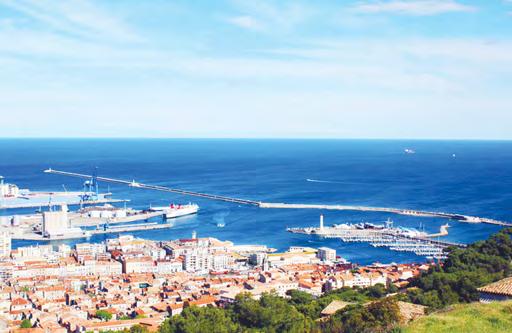
Problem
Séte Port began work on their fuelling network to replace their previously installed steel piping system. Over time, the proximity of the pipes to the salty sea environment had caused them to become rusty and corrode, which posed a risk of fuel permeation and leaks into the environment, which is especially important to avoid in ports and marinas due to the volume of fuel being used and the proximity to the sea/ocean.
Key features of KPS piping for this project:
•Completely un-reactive to saltwater, eliminating the risk of deterioration/corrosion from constant exposure.
•Conductive KPS piping is electrostatically safe, preventing potential static build-up and ensuring safe grounding in the event of sparks.
•Engineered for quick and easy installation, KPS double wall electrofusion fittings are compact and weld both pipe walls simultaneously.
•KPS 4” piping allows a flow rate of 933 litre/minute enabling fast fuel delivery.
•On-site training is available to familiarise installers with KPS easy install piping and electrofusion welding system.
KPS piping is engineered for quick and easy installation. KPS double wall electrofusion fittings weld both pipe walls simultaneously. All of this, along with the professional training program with which KPS certifies each installer, makes KPS an ideal choice for port, marina, and harbour projects.
Results
Séte Port now has a reliable zero permeation piping system which will continue to perform for years to come.
For more technical case studies, visit: www.kpspiping.com/PortsandHarbours
20APEA tel: 0345 603 5507 www.apea.org.uk
A long-term replacement for corroded steel pipes at Séte Port, Montpellier was required
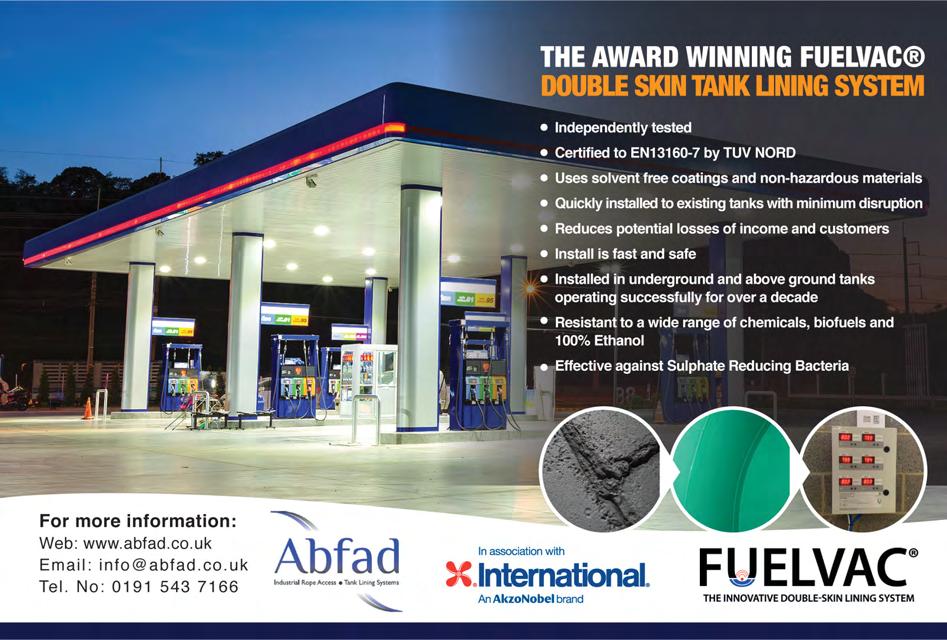

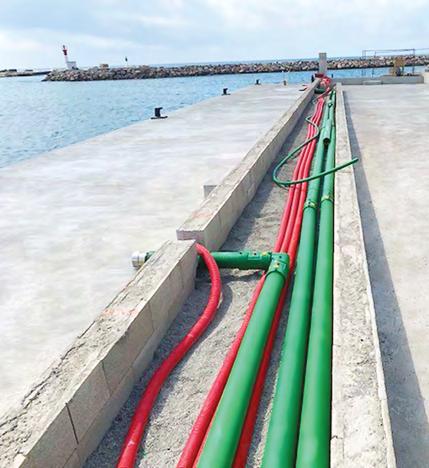
21 APEA tel: 0345 603 5507 www.apea.org.uk Articles
KPS 4” double wall pipe (125/110mm) provides a 933 litre/min flow rateKPS double wall piping adds an extra layer of security
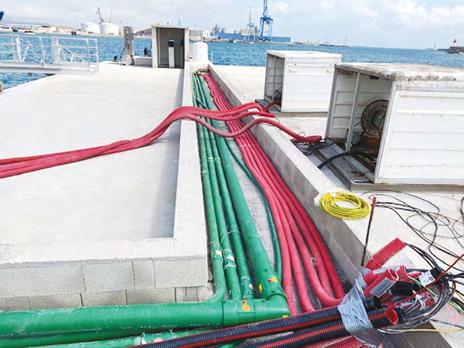

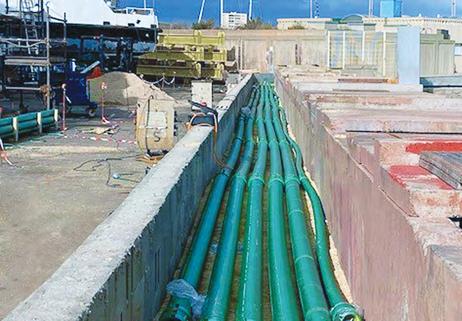

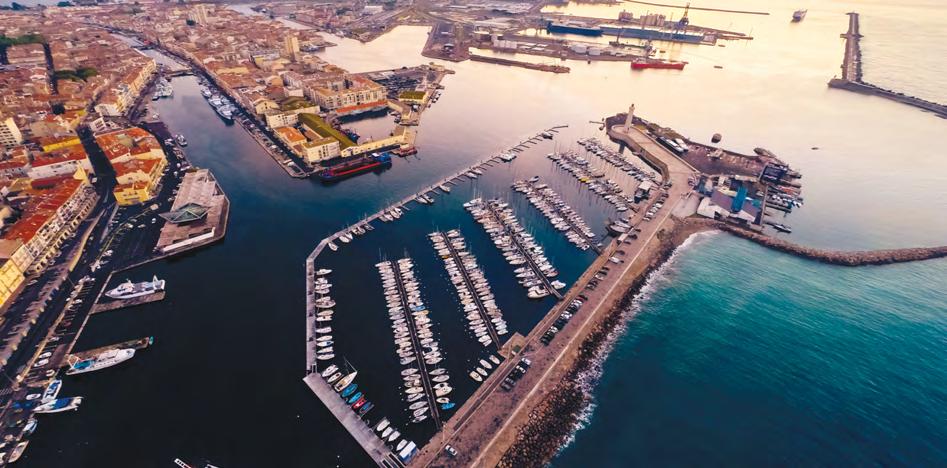
22APEA tel: 0345 603 5507 www.apea.org.uk Articles
KPS 4” double wall 90° pipe elbows are a compact solution for projects where space is tight
KPS piping includes an EVOH permeation barrier and a conductive layer of carbon black
KPS double wall pipework includes an interstitial space between the inner and outer pipes, providing an extra layer of security
KPS piping is designed for fast, simple installation
KPS piping has provided Séte Port with a long-term replacement for their previously installed corroded steel pipework
APIApipe™ Bunded Pipework System from Fuel Storage Solutions for Safe Storage and Use of Liquid Fuel
By Vince McCarry, Operations Director, Fuel Storage Solutions Ltd
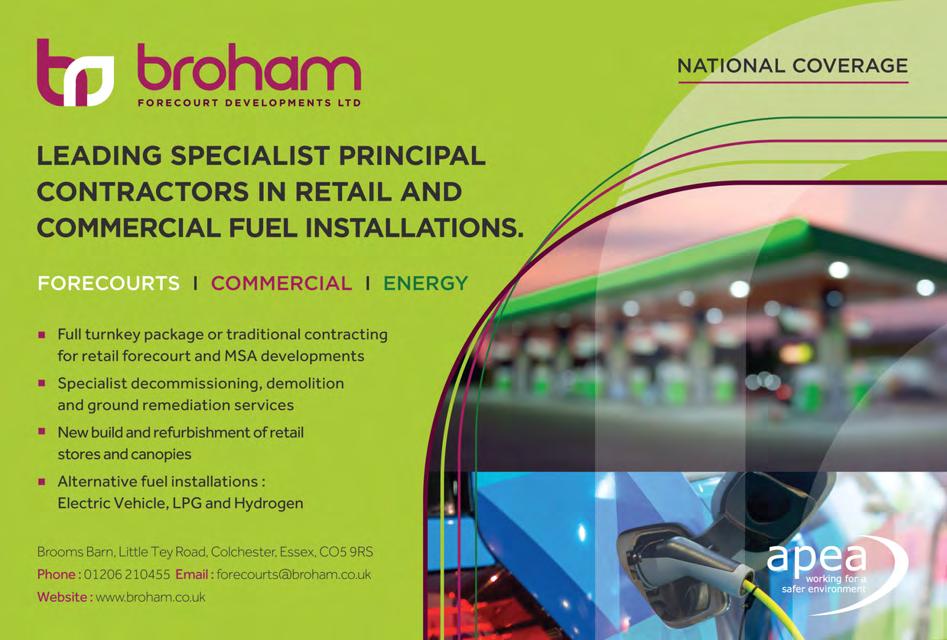
When efficiency demands 100% uptime from your Pipework the solution is the Innovative APIApipe™ system brought to market and patented by Fuel Storage Solutions (FSS).
The company’s unique ‘pipe in a pipe’ (APIApipe™) system is approved for use by Government agencies and specified for use by consultancies advising Blue Chip companies. This fully bunded ‘fit and forget’ pipework engineering system is the safest, most robust and cost-effective system currently available on today’s market.
The Problem
The catalyst for the company’s development of the APIApipe™ system was an approach in 2015 to quote for a fuel pipework at a site opposite St Paul’s Cathedral run by one of the UK’s largest banks. It was needed to feed a standby generator. Due to the fire and environmental risks associated with pumping fuel the project consultant requested steel pipe in pipe (bunded pipe) for the installation.
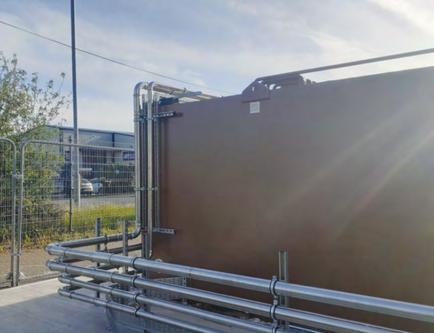
23 APEA tel: 0345 603 5507 www.apea.org.uk Articles
The only option available was onsite fabrication (welding). The pipe had to take fuel up 11 floors. Hot works meant the existing system would have to be drained of all fuel, de-gassed, temporary tanks and all works done out of hours due to the noise and fume disruption.

Developing an alternative approach
FSS knew that a pressed system (Geberit) had been available for a number of years; rather than welding the joints together they are crimped together by powerful hand tools to form a seal. Think 50p coin.
FSS approached Geberit UK who were keen to collaborate. Working together significant technical issues were eventually overcome. FSS were helped considerably by the fact that the Geberit pipe they chose as a base product has a global business with a worldwide turnover of £2.8B in 2020.


The system was developed so that the majority of the installation would be done with standard, off the shelf items but the terminations, T’s and elbows made by FSS. Geberit endorsed the solution proposed by FSS and it went ahead at the St. Paul’s site.
The Solution
APIApipe™ with Bunded Isolation Valve
The Initial estimates for the welded option at the client
24APEA tel: 0345 603 5507 www.apea.org.uk Articles
APIApipe™ Valve
APIApipe™ installation
APIApipe™ stainless steel pipework at a customer installation
site were £600,000. FSS completed the work for £80,000 and went on to patent the system.
FSS used the integrally bunded stainless steel pipework to complete the full install. No hot works were necessary, all pipework is now on 24/7 leak detection. Bottom outlet tank isolation valves are fully bunded and on 24/7 leak detection. The crimp system is simple to modify allowing for future expansion. At a fraction of the cost of traditional welded steel the cost savings are there to be seen, the potential hazard of hot works is completely removed. Fire risk is removed by the exclusion of plastic pipe.
• Unique patented engineering solution that keeps sites supplied with fuel in emergencies

• An exciting new innovation using Geberit Mapress Pipe
• Bunded (Pipe in Pipe) 316 Stainless Steel pipework
• Bunded quarter turn isolation valve
• 10 year warranty includes on-site fixes from FSS proficient maintenance teams
• Capable of being under 24/7 leak detection for both inner and outer pipes
• Leak detection connects to BMS to alert instantly, can shut down the line in the event of a leak so only the lines contents are lost
• Suitable for just about any liquid or gas, over 3,000 gases, liquids and chemicals approved
• Designed for Critical Sites & applications that cannot have a line fail
• No hot works during fast installation
Companies and Industries now benefitting from APIApipe™
The bunded APIApipe™ system is suitable for use by any business that stores or uses fuels, liquids or gases that need to be transported through a pipeline; those that use products that cannot be allowed to escape into the environment or where supply is critical and cannot fail. Since its design and development FSS has installed 50K metres of APIApipe™ for 30 different clients including:
• Facilities Management companies – MITIE & CBRE
• All High Street Banks Data Centres bar one
• NHS Hospitals
• Centrica
• Telecommunications Data storage centres
• Unmanned remote installations
With uncertainty clouding the future consistent supply of fuel and energy to the UK and with the National Grid under increasing pressure, emergency backup power provided by generators is becoming critical. APIApipe™ systems designed and installed by FSS will play a major part in providing alternative failsafe means of operation that also prevents operational downtime.
Consultant engineers are now beginning to specify APIApipe™ for new installations after reviewing all products available in the market. Want to know more? Fuel Storage Solution’s Vince McCarry is the expert. Call him on 01274 813 003. https://www.fuelstoragesolutions.co.uk/
25 APEA tel: 0345 603 5507 www.apea.org.uk Articles
Is Your Asset Maintenance Approach Providing True Value in the Real World?
By Philip Reese, Evenlode Roadside
No matter how cutting-edge your on-site installations are, every organisation needs a carefully thought through balance of cyclical maintenance, planned compliance and servicing activity and oncall provision to deal with the effects of everyday interaction on your assets.

Evenlode Roadside is publishing a series of articles and insights on their website, looking into a number of considerations for achieving best value, improved uptime and importantly customer satisfaction. This will be based on multiple decades of experience of delivering and managing maintenance and facilities management for some of the world’s biggest forecourt and retail operators. We have also worked extensively for multi-site estates across other sectors too.
The articles include examples of where we have provided resource effective approaches to:
-Provide flexible outsourced expertise
-Derive value from benchmarking – how useful is benchmarking against your competitors?
-Achieve cost certainty, reliable forecasting and sustainable savings
-Unlock the value of your data; understanding the info, is the data sufficient, and how can it support investment strategies?
-Identify reductions in energy use (& spend)
-Ensure your suppliers deliver service levels that match end user expectations
-Determine your investment strategy for your aging assets as we transition to clean energy
-Work order management – are your suppliers delivering consistently?
-Establishing a “source of truth” to demonstrate compliance and task validation
-Manage remedial actions through to completion
-Contract terms – do they really work in your best interests?
Please check out the Evenlode Roadside website for these articles and look out for the insights on these and other important topics.
To get in touch please visit www.evenloderoadside.com to find to more about how their deep facilities management experience can benefit you.

Fuel Retailers are Feeling the Pinch
By Cheryl Ashton, Marketing Coordinator, TSG
Pump prices have been soaring over recent months amid an international oil price surge that was instigated by the recovery in global demand after the pandemic and exacerbated by the situation in Ukraine. With the chronic rise in fuel prices contributing significantly to the current cost of living crisis, it is little wonder that the criminal community has made its presence felt through an increase in fuel thefts and card fraud, at the expense of innocent forecourt owners and their customers.
For many years, fuel stations have had to contend with countless instances of petty theft from their convenience stores, but more recently, a major upswing in motorists driving off without paying is crushing retailers’ profit margins right across the UK.
Furthermore, outdoor payment terminals, cash machines and pin pads have become attractive targets for card skimmers intending to collect and exploit customers’ card data, potentially impacting the reputation and integrity of site owners.
Now, more than ever before, there is a greater need for forecourt retailers to remain vigilant, to help protect their business and guard against fuel and data theft.
26APEA tel: 0345 603 5507 www.apea.org.uk Articles
Pay at Pump credit card redownload
This article examines both of these insidious criminal activities in more detail and provides useful tips on how to avoid becoming the next victim.
Card skimming
Card skimming is the theft of credit and debit card data and personal identification numbers (PIN) when the user is at an automated teller machine (ATM) or point of sale (POS).
Card skimming allows thieves to steal money from accounts, make purchases and sell card information to unscrupulous third parties. Generally, the scam involves modified payment card reader hardware that fits over an existing genuine payment device or ATM. The bogus reader collects and passes on payment card information to the thief. Moreover, PINs may be captured using a hidden camera that records the user punching in their number, or through a keypad overlay that stores the keystrokes.
Prevention is the best policy
To safeguard payment devices against fraudsters, it is important to check the equipment regularly to look for skimming devices, especially if the site isn’t protected by an effective deterrent, such as surveillance cameras.
To provide a visual comparison for future checks, it is a good idea to take a photo of the terminal on installation or once satisfied that it is free from skimming devices.
Skimming devices can be quite difficult to spot, as they have been
purposely designed to resemble regular card readers and may even be fitted over the whole device.
What to look for:
•Is the card reader in alignment with the panel underneath it?
•Is the card reader firm or does it feel slightly loose?
•Look inside the card reader for a thin plastic circuit board.
•Is any part of it crooked or damaged?
•Are the graphics aligned and does the colour look correct?
•Are there any cables that look out of place?

•Is there any damage to the touchscreen?
•Are there any new scratches that haven’t been noticed before?
•In some instances mini cameras are installed to collect PIN data - so check for any unusual additions around the facia directly in line with the pin pad.
Carrying out these simple checks on a regular basis can help to prevent card fraud – don’t be a victim!
Drive-offs
Drive-off incidents (often referred to as bilkings) are the biggest scourge facing the fuel retailing industry and they continue to rise at an exponential rate. Whilst some larger fuel networks accept the high probability of incurring drive-off costs, for the thousands of independent forecourts who already make a low margin on selling fuel it’s a much bigger challenge, possibly threatening the viability of some of the smaller operations.
It is always worth reviewing and, if necessary, tightening pump
27 APEA tel: 0345 603 5507 www.apea.org.uk Articles
authorisation procedures, but briefing the staff on what to look for might be more beneficial.
Typical warning signals of a drive-off:
•The driver is still at the wheel and the passenger is filling up;
•Open doors or open boot to hide number plate;
•Number plates obscured or appear altered;
•Lights of the vehicle still switched on;
•Engine still running;
•Vehicle parked facing away from the kiosk towards an exit;
•Customer trying to hide behind their own or another vehicle when filling up;
•Motorcyclists wearing a helmet during refuelling.
Tokheim EYETM Security Solution
These are all valuable clues for retailers to consider, but what can be done to deter fuel thieves from targeting sites in the first place? Closed-circuit television (CCTV) cameras are fast becoming today’s most cost-effective and reliable answer to crime prevention. One such option is the Tokheim EYETM Security Solution from TSG UK. This award-winning closed-circuit television (CCTV) solution was designed specifically for forecourts and has proved to be an excellent deterrent to criminals.
Tokheim EYE is an advanced high-definition (HD) camera surveillance system, activated by the slightest of movements on the forecourt, that is able to capture and store images of a suspected crime. The footage can be easily retrieved and viewed by site owners and authorised personnel, retrospectively or live, on any smart device.
The cameras are interfaced with automatic number plate recognition (ANPR) software and point-of sale-equipment both at the pumps and within the kiosk. This provides a range of valuable information linked to the camera recordings. Real-time and postevent data includes details such as the pump number, receipt, staff member involved, time/date and other useful transaction inputs.
Additionally, operators can make use of the extensive filtering feature, allowing them to refine incidents by type, such as tanker delivery or unauthorised access to dispenser cabinets. With an effective pinch zoom feature, users are also able to quickly isolate and focus on specific elements of the captured frame without losing image quality.
Of course, a surefire way of preventing drive-offs is to retrofit all of the petrol pumps with pre-pay devices, a method which has already been widely adopted in many European countries. However, apart from the immediate financial impact to upgrade the pumps, many retailers are reluctant to implement pre-payment for fear of lost sales of high-profit-margin drinks and snacks from their convenience stores, which is a core part of their business.

To conclude, whilst there is no magic formula to completely eradicate forecourt crime, these small but important steps can help alleviate the problem, safeguarding fuel retailers and their customers.
For more information on TSG UK, its products, services and solutions visit: https://www.tsg-solutions.com/uk/
28APEA tel: 0345 603 5507 www.apea.org.uk Articles
TSG’s DriverControlled Delivery System
By Cheryl Ashton, Marketing Coordinator, TSG
Forecourt fuel deliveries can pose a significant challenge to site staff during peak times, or if the consignment is scheduled to occur outside of normal business hours.
TSG’s driver-controlled delivery system provides advanced, 24hour fuel delivery control to unattended fuelling operations, simplifying fuel management for a wide variety of commercial applications.
Safety First
Supplying fuel to a retail site is a complex task involving risk assessment, compliance with regulations and ultimately the safe and controlled delivery of fuel.
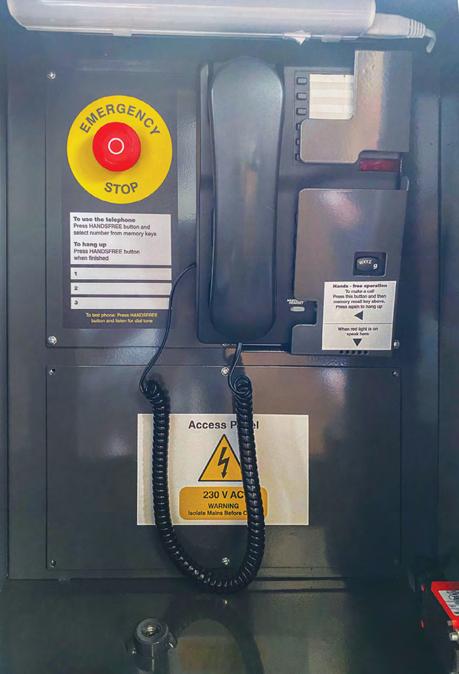
Before the fuel delivery can commence, a number of safety procedures should be followed by the driver, including:
•Checking the proximity of potential hazards when leaving the vehicle

29 APEA tel: 0345 603 5507 www.apea.org.uk Articles
Articles
•Checking for obstructions or leaks
•Confirming the location of the Driver Controlled Delivery (DCD) box
•Checking for site-provided fire extinguisher
Whilst the forecourt owner has no control over the driver’s behaviour or safety checks, it is important to understand his role and his concerns in order to make the delivery as seamless as possible.
Why TSG’s DCD System?
TSG has a totally agnostic approach towards hardware and operating systems, providing the most appropriate solution for each customer and
ensuring their specific operation and strategic objectives are prioritised.
Available with a pedestal or wall-mounting bracket, the installation of a TSG DCD system typically results in a reduction of the site’s fuel delivery costs, as the supplier is able to schedule deliveries 24 hours a day, seven days a week.

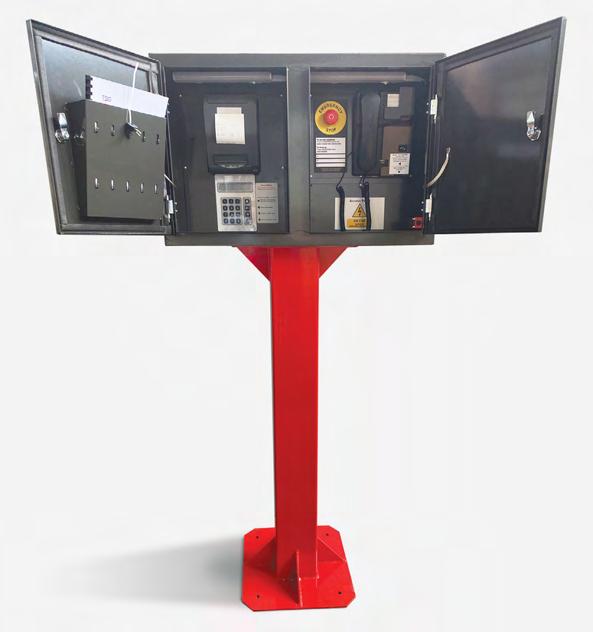
How does it work?
The DCD System works by interacting with the tank gauge at the start of delivery, allowing the tanker driver to ascertain there is enough ullage (space in the tank) to allow the fuel to be delivered safely, without risking overfill. This information is displayed on the DCD’s illuminated screen and can be printed out for added peace of mind. Additionally, a ticket confirming the amount of fuel deposited in each tank is available upon completion of the delivery.
In the rare event of an emergency during the delivery, the DCD incorporates an emergency stop switch and telephone, allowing the driver to safely halt the fuel transfer and contact a nominated member of the site team. Furthermore, during the hours of darkness, a floodlight circuit may be activated to illuminate the equipment and surrounding area, providing clear visibility to the tanker driver.
For more information on TSG UK and its solutions and services, visit: https://www.tsg-solutions.com/uk/
30APEA tel: 0345 603 5507 www.apea.org.uk
Why Ad-Blue is Not Green
By Paul Stapleton, Director Geo2
Ad Blue has been regarded in the past as a ‘green’ product. Investigations by Geo2 as part of a forecourt redevelopment suggested otherwise.
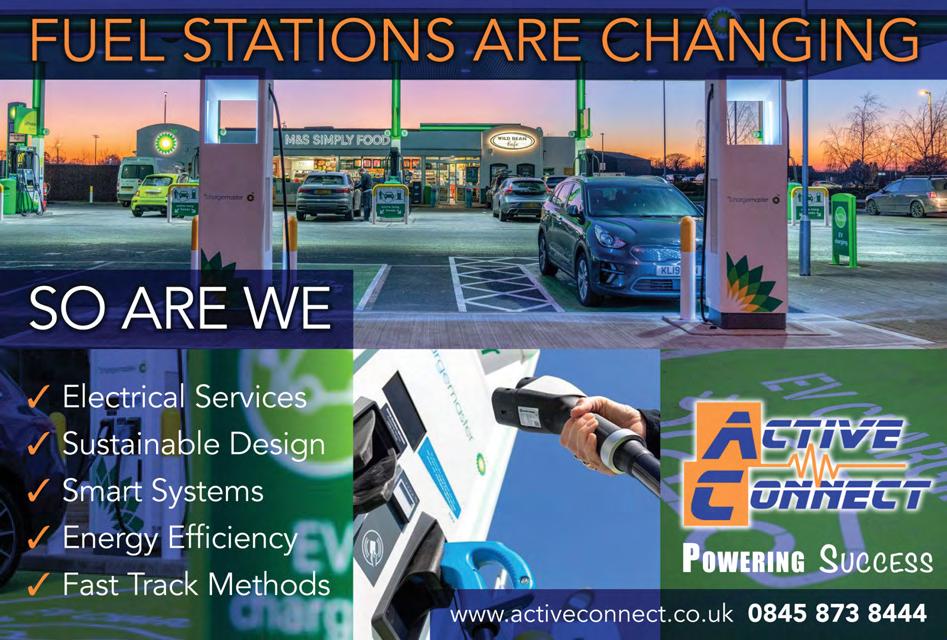
A major UK fuel producer and retailer commissioned Geo2, a land remediation specialist, to manage environmental matters during the redevelopment and expansion of one of their flagship sites, including a full knockdown and rebuild, replacement of all tanks and underground infrastructure, and a doubling of the site’s footprint through the addition of a new HGV forecourt area.
During underground tank removal, strong ammonia odours were coming from the ground. The odours were so strong that the contractor could not safely work, especially as the source of the release, and the nature of the contaminant, was unclear.
The situation was very serious for the client:
•The site had an unknown contaminant, with a business adjoining the site which may be impacted by vapour, and watercourses on two sides of the property which included protected species
•The contractor on site could not proceed with the development until the source and type of contaminant were established so that
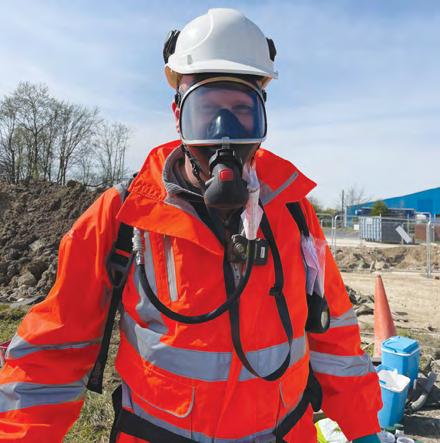
31 APEA tel: 0345 603 5507 www.apea.org.uk Articles
PPE and breathing apparatus used by Geo2 engineers during delineation trial pitting works. With personal ‘ammonia in air’ monitors
appropriate H&S measures could be put in place
•The contamination needed to be managed in line with environmental responsibilities, UK law and redevelopment planning conditions

•The delays with redevelopment were causing significant knock-on impacts for the programme, increasing contractor costs and delaying the opening of the store, with commercial consequences

Investigations by Geo2 concluded that the source was likely to be Ad-Blue, a diesel supplement used in HGVs and other diesel vehicles to reduce emissions. The product is based on industrial urea, breaking down into ammonia. Investigation by the client discovered that there had been an incident with an Ad-Blue above-ground tank, underground line and pump fitted at the HGV filling area, prior to the redevelopment. It appeared likely that the losses associated with this leak had been vastly underestimated by the third-party operator of the system at the time.
To confirm the source, Geo2 undertook soil and water sampling using full respiratory equipment. Samples were submitted for a range of contaminants, including urea. Urea sampling is not a common test, so specialist laboratories had to be found for these works, although the turn-around time for the specialist analysis was protracted. This confirmed the source to be urea, and its breakdown products. Contamination was noted around the HGV filling area
(the likely source area) but also in water and sediments in an adjacent watercourse. The ground at the site consists of a stiff clay, with little groundwater, and flooded during heavy rain. Soils between the source and the watercourse were unimpacted, so it was considered that the likely transmission route was via high-permeability pathways during heavy rainfall events, such as pea-gravel beds, located around drainage services, which ran to an interceptor, that discharged to the watercourse.
Investigation by Geo2 could find no record of a similar significant Ad-Blue release. There was no UK precedent, so rapid action on determining safe site-specific target values was required, establishing a remediation working plan and engaging and agreeing the methods with the client, contractor and regulators in order to progress the works safely, quickly, efficiently and legally.
Remediation was undertaken in the source area by mass excavation and disposal. As validation sampling turn-around times for urea were too long to be pragmatic, excavation was undertaken using hand-held vapour meters to field screen material. Careful screening of material was required, as the high organic content meant that significant disposal costs would otherwise be incurred. In addition, works were undertaken in the adjacent watercourse to carefully remove impacted sediments from the sides and base, preventing environmental harm and averting risk to human health.
Final validation of the works was undertaken by a programme of water monitoring in adjacent watercourses, with regulatory sign-off being achieved.
For more information: Susan Fairley, Marketing Manager: susan.fairley@geo2.co.uk https://www.geo2.co.uk/
32APEA tel: 0345 603 5507 www.apea.org.uk Articles
Dye-testing confirmed the interceptor had been incorrectly draining to a drainage ditch on the northern boundary
Watercourse after remediation and redevelopment

Understanding Total Cost of Ownership (TCO)

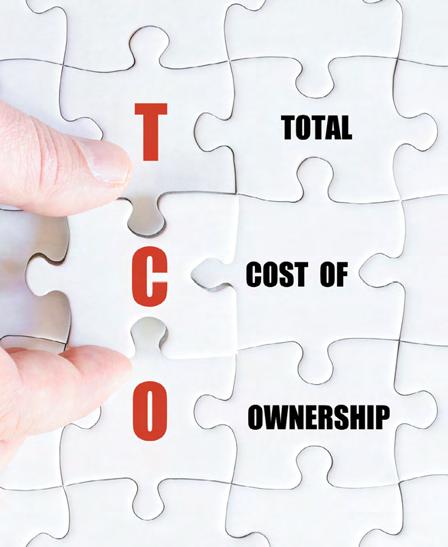
What is TCO?
By Cheryl Ashton, Marketing Coordinator, TSG
The total cost of ownership (TCO) refers to the lifetime cost of an asset. In simple terms, it is the total expenditure attributed to a piece of equipment spanning from purchase to disposal.
Total Cost of Ownership calculation: Purchase Price plus Operational Cost plus Maintenance Charges minus Projected Resale/Residual Value.
TCO should always be taken into consideration by both companies and individuals when making a purchasing decision, especially if there are several alternatives in the frame. Buyers should not focus exclusively on the purchasing price, but also evaluate operational costs and maintenance charges that will be incurred over time. A purchase driven by an attractive price point is often not as economical as it first appears; selecting the option with a lower TCO is more cost-effective in the long run.
Financial statements generated by a company’s accounts team will invariably classify the purchase price of an asset as capital expenditure. This figure will be subject to depreciation over a defined number of years, reducing the company’s net income and therefore its tax liability. Meanwhile, the asset’s running costs, including service and maintenance fees, are generally integrated into the business overheads. This separation of costs can sometimes detract from the overall TCO, but careful analysis will help to reveal all direct, indirect and hidden costs associated with the purchase.
The benefits
•Understanding TCO helps businesses to take a rational approach to longterm planning and will ultimately lead to more informed financial decisions and consequently avoid buyers’ regret.
34APEA tel: 0345 603 5507 www.apea.org.uk Articles
•TCO will also help business owners to make smart money investments to add value to their existing company or develop an expanding enterprise.
•Portfolio Managers use the TCO calculation to determine which assets are most cost-effective for the business. In the same way, it is possible to ascertain if the maintenance costs for a particular asset have escalated to a level that indicates its replacement might be the more sensible option.
•TCO is useful to decision-makers in assisting with a direct comparison between leasing, renting or outright purchase –often dependent upon the frequency of operation and its anticipated useful life.
On the forecourt
The emergence of all-electric vehicles has started to reshape our forecourts from ‘fuel with a shop’ to multi-faceted operations offering a variety of services such as cafés, leisure and shopping, as well as both traditional and alternative fuels. With so many radical changes and challenges to the traditional business model, retailers must adapt swiftly to the new consumer trends and expectations in order to maintain a competitive edge.
All of these factors impose considerable pressure on forecourt owners to expand their facilities to encompass greener and more sustainable energy provision, as we progress to the ideal of carbon neutrality by 2050.
Now, more than ever before, retailers need to keep a close eye on cash flow, whilst maximising the site’s revenue potential. Intelligent
purchasing decisions using the TCO calculation are a must, and choosing the right partner to work with is critical to operational success.
TSG UK is here to help
TSG is the largest service and equipment provider in the industry, with more than 50 years of experience. TSG UK is best known for the installation and maintenance of traditional fossil fuel stations and is now progressing with its customers toward a cleaner future. We provide full turnkey solutions, from site survey, design, construction, project management, civil works, equipment installation and commissioning, backed up by a service and maintenance package. We deliver adaptable solutions for the distribution of several energy sources, supporting energy transition and diversification.
TSG UK supplies equipment with a verifiable low total cost of ownership, ensuring retailers can be confident of making the right investment for their site. Our dispensing equipment offers true modularity and superior quality in every respect, with reliable corrosion protection for longevity and low TCO. Furthermore, the exceptional meter stability eliminates drift and maintains accurate, controlled dispensation of energy. Developed to meet the fuelling demands of the future, our industry-leading dispenser range has been built with field-proven components and requires fewer service interventions; all of which contribute to a record low TCO.
For more information on TSG UK, its products, services and solutions visit: https://www.tsg-solutions.com/uk/
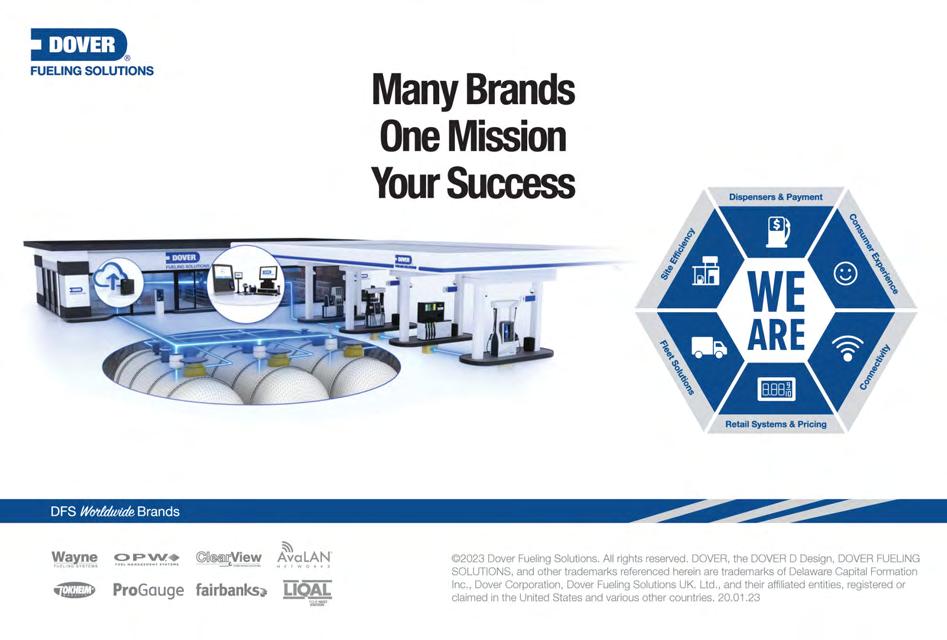
35 APEA tel: 0345 603 5507 www.apea.org.uk Articles
Petroleum Sales Declining: New Fuels Growth
By Nathaniel Fuller, Business Development Manager, Ledbury Welding & Engineering Ltd
LWE believe that the VEHESTA can bridge that gap between the present and the future, in a way which maintains your customers’ need to obtain fuel/energy to power their vehicle, whilst going about their daily life.
Ledbury Welding & Engineering Ltd (LWE) are the leading manufacturer of above ground petrol storage tanks in the UK. The SuperVault is their flagship product, with this vessel providing the storage element of their modular filling stations.
The format of a standard petrol filling station (PFS) has developed significantly over the years. However, in terms of liquid storage, the reliance on below ground tanks to hold the fuel has largely remained the same.
LWE has pioneered the alternative concept of Modular Filling Stations. However, with the road to 2030, LWE felt that this needed rebranding and developing. As a result, they are pleased to introduce the VEHESTA – VEHicle Energy STAtion.
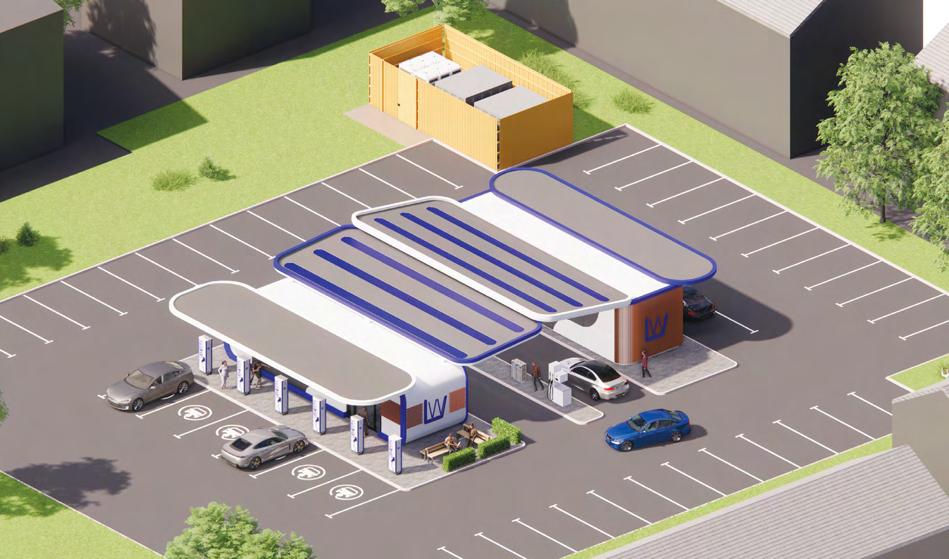
Uncertainty
The reasons for, as well as the principle causes of, climate change can be debated at great length. However, the net effect of the need for action to halt its progress is going to have a dramatic effect on the petroleum industry as we know it. The development of vehicles powered with alternative fuels is a direct result of the UK Government’s policy to ban the sale of new petrol and diesel powered vehicles by 2030. We believe the VEHESTA provides the flexibility to aid the creation of energy stations, which cover the needs of the alternative fuels sector, as well as the development
of new methods of vehicle propulsion. It is essential for the longterm future of our industry, firstly, that we survive these changes, and then continue on to prosper, as the motor industry follows government policy by delivering new production models for the mass market.
VEHESTA for the future
Looking at the future of the industry, are we able to confidently predict that the current blueprint for PFS design will meet the needs of customers in the medium to long term?
Continuing to follow the existing model may result in fixed, inflexible installations, where the cost of change or decommissioning may not be in 30+ years, but in the region of 15 years or even less. Should this be the case, then the solution is a design that not only meets the need of today’s marketplace, but also has the flexibility to change, adapt and incorporate the needs of vehicle propulsion and energy in the future.
Having considered this, the VEHicle Energy STAtion of the future may well change significantly, and there will be a need to provide flexible, adaptable and cost-effective solutions.
The VEHESTA is an above ground solution. Its location can be moved, it remains an asset to the owner and has the flexibility to incorporate whatever changes are needed for the energy station to remain viable. LWE are developing new designs and configurations which will initially cater for large bulk fuel storage, but as volumes gradually decline, this capacity may be adapted to encapsulate alternatives.
36APEA tel: 0345 603 5507 www.apea.org.uk Articles
The principle is a POD design, which can be adapted to cover the need to keep specific separation distances between hazardous zones. These designs also allow the inclusion of a kiosk/shop within the structure but, as always, maintaining the principle of covered multiple fuelling lanes to ensure a pleasant customer experience.
We believe that the VEHESTA can bridge that gap between the present and the future, in a way which maintains your customers’ need to obtain fuel/energy to power their vehicle, whilst going about their daily life. As human beings, we are creatures of habit, so a solution that delivers on both the technical and operational requirements, but also has the flexibility to be that “Go To” place for your vehicle energy may well be the station of the future.
VEHESTA delivers on the following:
•Flexible for future vehicle energy needs, as driven by environmental change.
•Proven design that delivers the requirements for a modern fuelling station.


•The ability to integrate future alternative fuels and technology, cost effectively.
•The alternative solution that maintains asset value through whole life cycle.
•Allows the incorporation of a shop/kiosk, within one of the pods. For further information on the VEHSTA or for above ground fuel storage tanks, contact Ledbury Welding Ltd Tel: 01531 632222
www.lweltd.co.uk.
37 APEA tel: 0345 603 5507 www.apea.org.uk Articles
•
The EV Revolution - Are We Playing with Fire?
By Nick Needs, McLean Events, Conferences & Media Ltd
The intention of this cautionary tale is not to unnerve fuel retailers or to influence the opinion of those looking to invest in an electric vehicle, its purpose is to highlight the need to future-proof our EV infrastructure against degradation and mitigate the risk of fire.
In the October edition of erpecnews, we touched on how the emergence of all-electric vehicles has started to reshape our forecourts from ‘fuel with a shop’ to multi-faceted operations offering both traditional and alternative fuels. But are we jumping the gun? Or is this simply a case of being driven by the global dream of net zero, to such a degree that we are blinded to the potential dangers of EV fires and an inferior supporting infrastructure?
What lies ahead?
The European Union predicts there will be 30 million EVs on the road by 2030, which may seem optimistic, but it is certainly achievable if the market continues to track the current trajectory.
Today, the vast majority of EV infrastructure is comparatively new and consequently, in good working order. However, if we fast forward to the end of the decade, how well will it stand the test of time after prolonged and intense customer use? Moreover, the need to alleviate the substantial expense of charger installations may give rise to low-cost, inferior-quality charging cables infiltrating the marketplace.
Over time, all road-going vehicles will experience wear and tear, probably incur the odd minor knock and almost certainly drive over uneven road surfaces and EVs are no exception. Hitting a pothole impacts a vehicle’s undercarriage and suspension system; and in the case of an EV, it may result in unseen damage to the battery. Furthermore, consumer demand for convenient, fast charging stations places additional strain on the EV battery – weakening its reserve capacity and shortening its life.
Without regular safety checks and maintenance, coupling an ageing EV population with a deteriorating charging network could be a recipe for disaster.
Thermal Runway
A thermal runaway in a battery is a self- destructive chain reaction that cannot be stopped once it has begun. It creates a feedback loop of rising heat and if left undetected it can lead to devastating results, such as fire and explosion.
A Lithium-ion (Li-ion) battery is particularly susceptible to thermal runaway due to its composition. The cathode and anode electrodes are divided by a very thin polythene separator. Should this separator rupture, typically during charging, a short circuit follows which initiates the thermal runaway process. The temperature quickly rises to the melting point of the metallic lithium and causes a violent reaction.
Almost all EVs are powered by Li-ion batteries, making them vulnerable to the alarming possibility of thermal runaway. Thankfully, EV fires are very infrequent, perhaps owing to the immaturity of both EVs and the associated infrastructure.
The Consequences
In this section, we determine the challenges posed by an EV fire that differentiates it from that of an internal combustion engine (ICE) and detail the risk to society and the environment.
Firstly, there is an enormous disparity between the burning temperatures – an EV will burn at circa 1200 degrees Celsius, whilst an ICE generally reaches no more than 600 degrees. During an EV fire, a loud fizzing sound can be heard as the thermal runaway moves through battery cells, often followed by large jets of flame which can extend up to three metres in length. These fire jets can cause untold damage to nearby vehicles, charging infrastructure and property, not to mention the risk to human life.
EV fires produce a significant amount of smoke and soot containing both carbon monoxide and hydrogen cyanide, which are highly toxic potentially fatal. Flame-retardant clothing and protective breathing apparatus are a must when tackling an EV fire, so it is safe to say that the job must always be left to professional firefighters.
Extinguishing the flames
Firefighters have two main options, let the fire burn out or extinguish it. Most would say that the obvious choice is to extinguish the fire, however, many car manufacturers advise a controlled burn, allowing the firefighters to focus on protecting the surrounding area.
Fires involving Li-ion batteries are extremely difficult to extinguish and burn at formidable temperatures for hours on end. Even when the fire has been successfully put out, the problem for the fire brigade is not over. Electric vehicle fires have the tendency to reignite hours, days or even weeks after the initial blaze, and they can do so many times. Not only does this pose a safety issue, but it also poses a legal issue: recovery firms areincreasingly concerned about transporting firedamaged EVs.
Car park charging facilities
There is a growing sense of concern about the dangers and apparent spontaneity of EV fires, especially if they happen in an underground or multi-story car park charging facility. The confined space generates a high concentration of toxic smoke and soot, reducing visibility to less than half a metre and creating a potential death trap for the public trying to flee from the site.
The extreme heat intensity of Li-ion battery fires could cause structural fatigue in basement car parks, undermining the integrity of the concrete pillars where EV charging poles are now being installed. The current sprinkler systems in these facilities will have little to no impact on an EV fire, the Li-ion battery will simply continue to burn until it burns itself out.
High Profile EV Fires
Feliticy Ace
The sinking of the Felicity Ace was a $500 million tragedy that
38APEA tel: 0345 603 5507 www.apea.org.uk Articles
should never have happened. The 656-foot-long carrier ship caught fire, taking 3,828 cars to the bottom of the ocean with enormous consequences for the automotive manufacturers concerned. After the fire broke out in the cargo hold, it spread rapidly and forced all 22 crew members to abandon the ship. The unmanned ship drifted on the Atlantic and continued to burn for over a week before slipping under the waves.
The Felicity Ace had been carrying a large number of fully electric vehicles which are thought to be the cause of the blaze, and are certainly to blame for the fire being very difficult to control.
The cargo ship belonged to Mitsui OSK Lines (MOL), which has already gone on record stating that it won’t transport used EVs anymore. Hybrids are fine, but used battery-powered full-electric vehicles are no longer welcome.
Richard Hammond
In June 2017, former BBC Top Gear presenter, Richard Hammond, was involved in a serious car crash at the Hemberg hill climb event in Switzerland.
He was driving a Croatian $1 million, Rimac Concept One allelectric 221 mph supercar when he lost control and came off the road. The vehicle rolled down a hillside before coming to a standstill on its roof. Fortunately, Hammond was able to climb out of the car and scramble to safety, seconds before it exploded into flames and burnt to a shell.
Jamie Thompson
Having met up recently with Jamie Thompson, who for most of his career was the Principal Petroleum Inspector of the London Fire Brigade, we asked him for his thoughts on the fire risks surrounding EV’s. He commented “This matter demonstrates one of the risks the industry faces as we move away from ICE vehicles.
Having spent most of my career attempting to mitigate the hazards of petrol delivery, distribution and dispensing, it is inevitable that whatever ‘fuel’ we use to replace petrol and diesel, i.e. electric, hydrogen, biofuels etc we will encounter challenges which will have to be dealt with”. Jamie is currently Chairman of the Association of Petroleum & Explosives Association (APEA) Technical committee.
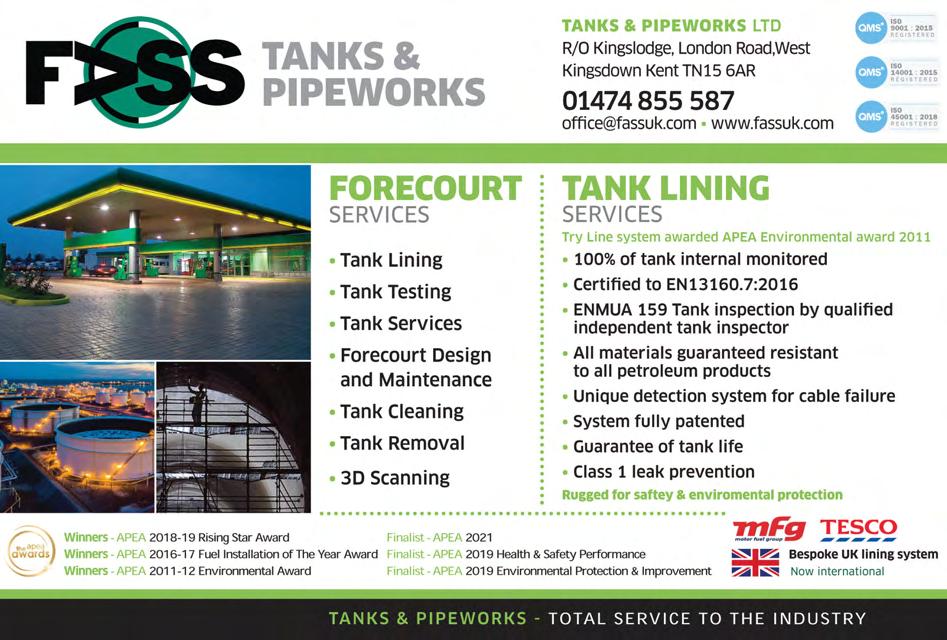
Conclusion
To reiterate, EV fires are currently incredibly rare and pose a far smaller threat to drivers than Hybrids or ICE vehicles. As a quick comparison*:
>> Petrol/diesel vehicles: 1,529 fires per 100K sales
>> Electric vehicles: 25 fires per 100K sales
Indeed, battery electric vehicles (BEV) have only a 0.025% risk of catching fire in normal operation, making them the safest vehicles on the roads today! But who knows – the future may tell a different story…
*Figures supplied by the National Transportation Safety Board
39 APEA tel: 0345 603 5507 www.apea.org.uk Articles
The Evolution of Wetstock Management
By Jeroen van Pelt, Wetstock Business Unit Global Director, Dover Fueling Solutions and Tim Firkins, Wetstock Business Unit Business Development Senior Manager, Dover Fueling Solutions
Rejecting the Status Quo is the Pathway to Improved Risk Management
How skillfully fuel retailers manage their wetstock over the next 10 years will be a defining benchmark for whether their retail operation grows or is forced to leave the marketplace.
Dover Fueling Solutions (DFS) is on a mission to help fuel retailers understand what inaction could really cost them or what it’s already costing them. Jeroen van Pelt, Wetstock Business Unit Global Sales Director, and Tim Firkins, Wetstock Business Unit Senior Business Development Manager, authored this article to help fuel retail executives, forecourt operators and IT administrators understand how a lacking wetstock management program – or reliance on legacy wetstock management programs – puts their balance sheets at considerable risk.
What misconceptions about wetstock management are circulating in the fueling industry?
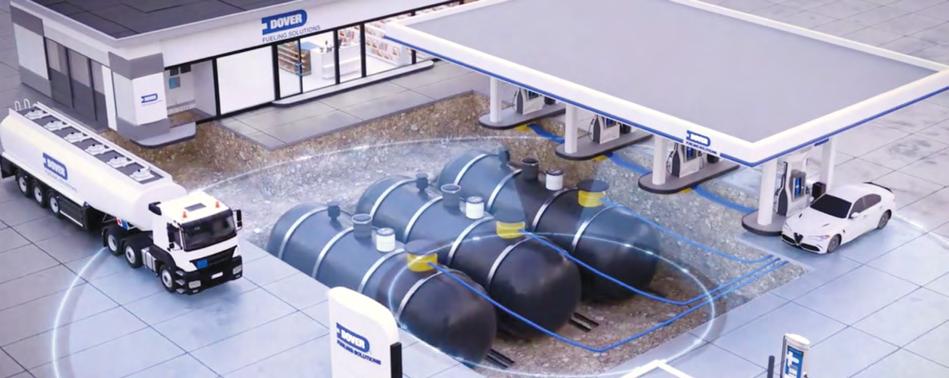
First, it is important to define what “wetstock management” means in the context of today’s global retail fuel operations. When many fuel retailers hear the term “wetstock management,” they think stock control, tank level measurement or leak detection. But true wetstock management is much more. It’s really the end-to-end management of fuel inventory — from the moment a fuel delivery is ordered, pumped into the tanker and dropped into the storage tank, right through to when it is pumped into a vehicle and accounted for in the reconciliation process. Although leak detection is certainly a key aspect of wetstock management, it is more productive to think of wetstock management on a bigger scale, as fuel loss identification and response.
Many fuel site operators are surprised to learn there are more than 60 ways an actual or perceived fuel loss may occur. The reasons for fuel losses range from causes most fuel retailers are familiar with, such as leaks, theft and tank calibration inaccuracies to lesserknown circumstances including drainback and meter drift. Most
fuel site operations lack visibility of the true scope and sources of fuel losses, because legacy wetstock monitoring solutions aren’t designed to process and interpret data in a way that produces an accurate view of inventory statuses. Legacy systems also are unable to filter out the “noise” in the data created by false ags.
Why is it important that fuel site operators adopt end-to-end wetstock management practices as soon as possible?
Fuel is an expensive, volatile asset. As such, several factors are converging, compelling fuel retailers to secure an accurate, realtime, network-wide view of their fuel losses in order to protect their assets.
•When fuel prices skyrocket, volumes drop and revenue decreases. This causes a fuel loss to have a greater impact on operational performance.
•Incidents of theft and fraud increase proportionately as fuel prices rise.
•Globally, the retail fuel marketplace is consolidating. The pool of small retail fueling operations is shrinking, with most networks comprising at least 100 to 400 stores.
•Large networks need visibility of fuel losses across the entire organization, with the ability to seamlessly drill down to every site, storage tank and pump in the operation.
•Forward looking fueling operations are leveraging new technology – especially digital solutions – that are helping them develop a competitive edge.
To read the article in full visit, For more information visit, https://mck8z77grnhs7brdfbblwy21tvcq.pub.sfmccontent.com/syakb5oxudf
Jeroen van Pelt, Global Sales Director
Contact van Pelt at jeroen.vanpelt@doverfs.com.
Tim Firkins, Business Development Senior Manager Contact Firkins at tim.firkins@doverfs.com.
40APEA tel: 0345 603 5507 www.apea.org.uk Articles
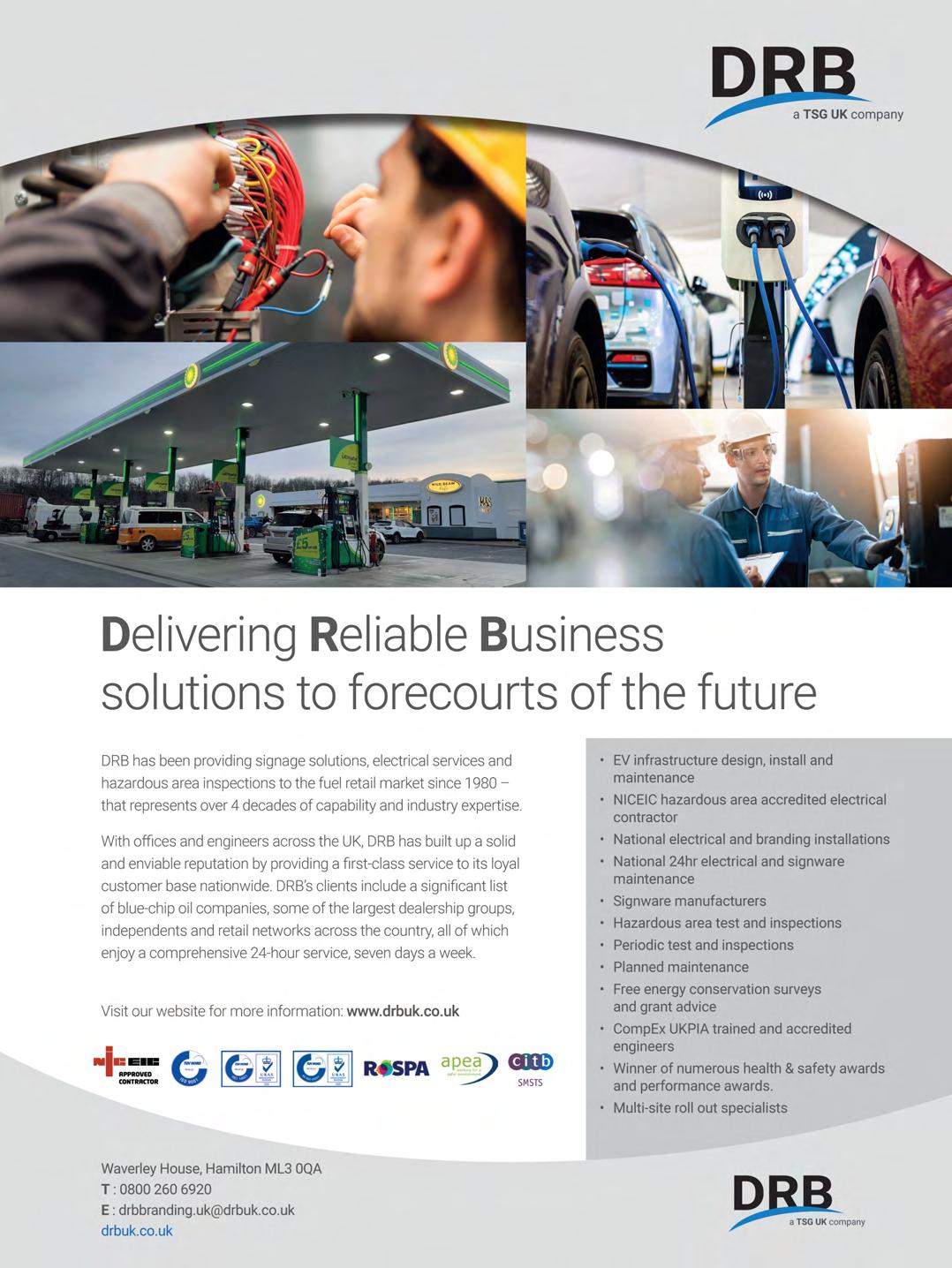
Canopy MaintenanceDo I Need to Maintain my Canopy?
By Andy Kennedy, Global-MSI
The average petrol forecourt canopy was designed for a life of 25 years of normal use in typical UK weather. Given the changes of weather events due to global warming the forecourt canopy is needing to cope with more extreme events than ever previously predicted. With its extensive archive of drawings and records covering the large majority of UK forecourts, Global-MSI know that a significant number of forecourt canopies are over 25 years old and many that are at least 40 years old. Our concern is the lack of preventative maintenance or regular inspections being carried out on these structures. Historically the only maintenance carried out is after the event, either when the roof leaks or the canopy is impacted. Worryingly we have seen instances of major structural failure due to corrosion in the UK (luckily without injury to any persons so far). One recent change we have noted is some insurance companies are now asking owners of failed canopies to supply what maintenance regimes or periodic inspections they had in place before the event? As we all know, insurance companies will always look at minimising their risk.
What causes a canopy to fail?
Luckily failures in canopies are rare. We find through experience failures in the fabric of the canopy are generally caused by corrosion, impact or poor maintenance.
Corrosion is the biggest concern as you would expect with a metal
structure. This process is quicker where either the paint coating is damaged or where trapped water is keeping the structure damp. One very common problem we find is dented roof sheets, caused by untrained people where they have walked on your canopy roof. You don’t know this has happened until you have a leak, (sometimes several years later) as trapped water eventually causes corrosion holes in the roof sheets. Another problem is blocked drainage causing an overflow into the canopy legs, leading to corrosion from the inside. As you can imagine, the legs are the main support and need to be structurally sound to keep the whole thing upright.
Impact damage to canopies is a mainstay of our industry. We must sometimes wonder if the large vehicle drivers ever take notice of height signs. When this happens it can often damage the internal parts of the canopy. That is why we would recommend a proper structural survey after the event, not just a patch up of the signware. If it was your car you were dealing with, wouldn’t you want to make sure the chassis was straight and undamaged underneath and not just get a quick filler and paint job. It is the same with canopies.
Poor maintenance is the last problem. As mentioned there is the problem with people walking on roof sheets. Do you check the people accessing you canopy know where the safe parts to walk
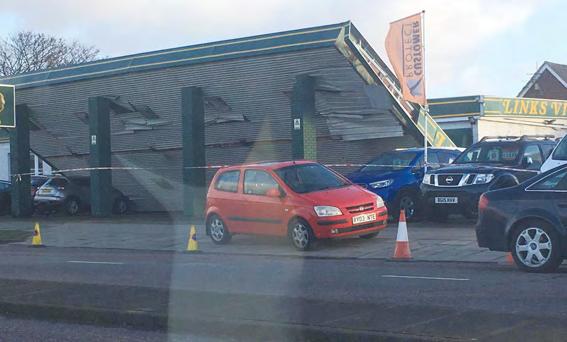
42APEA tel: 0345 603 5507 www.apea.org.uk Articles
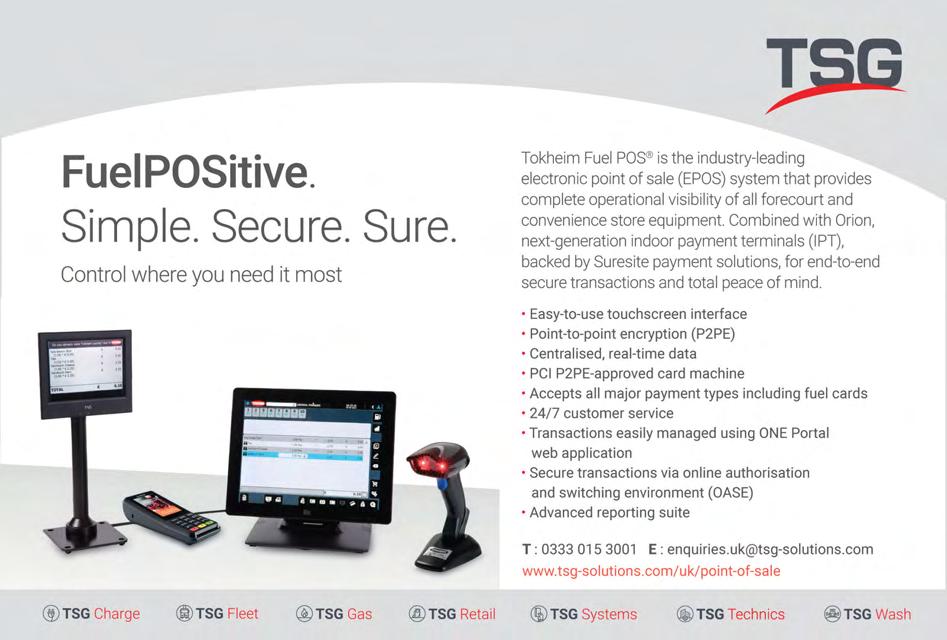
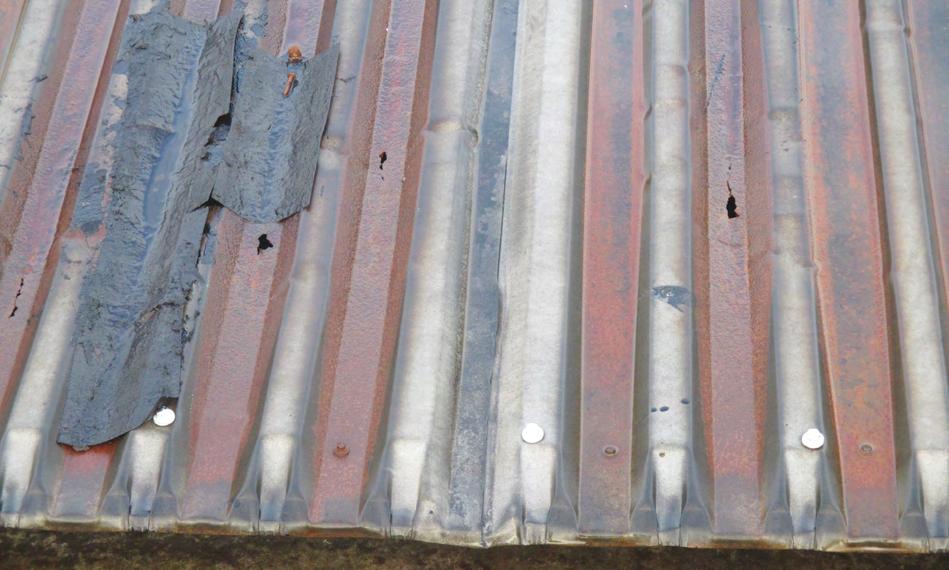
43 APEA tel: 0345 603 5507 www.apea.org.uk Articles
on are? It is worth checking next time you have some electrical or cleaning work done as it is very expensive to fix their damage. The other issue is keeping gutters and drains flowing freely. Blocked water is not your canopy’s friend. This problem is greatly increased where trees are in the vicinity of the site. One other issue we come across regularly is poor quality of remedial work. It may be because the client doesn’t see what the repair looks like or cost restraint has driven the ‘cheapest quote wins’ decision. However, the cheapest job in the short term may not be the most cost effective or in the best interests of your canopy’s life. We often get called back to survey canopies where a quick and cheap fix has been carried out but is short term. Examples are rubber liners fitted to gutters (which never last very long) or long runs of gutters that have been cut into short lengths to transport in a transit van to reduce cost. This can result in multiple leak points in your brand new gutter.
How to increase canopy life and reduce total cost of ownership
We would recommend regular planned maintenance inspections for two reasons.
•You will be aware at an early stage of any potential issues on your canopy. If this is done regularly then you can also keep a track of any problems and assess what repairs are required and when. Early intervention is always cheaper to rectify than waiting until it needs doing urgently.
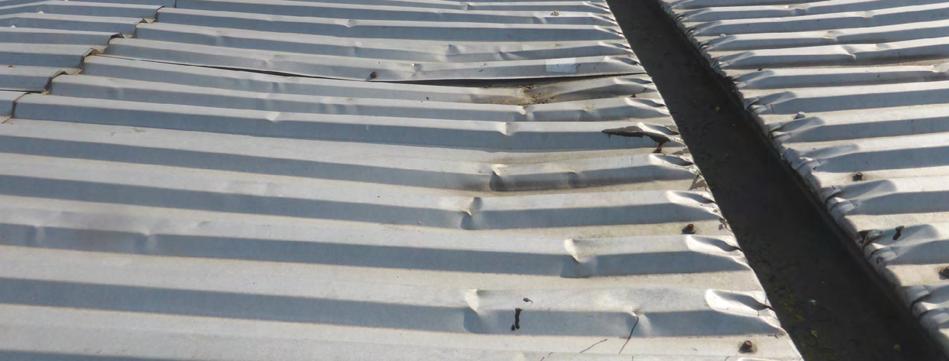
•Having records of maintenance and checks being carried out will also help with insurance claims if you do happen to suffer a canopy failure. As previously stated, some insurance companies are already asking for this.
•Regular maintenance schedules can be far cheaper than you think. If the survey is carried out by a trained canopy engineer, they can often carry out small maintenance repairs at no additional cost on the survey attendance.
•Don’t leave minor repairs until they become major or urgent incidents. That small leak means the canopy integrity is already breached and wherever water is getting in to, corrosion is taking place.
•Only use reputable canopy companies for repairs and don’t just opt for the cheapest quote. It is the cheapest for a reason. Ask probing questions as to what the damage is, what the repair entails and exactly how it will be carried out? Ask for photographs of the problem so you can see what it is and use common sense to judge whether it looks a long term repair.
•Look at longer term investments to protect your canopy from damage. This can range from simple strategic placement of bollards to cutting back problem sections of the canopy or raising it to accommodate larger vehicles.
PEI Recommended Practices
By Jamie Thompson, Chairman of the Technical Committee
PEI’s Recommended Practices are heavily researched, peerreviewed technical documents addressing the biggest operational issues facing the industry. They are reviewed and revised on a regular basis to reflect the latest technologies and industry trends.
Recommended Practices reviewed and revised in 2022:
•RP100 Installation of UST Systems
•RP1000 Marina Fuelling Stations
•RP1100 Diesel Exhaust Fluid
Recommended Practices to be reviewed in 2023:
•RP200 Installation of AST Systems
•RP400 Testing Electrical Continuity
•RP1500 CNG Vehicle Fuelling Facilities
•RP1700 Tank Closure and Removal
These documents are some of the most valuable resources available to the energy handling industry. Having the latest version of each RP helps keep you and your company educated and accurate. These can be accessed through PEI web site.
44APEA tel: 0345 603 5507 www.apea.org.uk Articles
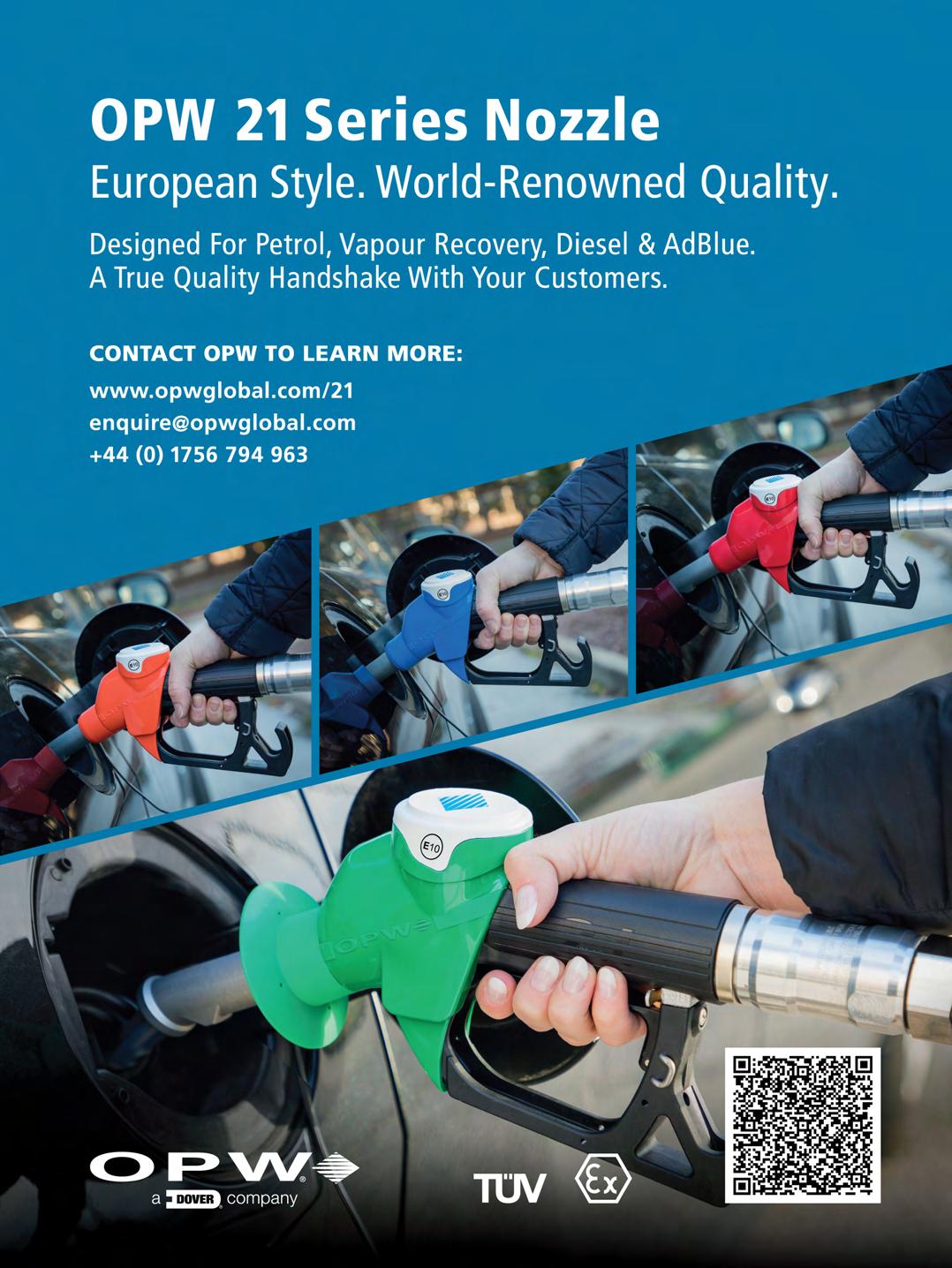
APEA Online Training Courses
By Dylan Kavanagh, Olive Training
What is Hybrid Learning?
Hybrid learning is an educational model where some students attend class in-person, while others join the class online or virtually from home. In some cases, hybrid classes include asynchronous learning elements, like online exercises and pre-recorded video instruction, to support face-to-face classroom sessions. When planned well, hybrid courses combine the best aspects of in-person and online learning while making education more attainable for many students. For hybrid learning to be successful, the elements of your hybrid course can be tailored to the learning format, whether it be in-person or online.
Hybrid vs. Blended Learning
Hybrid learning and blended learning can often be mistaken for one another, and both contain many of the same instructional elements. However, both are two distinct learning models. Blended learning combines in-person teaching with asynchronous learning methods, where students work on online exercises and watch instructional videos during their own time. Hybrid learning is a teaching method where teachers instruct inperson and remote students at the same time. In hybrid learning models, asynchronous teaching methods can be used to supplement synchronous, face-to-face instruction.
Benefits of Hybrid Learning
Both face-to-face and online learning have their benefits and weaknesses. The goal of hybrid learning is to combine the two formats to create a singular learning experience without any weak spots. The main benefit of hybrid learning is ‘a flexible learning experience’.
Many companies transition to hybrid learning for flexibility: a flexible learning schedule, flexibility in teaching modes, flexibility in how learners engage with their learning materials, and flexibility in collaboration and communication between peers and their instructor. For students who aren’t able to attend classes in-person, the hybrid learning environment allows them to learn remotely.
These emerging technologies will help to consolidate and enhance the APEA’s reputation and growth both on a National and international Level. It’s been a privilege to be involved. I look forward to serving as my father and grandfather before me.
A Platform for Self-Paced E-Learning
Mykademy’s progressive platform helps in connecting the world’s finest tutors with their students across the globe. It provides online
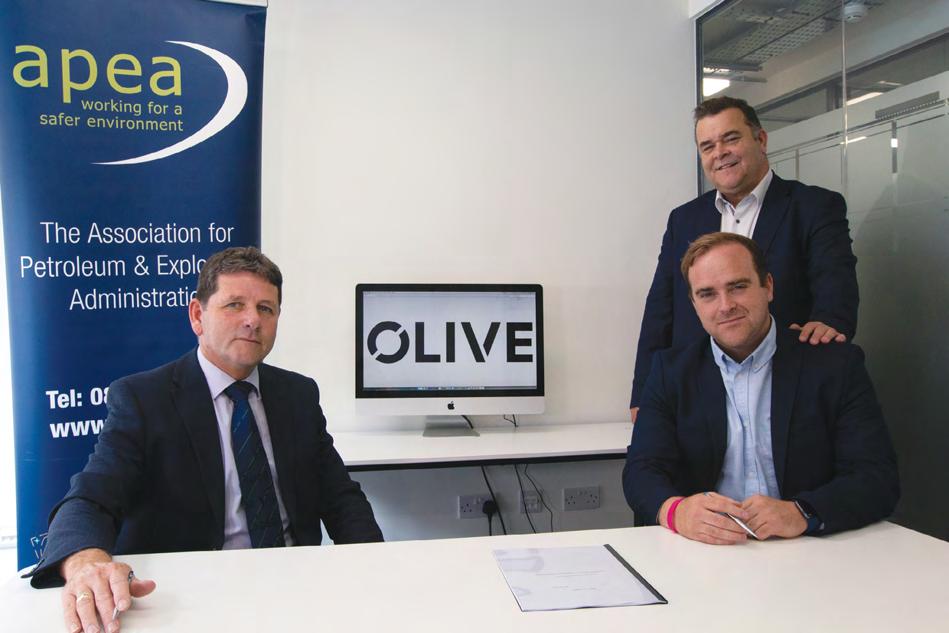
46APEA tel: 0345 603 5507 www.apea.org.uk Articles
Tom Daly, APEA Chairman and Dylan Kavanagh, Vice President and Director and Brendan Kavanagh, President and CEO, Olive Group
educators with state-of-the-art technology and support that facilitate sharing their unique & valuable knowledge and growing their audience while being rewarded for it, easily and efficiently.
APEA’s Mykademy e-learning platform enables its learners to pursue their compliance in Petroleum & Explosive Administration from the 8 Courses they can enrol themselves on to, hassle free. All courses can be taken in one go, or completed over time, with content available 24/7. In addition, these digital contents work on mobile devices so learners don’t need access to laptops or PCs, they can simply use their tablet or smartphone. The learners can track their progress, attend online exams, assessments and knowledge checks based on the courses that they learn from and get certified on it. It also allows them to start a Q&A session with the instructors as well.
APEA’s Mykademy platform ensures its learner’s journey is seamless with its convenient user interface.
The home page lets you sign up and register as a learner to get enrolled to the courses. The payment gateway enables the learners to purchase their courses and checkout securely.
A Dashboard for the learners lets them access their purchased courses, get notified for the upcoming live sessions, assignment and online tests.
The Students can play the videos, attend knowledge checks and even start a Q and A session directly from the course player.
APEA Courses
The following is a brief overview of the modules.

Key Areas of a Filling Station £50
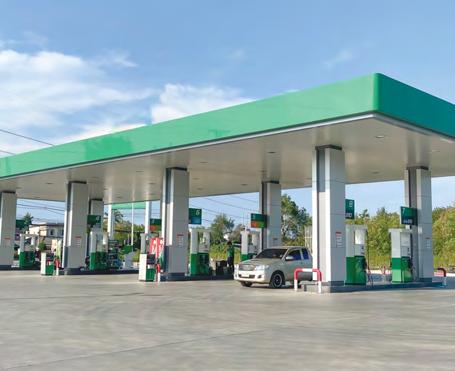
This course begins by going back in time to see how tanks were built for earlier filling stations. We then explore the different types of tanks and how to manage tank leaks. Then, we go through the different types of pipes. Finally, we look at pumping and suction systems.
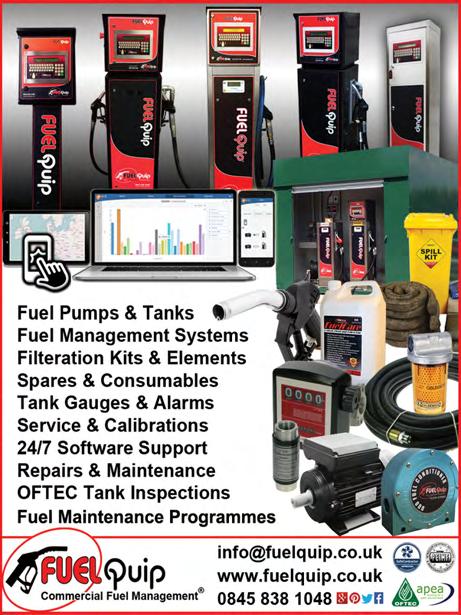
47 APEA tel: 0345 603 5507 www.apea.org.uk Articles
Topics covered:
The underground components of the Filling Station
Storage Tanks
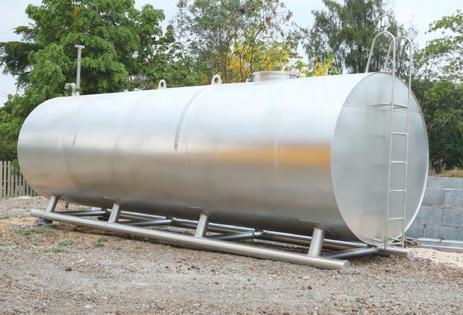
Fuel Pipework
Dispensers & Pumping Systems
The Future of Fuels £50
This course looks at the future of fuel and what we expect to happen as the market and trading environment changes over the coming years. We also cover diesel exhaust fluid or Adblue, fuel standards, and electrical vehicle requirements.

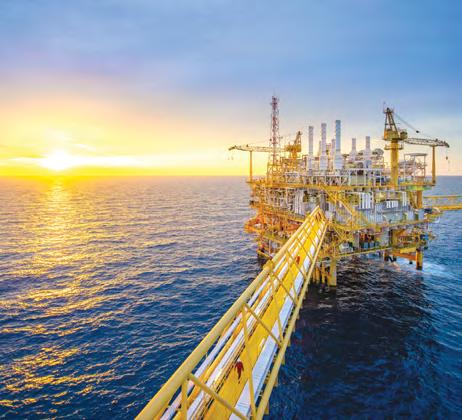
Topics covered:
Future Fuel
Diesel Exhaust Fluid
Fuel Standards
Electric Vehicles
Drainage, Vapour Recovery and Leak Detection £50
Road Tanker Delivery and Consignor Requirements £50
This course outlines the importance of collection and containment of all fuel spilled on site. We look at the different drainage systems that are designed to collect fuel before describing methods of Vapour Recovery and Control and finally looking at leak detection and prevention.
Topics covered:
Drainage Principles
Vapour Recovery
Wetstock & Leak Detection
This course offers expert guidance for Petrol Station Operators, Road Tanker Operators and Road Tanker Drivers, along with Regulators. We look at how to ensure safe road tanker movement on site and prevent the overfilling of storage tanks during unloading of a road tanker along with the safety procedures to deal with overfilling situations. We also look at how to prevent and deal with spillages that occur during unloading of fuel. Finally, we look at controlling potential sources of ignition and ensuring safe delivery of fuel.
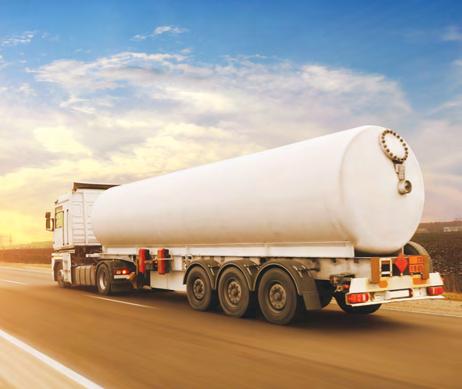
Topics covered:
Unloading Petrol from Road Tankers
Approved Code of Practice
Delivery Types and Procedure
Duties and Risk Assessment
Overfills and Spillages
Responsibilities of Site Operator, Road Tanker Operator and Tanker Driver
Petroleum (Consolidation) Regulation 2014 £50
48APEA tel: 0345 603 5507 www.apea.org.uk Articles

Articles
This course offers expert guidance on the legal framework for petroleum storage, handling and related operations. We look at the origins of these regulations and how they have evolved over the years and then look at the key elements and their application.
Topics covered:
Petroleum (Consolidation) Regulations 2014 Introduction
Introduction & General Prohibition on the Keeping of Petrol
Storage of Petrol on Dispensing Premises
Storage of Petrol in Domestic or Other Relevant Premises
Miscellaneous Provisions
Dangerous Substances and Explosive Atmospheres Regulations
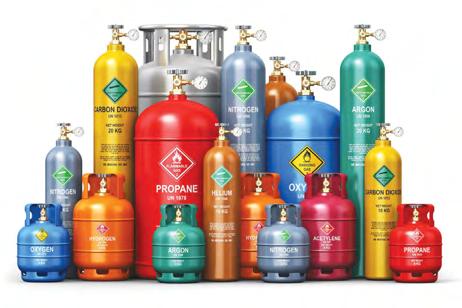
2002 £50
This course has been designed to explain the Dangerous Substances & Explosive Atmospheres Regulations 2002 (known as DSEAR) in its application to petrol filling stations that also serve as workplaces.
Structure of Inspection
Site Risk Assessment
Post Inspection
Power of Regulators and Your Rights
APEA online training on the Red Guide £50
This course takes a detailed look at The Red Guide. It is an advisory document that aids in the safe operation of facilities where petrol is stored and dispensed into vehicle fuel tanks and containers. Enforcers and operators use the Red Guide as a reference document.
Topics covered:
Red Guide Introduction
Contents of the Red Guide
Based on Statutory Instrument 2776; 2002, the course covers each of the 17 Regulations and 7 Schedules together with the supporting Approved Codes of Practices (ACoPs).
Topics covered:
Introduction
The Current Situation
DSEAR - Definitions, Applications and Duties
Elimination or Reduction of Risks
Places where Explosive Atmospheres may occur
Accidents, Incidents and Emergencies
Information, Instruction and Training
Duty of Coordination
Risk Assessment
Maintenance, Repair, and Unloading petrol
Unloading Petrol from Road Tankers
Making Tanks Safe
APEA Inspection Preparation Online Training £50
This course gives you a basic overview of how to plan, schedule, structure, review and conduct an inspection of a petrol filling station. It is ideal for site operators, managers or regulators.

Topics covered:
Objectives of a Site Inspection

Blue Book and Red Guide
Regulator and Site Operator
Expectations and Preparation
On Site Safety
How to Book
Go to https://apea.org.uk/pages/training where you can view the training demonstration video and book the APEA Full Course Bundle or the individual courses.
8in1 APEA Full Course Bundle £250
8 Courses
Key Areas of the Filling Station
The Future of Fuels
Drainage, Vapour Recovery and Leak Detection Road Tanker Delivery & Consignor Requirements
Petroleum (Consolidation) Regulation 2014
Dangerous Substances and Explosive Atmospheres Regulation
2002
Preparing for Inspection
The Red Guide
50APEA tel: 0345 603 5507
www.apea.org.uk
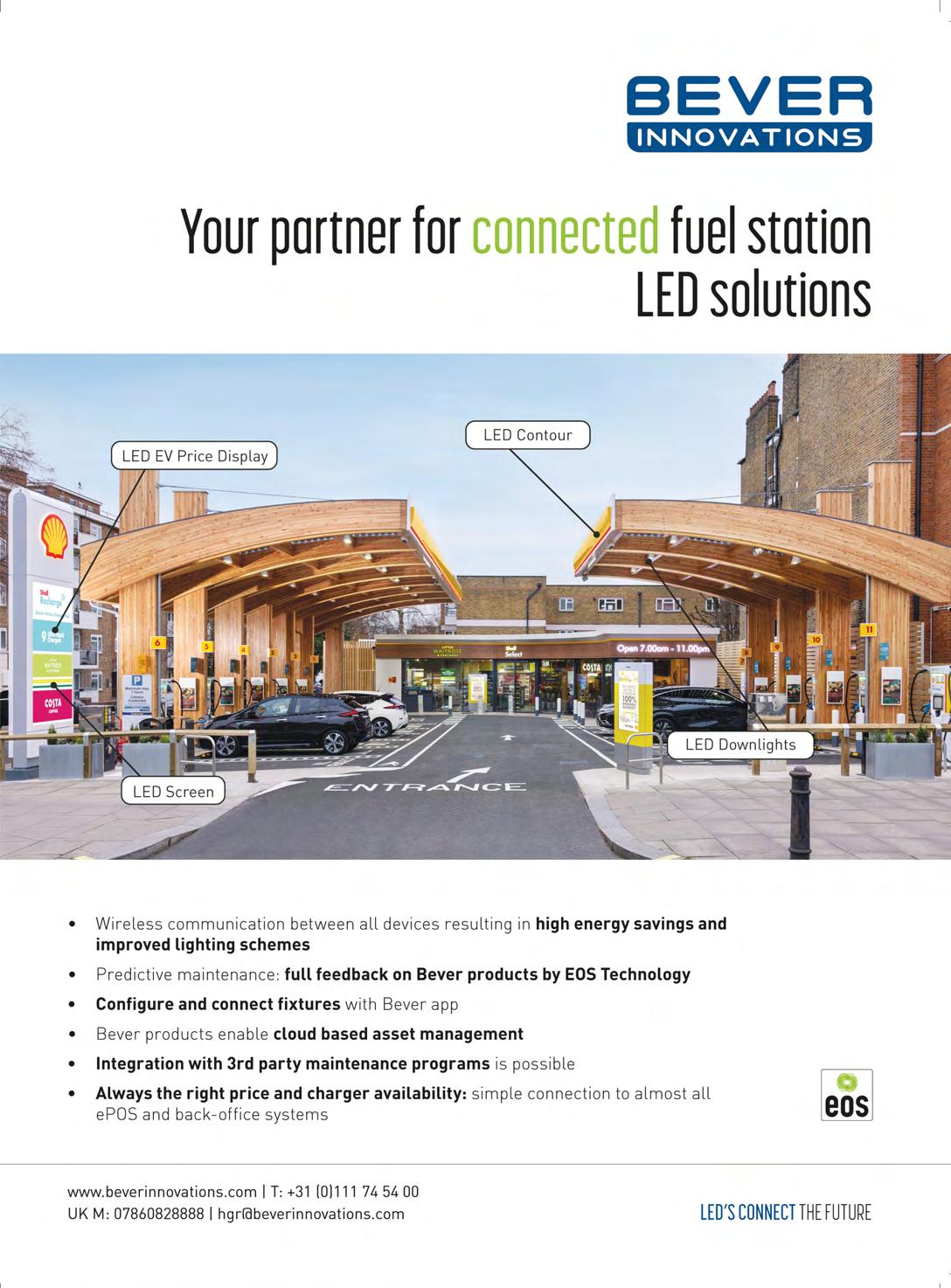
Manipulation Proof Control Box for Gas Tankers Patented
By Dagmar Hoeckner-Schallmeiner, Managing Director, Security & Electronic Technologies GmbH
The Challenge
Oil companies and forwarding agents frequently face the following problem: Products such as fuels and heating oil that are being transported in a tanker do not arrive at the gas station or offloading point in the same quantity or quality as when the tanker set out.
The Solution
The RIEGLER control box for tankers was purposedesigned in order to be able to ensure in future that no manipulation takes place on the way to the offloading point. The control box was developed and patented together with RIEGLER’s client SECUTECH.
The manipulation-proof control box for tankers features a control unit that helps send control signals to magnetic valves. These magnetic valves manage the outlet valves on a tank. Sensors are assigned to the base and collector valves that monitor the actual switching status of the valves. The control box then compares the signals from the push switches with the control signals and determines if there are any discrepancies. Should this be the case, an event signal is sent.
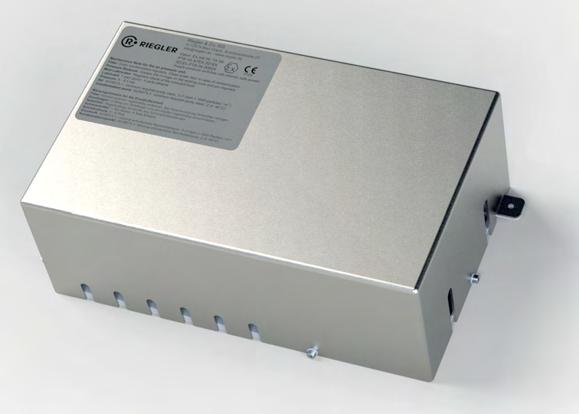
In line with the number of chambers in a tanker, RIEGLER has developed different versions that can be combined with one another. The relevant control valves, sensors, and connectors are protected by a robust and sealable aluminium casing and are not
accessible to unauthorised persons. The connections inside the control box fit the steel hoses that supply the base and collector valves.
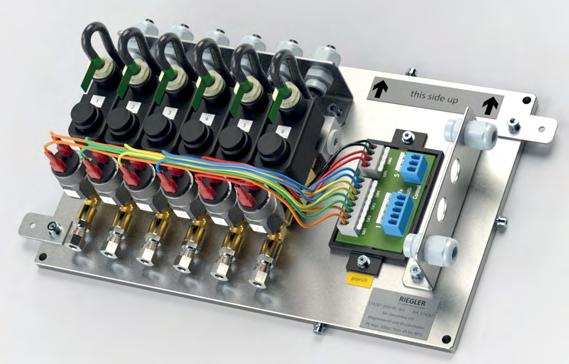
The majority of SECU-TECH customers use the SECU Client data management program. It monitors and manages tracking, mapping, geofencing, and alarmmailing in the event of non-authorised access of the SECU MultiTank System during transportation from loading point to destination. This mature data management system offers clients real-time knowledge of what is happening inside the tanker. The e-mail warnings give the client a direct insight into the vehicle: Data can be filtered, forwarded, processed, and analysed.
They are available in the history until data transmission starts. Via a link, the warn e-mail sends you straight to Google Maps so you can see the location of the tanker just being manipulated. Moreover, you can see which chamber and what vehicle function are being tampered with.
What you get is effective manipulation protection. Fuel theft from tankers now gets documented.
Its product portfolio includes both overfill and overspill protection, product mixture protection systems, Theft protection systems with SPD functionalities and cordless measuring data transmission and filling level measuring systems with the related data management programs, tracking and map- ping solutions.
Contact RIEGLER & Co. KG
Schützenstraße 27
72574 Bad Urach Germany
Tel. +49 7125 9497-0
info@riegler.de www.riegler.de
52APEA tel: 0345 603 5507 www.apea.org.uk Articles
Patented RIEGLER control box with aluminum casing
News
Park Garage Group increase sites under the Texaco brand to 44
Park Garage Group (PGG) has agreed a long-term extension to their relationship with Valero, whilst also adding another four Texacobranded locations to its portfolio. This brings the total number of Texaco-branded PGG sites to 44.

The new sites are all located in the southeast of England with Park Sutton Valance, Park Beckenham and Park Tudor based in Kent and Park Sydenham based in London. The four sites, previously branded BP, will stock all grades of fuel including Supreme and will be supplied by Grays Terminal on the Thames.
“We’ve been working with Valero for over 30 years now and our relationship has incredibly strong foundations. When it came to extending our relationship with them and adding four new Texaco sites to the portfolio, we did not hesitate. Valero’s dedication to helping us to meet our goals has never been in doubt and I’m sure
we have many more successful years ahead of us,” said Hemant Tandon, Park Garage Group Operations Director. Hemant and Manoj Tandon of PGG are continually looking for ways to improve and modernise the services they offer and provide a better overall customer experience. As part of these improvements, they recently decided to re-brand their park & shop stores after 25 years. The new park & shop brand will be introduced onto the four new Texaco sites this year and is due to be rolled out across the remaining PGG sites over the first half of next year.
All the sites offer contactless car valet services, including a jet wash, car wash, air water tower and vacuum. PGG has also seen significant growth from the sale of vaping products. As a result, they have recently introduced vape units into a quarter of their sites and are planning on adding these to the shop floor of all their sites over the next year.
53 APEA tel: 0345 603 5507 www.apea.org.uk UK News
Gridserve achieves 100th charger milestone in the UK
The brand ended 2022 with a series of installations that brought its total number of high-power chargers to 141.
Gridserve has ended the year with a bumper installation of HighPower chargers across its Electric Highway, which took the total number of new 350kW-capable chargers installed in 2022 to over 100. Alongside Moto, the company has recently opened five new Electric Super Hubs at service stations across the United Kingdom, making 30 new 350kW-capable High-Power chargers available for customers on the M1 and M4 highways.
That takes total High Power charger installations for the year to 118, which means the company now operates 141 High Power 350kW capable chargers at 15 locations. This includes its Electric Forecourts in Norwich and Braintree, with dozens of 90kW DC chargers installed.
“We are thrilled to open five awesome Electric Super Hubs and mark a milestone of 100 High Power chargers, and more, this year. Now in 12 Moto locations, the quicker we can roll out Electric Super Hubs across the UK, the quicker drivers will feel confident to switch to EVs with reliable and easy charging across the country,” said Toddington Harper, CEO of Gridserve.
This growth means the firm is now powering over 10 million electric vehicle miles every month and recently recorded its onemillionth customer charging session.
Gridserve currently operates 12 Electric Super Hubs across its network, each delivering between six and 12 High Power 350-kW capable chargers, alongside its Norwich Electric Forecourt, which has 22 High Power chargers, the Moto Rugby Electric Super Hub, with 11 more chargers installed: and its flagship Electric Forecourt at Braintree, with 24 DC chargers.
UK Element 2 and the Tower Group partner to bring hydrogen to Southwest
Both companies to provide access to hydrogen for road transport in the Southwest of England. UK hydrogen refuelling company Element 2 has established a partnership with development company Tower Group to bring hydrogen refuelling for road transport to the Southwest of the UK.
Under the partnership, Element 2 will supply its mobile refuelling solutions in Devon and Cornwall, counties where Tower Group is planning to establish three hydrogen hubs as part of plans to form
a new hydrogen ecosystem for the Southwest. In addition to the mobile refuelling solutions, Element 2 plans to build permanent stations to provide hydrogen-powered heavy goods vehicles (HGVs) with a network of refuelling stations along key routes in Devon and Cornwall.
Tower Group’s hydrogen hub plans include sites along the M5 motorway as well as the key A30 road, connecting the Southwest with London.
Babcock & Wilcox
win contract to support
Phillips 66 carbon capture project in UK
Babcock & Wilcox announced that its B&W Environmental segment has been awarded a contract by Phillips 66 Limited to design a flue gas pre-treatment technology upstream from a planned CO2 capture system on the Phillips 66 Limited Humber Refinery’s Fluid Catalytic Cracker (FCC) in North Lincolnshire, United Kingdom. “B&W has many decades of experience working with customers in the oil, gas and refining industries, providing technologies to make processes cleaner and more efficient,” said Joe Buckler, B&W Senior Vice President, Clean Energy. “As the global leader in pre-treatment technologies for post-combustion carbon capture, the opportunity to work with Phillips 66 Limited aligns well with our experience and expertise.”
“B&W has a complete suite of proven environmental technologies in our portfolio, including the addition of the engineering expertise of our Hamon Research-Cottrell technology, which complements our decarbonization and carbon capture solutions,” Buckler said.
“We thank Phillips 66 Limited for selecting us for this important clean energy project.” Adam Young, Project Lead at the Phillips 66 Limited Humber Refinery, said, “We are pleased to be working with
B&W, leveraging their expertise and knowledge. The pre-treatment is vital to the process to enable the planned carbon capture technology to work optimally.”
Young continued, “Our proposed project would be a first of a kind for an FCC. The knowledge learnt could help to support over 300 FCCs across the world to reduce carbon emissions and support industry to decarbonize.
Phillips 66 Limited’s Humber Refinery carbon capture facility plans are part of the Humber Zero project, a world-scale carbon reduction project to support the decarbonization of critical UK industry. The project aims to capture up to 8 million tonnes of CO2 by 2030.
B&W Environmental is committed to environmental sustainability, designing, engineering and deploying technologies proven to help preserve the earth’s natural resources. B&W Environmental’s technologies can be utilized to remove many pollutants from flue gas, including nitrogen oxides, sulphur oxides, particulates, dioxins, metals and more.
54APEA tel: 0345 603 5507 www.apea.org.uk UK News
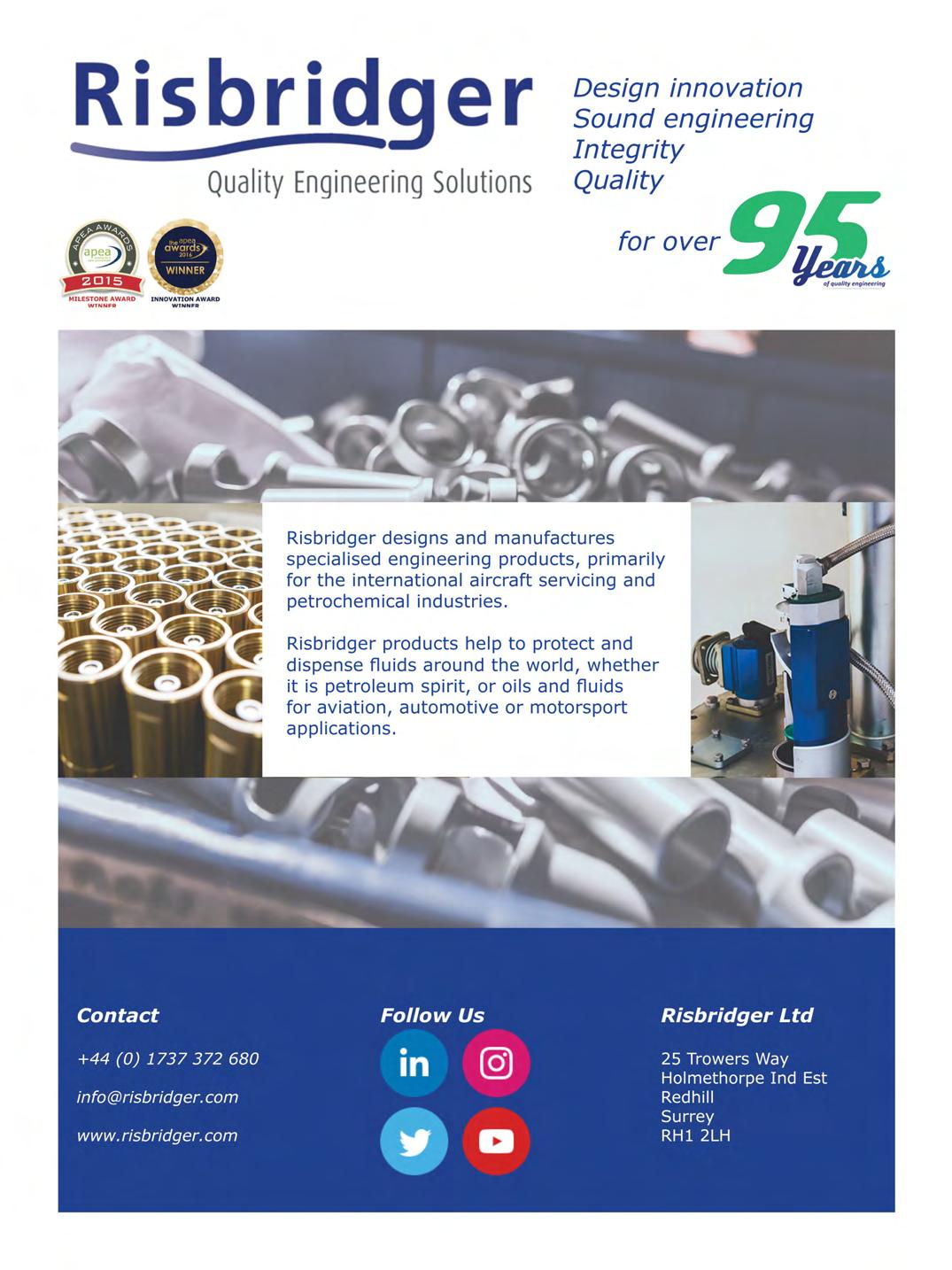
EG Group partners with British Red Cross
EG Group announces its first charity partnership of 2023 with the British Red Cross. The Group has also partnered with The Red Cross across other markets including Italy and the United States. Funds will be raised for the British Red Cross across all UK sites, with both colleagues and customers able to donate from January until the end of April. The retailer will also use the opportunity to highlight the important work carried out across the world by the charity.
“We look forward to working with the British Red Cross, playing our part in supporting the vital work they do on a daily basis. All
the money raised by our EG community could go towards a number of services such as the provision of emergency hygiene packs, buying torches for the vulnerable affected by power outages, and keeping a specialist vehicle funded for a year so people affected by severe weather can be reached,” said Mohamed Valli, Foundations & CSR Manager at EG Group.
For the last 150 years, the British Red Cross has helped millions of people in the UK and around the world get the support they need when crisis strikes.
Motor Fuel Group opened seven new EV charging sites in December
MFG have achieved the biggest monthly roll out of 150kW chargers for a single charge point operator seen in the United Kingdom.
Motor Fuel Group has announced the roll out of seven new electric vehicle charging sites across its stations in December. With its last deployment for 2022, which involved the installation of a total of 38 150kW chargers, the company achieved the biggest ever monthly roll out for any charge point operator in the United Kingdom.
MFG currently has 280 ultra-rapid chargers throughout its network and has committed £400m investment in this equipment by 2030. The firm’s EV charging hubs consist of between four and eight ultra-rapid 150kW EV chargers per site, with plans to augment
them with >300 kW chargers as vehicle battery technology improves to maintain the fastest charging times across its footprint.
“MFG has delivered a further 7 new charging sites across the network in December, completing a successful 2022. We will continue to rollout further EV charging infrastructure throughout the UK in 2023 as part of our £400m investment. We look forward to updating on our strategy and investment plans for 2023 in the New Year,” said William Bannister, CEO of MFG.
These seven new sites were added to the hubs that MFG has already opened during 2022, all of which not only include the new ultra-rapid EV chargers, but also multiple food-to-go and valet services.
Maxol site opens following £2.3 million investment
Maxol has opened the doors to the new Maxol Edenderry Service Station on the Crumlin Road, Belfast following an extensive redevelopment.
In the newly modernised and expanded store, customers can now enjoy the benefits of a brand-new SPAR that is 70% larger than the former premises. The grocery offer has more than doubled in size to include a larger dairy and chilled range. A brand-new Barista Bar coffee unit has been installed while a Delish hot Food To Go concept with a self-serve chicken bar has also been included in the development.
On the forecourt, there is a brand new 150kw EV charge point that services two vehicles at any one time. Maxol’s Premium Fuel range has also been introduced to enable customers to make greener choices and car parking facilities have been increased from six to twenty-seven spaces giving more room to ease the flow of traffic on site.
“While on the forecourt, we have introduced Premium Fuels, Pay at Pump technology and added a new Ultra-Rapid 150 kW EV charge point that will be available from December 21. This development demonstrates our continued commitment to invest in the right infrastructure across our service station network to move Maxol to a more convenience led destination that services the community,” said Brian Donaldson, Chief Executive Officer of The Maxol Group.
The new store sees the continued rollout of Maxol’s sustainable forecourt design. From concept and construction through to the site’s ongoing operations, Maxol has worked with Henderson Group to help Maxol Edenderry reduce its existing carbon footprint. These measures include the use of low-energy CO2 refrigeration; installing LED lighting systems; heat recovery from refrigeration for use in the Delish Food To Go Deli, and “on demand” fan controllers to reduce energy use.
56APEA tel: 0345 603 5507 www.apea.org.uk UK/International News

Puma Energy on track to operate 200 solar service stations
Puma Energy has reached 184 solar power generation projects operational across its global network of service stations and is on track to hit its target of opening 200 solar projects in 2022.
The company has nearly 2,000 retail sites in its network and has assessed how many are suitable for solar installation. The 184 locations now operating across the company’s retail network represent 39% of the 467 company-owned and leased stations where solar installations are commercially and technically feasible.
In its ESG Strategy, published in July 2022, the firm set a target of installing 200 solar projects across its global network by the end of the year. Once operational, the solar projects will have a combined capacity of 6,6 MWp and are expected to generate 9,311 MWh of renewable electricity per year.
“The 200 solar projects we are delivering are just the start of a broader strategy to contribute to the energy transition in Africa. Many of our commercial and industrial customers are looking to
reduce their carbon emissions. By installing solar on our own assets, we have demonstrated our ability to offer to our customers solar solutions. Our aim is to help them hybridise their energy sources and reduce emissions across their operations,” said Sophonie Babo, Head of Strategy and Business Development for Puma Energy.
The aim of the solar generation initiative is not only to reduce Puma Energy’s greenhouse gas emissions on the sites and depots it owns, but also to reduce the emissions of the local dealers who operate many of the retail sites in the brand’s network.
Puma Energy made a commitment to achieve 30% of its Africa EBITDA from clean energy and transition fuels in its 2022 Sustainability Report and ESG Strategy. The rollout of solar solutions for its commercial customers is part of that aim, and to hit the target, the company has committed an initial investment of USD 33 million to roll out its solar offer to its customers, starting with Botswana, Ghana, Malawi, Namibia, Tanzania and Zambia.
Shell opens its first fully electric charging station in the Netherlands
Shell has opened its first Recharge station equipped with only electric fast chargers in the Netherlands. Located in the city of Rotterdam, the company converted a traditional station with petrol and diesel pumps into a mobility hub.
Customers can charge their electric vehicles at one of twelve fast chargers between twenty to thirty minutes. During that time, they can enjoy a tasty snack or a beverage while they finish work or update their social media while being connected to the local wi-fi.
“The world around us is changing, and so is the way we travel. Electric transport and the sharing of electric scooters, bicycles or cars will play a crucial role in the switch to more sustainable transport. That is why Shell is developing its Mobility Hubs in collaboration with partners such as Q-Park, but also at Shell
locations, such as Hofplein,” said Jeanine Bakx, General Manager Mobility Benelux and France at Shell.
The forecourt will add additional services in the coming months and acts as the first of a series of upcoming hubs in the country. In time, the firm wants to expand its offering with shared mobility, with plans to offer recharging capabilities to electric bicycles, scooters and cars for those who prefer to move sustainably, but don’t have their own electric means of transport.
With the transition to sustainable mobility, the site is moving along with the times. The fuel pumps and underground tanks had to make way for fast chargers. In addition, Shell wants to integrate the new location into the broader plan of making the Hofpleinsquare a greener urban site.
Clean Energy announces $150 million to fund RNG growth
The financing provides Clean Energy with additional capital to execute its renewable natural gas growth strategy.
Clean Energy Fuels Corp. is getting a $150 million sustainabilitylinked loan with Riverstone Credit Partners L.P.
This financing provides Clean Energy with additional capital to execute its renewable natural gas (RNG) growth strategy as demand for RNG fuel rapidly rises. Clean Energy’s growth strategy includes the development of negative carbon intensity.
RNG projects and construction of new RNG fuelling stations for transportation sector customers. Proceeds from the term loan will be used, in part, to help fund the company’s rapid expansion of
RNG projects at dairies, which capture fugitive methane and turn it into a fuel made entirely from organic waste and reduces carbon emissions by an average of 300% versus diesel. Demand for the fuel continues to grow as customers like Republic Services, WM, UPS, LA Metro and New York City MTA continue to expand their RNG fleets.
“As we articulated at the beginning of the year, we have big plans to increase our supply of RNG from dairies because when it ends up in the tank of a heavy-duty truck or a transit bus, it is rated cleaner than any other alternative in the marketplace. Our joint ventures with BP and TotalEnergies are having great success,” said Andrew J. Littlefair, President and CEO of Clean Energy.
58APEA tel: 0345 603 5507 www.apea.org.uk International News
Mexican fuel retailers on the eve of a defiant 2023
Onexpo’s end-of-the-year event gathered top representatives from Mexico’s fuel retail industry to experience two days full of informative sessions, inspiring workshops and networking opportunities to welcome a challenging new cycle for the sector.
Mexico’s National Organization of Petroleum Retailers (Onexpo Nacional) celebrated its latest edition of Cumbre Puebla, its yearend gathering of delegates from the country’s top mobility and supplier companies. Held at the Puebla William O. Jenkins Convention Centre on December 1-2, the event hosted a series of formative workshops, exciting conferences and special presentations to close a busy 2022.
In addition to its Onexpo: Convention & Expo last June, the institution organizes this trade fair as a big farewell to the year with the entire local industry together. The show welcomed professionals and exhibitors as a platform for new business opportunities and for nurturing talent through a series of inspiring panels. Some of the topics tackled during the conference program included operational issues such as volumetric controls, verification and demobilization procedures. In addition, government representatives led roundtable discussions that delved into regulations related to fuel sales and their environmental impact.
One of Cumbre Puebla’s most discussed topics was the current status of permits for the transportation, distribution and
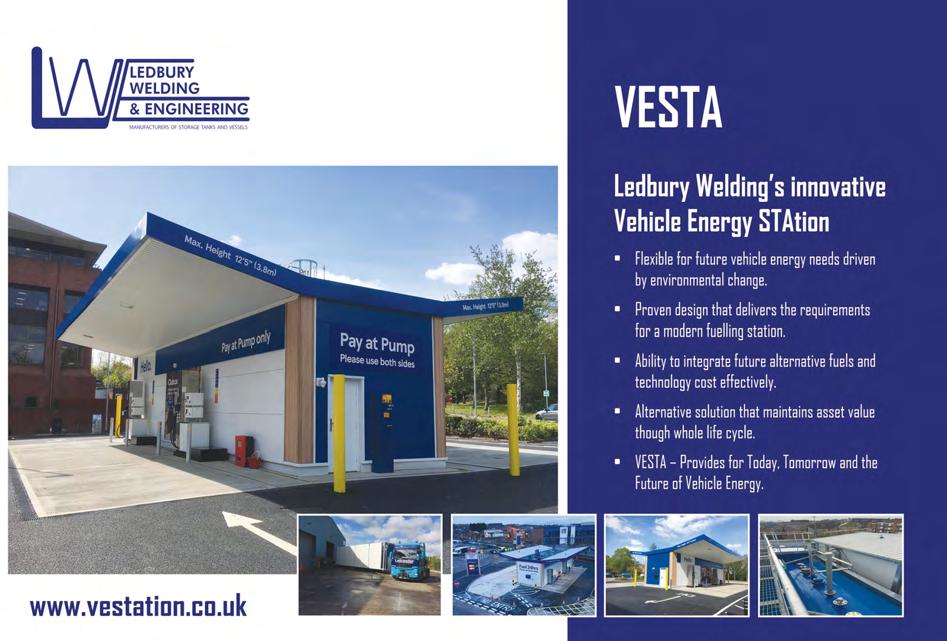
commercialization of fuels across the nation. Companies had to hold back several investments in the sector due to delays in authorizations from regulatory entities, until the last two months when the Energy Regulatory Commission officialised several approvals. Fortunately, this has led to many positive projections, with companies predicting a challenging but prosperous 2023.
Recently, Mexican fuel retailers have witnessed the government tightening its grip on foreign companies operating in the country. However, Onexpo’s President, Jorge Mijares Casas, explained it as a natural process in line with the market maturity retailers aspire to achieve. “Today you see a brand here and tomorrow there is another one and then you have another color, that is precisely what describes an open market.”
Attendees were also able to participate in several networking activities beyond the conference program throughout the two-day fair. Over 50 exhibitors were present on site to showcase their latest innovations to keep pushing the Mexican market forward. Some solutions presented included cybersecurity and regulatory compliance tools as well as self-service ATMs equipped with several payment options.The latest edition of Cumbre Puebla served as an inspiring and formative platform for the energy sector in Mexico to prepare for the year to come. Onexpo Nacional showed once again the importance of a united and connected local industry on the eve of a new cycle for Mexican fuel retailers.
59 APEA tel: 0345 603 5507 www.apea.org.uk International News
BP completes acquisition of Archaea Energy
Archaea expands BP’s presence in the US biogas industry, enhancing its ability to support customers’ decarbonization goals. BP completed its purchase of Archaea Energy Inc., a leading provider of renewable natural gas, marking a milestone in the growth of BP’s strategic bioenergy business.
“We see enormous opportunity to grow our bioenergy business by bringing Archaea fully into BP. The talent, expertise and passion of their team has let them achieve incredible growth so far, and we’re excited to support the next chapter in line with our strategy,” said Dave Lawler, chairman and president, BP America.
Archaea expands BP’s presence in the US biogas industry,
enhancing its ability to support customers’ decarbonization goals and progressing its aim to reduce the average lifecycle carbon intensity of the energy products it sells.
Bioenergy is one of five strategic transition growth engines that BP intends to grow rapidly through this decade. BP expects investment into its transition growth businesses to reach more than 40% of its total annual capital expenditure by 2025, aiming to grow this to around 50% by 2030.
With the close of the agreement, Archaea common shares will cease to be listed on the NYSE.
Eni launches new mobility transition company
Eni announces the incorporation of Eni Sustainable Mobility, its new company dedicated to sustainable mobility. The company is vertically integrated along the entire value chain, bringing together services and products that support the energy transition and accelerate the path to net zero emissions.
Eni Sustainable Mobility will develop bio-refining, biomethane and the sale of mobility products and services in Italy and abroad. The company incorporates existing bio-refining and biomethane assets, including the Venice and Gela bio-refineries, and will oversee the development of new projects, including those at Livorno and Pengerang in Malaysia.
“This new company will join Plenitude and become the second strategic lever supporting our energy transition pathway, which targets eliminating Scope 3 emissions. These have been the most
significant part of our emissions and the most difficult to eliminate as they are generated by customers by using our products,” said Eni CEO Claudio Descalzi.
The new platform will also incorporate a network of over 5,000 sales points in Europe to market and distribute a number of energy carriers, among them hydrogen and electricity, as well as fuels of organic origin including biomethane and HVO (Hydrogenated Vegetable Oil), in addition to other mobility products such as bitumen, lubricants and fuels. These stations will also support Eni’s other mobility-related services such as the Enjoy car sharing service, food services and stores close to Eni’s retail outlets.
The CEO of Eni Sustainable Mobility is Stefano Ballista, formerly Sustainable Mobility Director at Eni Energy Evolution.
Ørsted takes ownership of largest e-methanol project in Europe
Ørsted has taken final investment decision (FID) on the 50,000 tonnes/year FlagshipONE e-methanol project. FlagshipONE will be Ørsted’s first commercial-scale Power-to-X facility and is an important steppingstone towards Ørsted’s ambition of taking a leading position in renewable hydrogen and green fuels.
Reinforcing the commitment to the FID, Ørsted has taken full ownership of FlagshipONE by acquiring the remaining 55% stake in the project from Liquid Wind AB, the original developer of the project.
Located in Örnsköldsvik in Northern Sweden, FlagshipONE is Europe’s largest FID’ed green e-methanol facility. FlagshipONE is expected to enter into operation in 2025 and will produce around 50,000 tonnes of e-methanol each year to help decarbonise the world’s shipping industry.
Global shipping accounts for around 3% of global carbon emissions, and the sector is a focus area for Ørsted as the company expands
its presence in Power-to-X across Northern Europe and the United States. FlagshipONE is the first e-methanol project in Ørsted’s ambitious green fuels pipeline; the company is also developing the 300,000 tonne ‘Project Star’ in the US Gulf Coast area and the ‘Green Fuels for Denmark’ project in Copenhagen, which will both produce significant volumes of e-methanol to enable the decarbonisation of shipping.
“Ørsted is prepared to lead the development of the Power-to-X industry and assume risk in the process – including by advancing strategic projects like FlagshipONE – but regulatory action that matches the ambitions of developers and shipping companies are urgently needed,” said Mads Nipper, Group President and CEO of Ørsted.
Ørsted will start onsite construction of FlagshipONE in the spring of 2023. The project will be located on the grounds of the biomassfired combined heat and power plant Hörneborgsverket in Örnsköldsvik, operated by Övik Energi.
60APEA tel: 0345 603 5507 www.apea.org.uk International News

Adding EVs to U.S. biofuels law is environmental agency’s 2023 task
The US Biden administration could change the nation’s biofuel blending law next year to offer lucrative credits to electric vehicle manufacturers like Tesla, a major rewrite that the oil industry criticizes as subsidizing the EV industry.
The Renewable Fuel Standard, enacted in the mid-2000s, mandates the number of biofuels like landfill or agricultural methane that oil refiners must blend into the nation’s fuel mix, or buy tradable credits - known as RINs - from those that do.
The standard has long served as a battleground between the powerful oil and corn lobbies. The Biden administration’s November proposal would make it possible for electric vehicles charged using power generated by biofuels to receive credits. The proposal would boost benefits for electric vehicle manufacturers such as Tesla.
Adding the electric vehicle industry to the standard will introduce a new set of stakeholders into an already unwieldy situation. The United States has been using biofuel credits to reduce carbon emissions for years, but its effect has been unclear.
The Environmental Protection Agency (EPA), which administers the program, will sort through stakeholder comments in 2023 to
finalize a rule. They must finalize the proposed obligations by midJune. It is unclear if the EPA will change the proposal. The transportation sector accounts for about a quarter of the country’s greenhouse gases, and the biofuel blending proposal comes at a time when President Joe Biden’s administration is pushing for lower-polluting energy sources.
“(The EPA) must also hold true to the legacy of RFS as a liquid fuels program — not an electric vehicle program — by rejecting yet another massive regulatory subsidy for electric vehicle manufacturers,” Geoff Moody, an executive at the refinery trade group the American Fuel and Petrochemical Manufacturers, said last month.
The oil industry thinks the RFS mandates are expensive and threaten to put oil refineries, and its blue-collar workers, out of business. Corn and biofuel groups like the mandates, as it increases demand for their products.
The Alliance for Automotive Innovation, an automobile manufacturers trade group, said it supports an “e-RINs” program. The American Biogas Council also lauded the proposal, saying it will help decarbonize transportation and increase organic materials recycling, especially from small towns, farms and food processors.
Applegreen to expand presence throughout New York
Applegreen is set to open several service stations and convenience stores across the New York Thruway throughout 2023. McDonald’s restaurants will be replaced by the brand’s sites to offer several of its amenities such as coffee service, snacks and beverages, hot meals, and grab-and-go food selections.
As reported by the Daily Gazette, these new openings are part of a company’s $450 million project to modernize 27 outlets. The Original Pizza and Dippin’ Dots brands, which originally partnered with the fast food restaurant, will be replaced by Burger King and Dunkin’ sites.
Jonathan Dougherty, New York State Thruway Authority (NYSTA) spokesperson, explained to the news site that these locations will be similar to a “Stewart’s or a Cumberland Farms”. “You’ll no longer be able to get a Big Mac, but you’ll be able to get a piece of pizza or a hot dog or whatever is on the roller,” explained the entity representative.
Applegreen’s strategy launched back in the summer of 2021 and is funded through a public-private partnership with Empire State Thruway Partners. The firm was awarded a contract to rebuild 23 out of the 27 service area restaurant buildings and provide significant renovations and upgrades to the remaining four.
“We are proud to have been selected by New York as its long-term partner to reimagine and rebuild the driver experience through the New York State Thruway,” added Paula Chirhart, Applegreen spokesperson. There will be no two consecutive service areas closed for renovations at the same travel to ensure the continuity of service during construction.
Applegreen’s U.S. base of operations is located in Glen Rock, New Jersey, and is a subsidiary of the Dublin-based company Applegreen LC. The American firm operates convenience stores across the Midwest and Northeast regions of the country as well as in South Carolina and Florida.
Two killed, 12 missing in northeast China refinery blast
Two people were killed and another 12 missing after an explosion at a refinery and chemical plant in northeast China, state television reported.
The explosion occurred at 3:13p.m. (0713 GMT) on Sunday 15 January at Panjin Haoye Chemical Co Ltd while workers were
carrying out maintenance work at an alkylation facility. Panjin Haoye is an independent refinery and chemical producer in the city of Panjin in Liaoning province.
Thirty people were also slightly injured, according to the TV report, which said the fire has been brought under control.
62APEA tel: 0345 603 5507 www.apea.org.uk International News
Germany’s energy crisis powers hydrogen switch
From the moment Russian gas exports to Germany were first disrupted in June, German firm Kelheim Fibers began casting around for alternative options to keep its engines running. As a result, the Bavarian-based firm, whose fibres are used in anything from teabags to tampons, will be able to use heating oil instead of gas starting mid-January.
The downside is that it will increase carbon emissions and for the longer term. The firm is considering a switch to hydrogen, which is a much cleaner energy source provided it is produced using renewable power. “We want to be one of the first large companies in Bavaria to switch to hydrogen,” Craig Barker, managing director of the 87-year-old firm, told Reuters.

Energy costs account for over 60%-70% of the company’s variable expenses, overtaking that of its main raw material, Barker said. Kelheim Fibers is one of many small and medium-sized companies that form the backbone of Europe’s biggest economy, and that are seeking to diversify their energy mix to maintain output.
Russia’s reduction of gas supplies to Germany following Moscow’s invasion of Ukraine in February has forced Berlin to reactivate or extend the lifespan of its coal-fired power plants, putting greenhouse emissions targets in jeopardy.
However, IFO economist Klaus Wohlrabe said the crisis could
eventually lead to greener production. “Relying on fossil fuels for the long term has proven to be a risky path. So, in the medium term, at least, companies have no choice but to reorientate themselves,” Wohlrabe said.
Kelheim Fibers, which has so far covered 85% of energy needs with gas, is in talks with stakeholders over hydrogen imports with an expected annual consumption of about 30,000 tons, starting from 2025, Barker added. “We definitely need infrastructure,” he said, adding that a pipeline will be needed to connect to the German refinery Bayernoil and a port to cover the demand the company cannot meet from domestically produced hydrogen.
Earlier this month, Germany’s Economic Affairs Ministry approved the construction of the country’s first hydrogen pipeline network. It also announced an action plan to support small and mediumsized companies as they switch to climate-neutral production, including expanding hydrogen infrastructure. More is required to accelerate investments in hydrogen, including a Hydrogen Act to cut bureaucracy and regulate the hydrogen ramp-up quickly, utility industry association BDEW said earlier this month.
“2023 must provide new impetus for investments in renewable energies, hydrogen, hydrogen-capable gas-fired power plants and energy networks,” BDEW president Kerstin Andreae said.
63 APEA tel: 0345 603 5507 www.apea.org.uk International News
Shell celebrates 100 years in Turkey
The global energy player maintains its strong position with 1,150 stations across the country.
Shell is celebrating the 100th anniversary of the brand in Turkey. Shell has been active in almost all parts of the energy value chain with its investments and services for a century.
Working with the mission of energising Turkey’s development since 1923, Shell is celebrating the 100th anniversary of the Republic of Turkey and the centenary of its operations in the country. The global energy player maintains its strong position with 1,150 stations across the country, a lubricant and grease production facility exporting to 68 countries, and extensive activities in hydrocarbon exploration, electricity, natural gas, aviation, maritime and chemicals.
“We are proud to celebrate the 100th anniversary of the Republic of Turkey and Shell’s century-long journey of firsts and innovations. In the past 100 years, Shell has been responsible for the first unleaded gasoline, the first electronic pump, the first electronic Vehicle Identification System, the first differentiated fuel Shell VPower, the first loyalty programme Shell Club Smart Card, the first natural gas trade as an international corporation, the first premium market concept and many other firsts,” said Ahmet Erdem, President of Shell Turkey.
Working to provide reliable and sustainable solutions to the needs of electric vehicles, in relation to charging, in line with its net zero vision, Shell has launched a strategic cooperation with Trugo, the company that provides electric vehicle charging solutions for TOGG.
ENOC Group continues robust retail expansion in Dubai
The ENOC Group is launching two new service stations located in Wadi Al Safa and Wadi Al Amardi. This brings the Group’s total number of service stations in Dubai to 133 and 180 across the UAE. Over the course of the year, ENOC has opened 6 new service stations across the emirate of Dubai, including locations such as DAFZA, Dubai South and Dubai International City.
“As a wholly owned entity of the Government of Dubai, we remain committed to developing the UAE’s retail infrastructure and contributing towards the country’s growing energy needs. Our new service stations will offer customers easy access to fuel as well as automotive and retail services and will add further convenience to meet the daily needs of our customers in the Emirate. Throughout the year, we have opened 6 new service stations in Dubai, which
is a strong testament to our commitment to meeting the energy requirements of the Emirate,” said Saif Humaid Al Falasi, Group CEO at ENOC.
The service station in Wadi Al Safa spans across 40,900 square ft featuring a bridged canopy with four dispenser islands and eight dispensers. It is equipped with five double wall fuel tanks with a capacity of 15,000 imperial gallons and includes an EV charging station, advanced Vapour Recovery System and a ZOOM convenience store. Customers visiting the service station can also benefit from ENOC Group’s ‘Yes’ rewards programme by earning points and rewards when paying for fuel, automotive services or when making a purchase at the convenience stores.
Lukoil studies potential sale of assets in Romania and Moldova
Lukoil is reportedly studying a potential sale of its businesses in Romania and Moldova following the European Union’s sanctions on Russian oil companies. The firm’s local portfolios include service station chains, a refinery in Ploiesti (Romania), a wind farm in Romania and oil depots located in both countries.
The news originated based on a series of local media reports replicated by the news site Balkan Insight. EU’s imposition of the new sanctions came into force on December 5 of last year, which affected several Russian firms’ activities, including Lukoil.
The Competition Council of Moldova states that the company’s subsidiary in the country owns 20% of the local fuel retail market. With 105 stations throughout the nation, the firm registered in 2021 a profit of approximately 60 million lei, the Moldovan currency, which amounts to nearly 3 million euros. It also handles about 40% of diesel imports and 33.5% of gasoline imports to Moldova.
In Romania, the site points out that the company owns about 315 gas stations and employs approximately 3,000 people in the country. As the third largest fuel retailer in the nation, it’s estimated that its retail network is worth nearly 13 billion lei, close to 2.6 billion euros.
Balkan Insight notes that there are two potential buyers for both businesses; Royal Dutch Shell and KazMunaiGaz. The former is the largest player across the whole continent and has already sold its Russian assets to the company last May, while the latter owns a network of Rompetrol stations in both countries.
Recent changes in Lukoil involve the resignation of its former Chairman, Vagit Alekperov, after occupying the position since 1993 and the death of its Board’s Chairman, Ravil Maganov, who allegedly lost his life by falling from the window of a hospital in Moscow last September.
64APEA tel: 0345 603 5507 www.apea.org.uk International News
ChargePoint and Mercedes-Benz to jointly develop fast charging network in North America
A total of 400 hubs will be developed across the United States and Canada to include more than 2,500 fast charging ports.
The electric vehicle charging provider ChargePoint Holdings, Mercedes Benz and MN8 Energy, a U.S. solar stationary power and renewable energy provider, have announced plans to rapidly expand the availability of DC fast charging with the development of over 400 charging hubs across the U.S. and Canada.
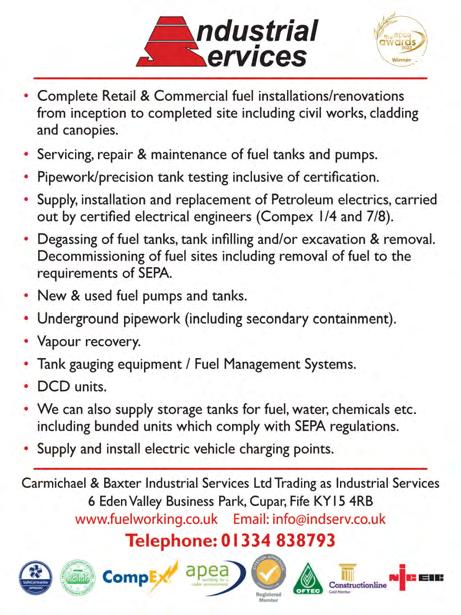
Powered by the ChargePoint network, the Mercedes-Benz charging hubs will be in key cities and urban population centres, along major highway corridors and close to convenient retail and service destinations.
“With this partnership, we are expanding upon our existing relationships with Mercedes-Benz and MN8 to deliver a seamless charging experience for drivers, and turnkey charging solutions at no upfront cost to site hosts. We believe the expansion of charging hubs like these will enable the emergence of a new 30-minute retail economy, at the intersection of innovation and accessibility that combines charging and commerce, giving drivers a superior
experience to charge quickly and easily,” said Pasquale Romano, CEO of ChargePoint.
The fast-charging network developed by the three companies will be equipped with more than 2,500 ChargePoint DC fast charging ports for EV drivers. MN8 and Mercedes-Benz will jointly finance and operate the charging hubs, powered by ChargePoint’s charging hardware and software solutions.
Available to all EV drivers, the Mercedes-Benz charging hubs will offer Mercedes-Benz drivers additional benefits including preferential access via reservation, as well as the convenience of automatic authentication functionality like “Plug & Charge”. While authentication via card, app or head unit will be possible, it’s not required for Mercedes-Benz customers using the Mercedes me Charge service.
These hubs will primarily be powered by ChargePoint Express Plus, which can deliver up to 500kW per port, depending on the configuration. The equipment is designed for easy scale to meet future demand as EV adoption and vehicle capability grows.

65 APEA tel: 0345 603 5507 www.apea.org.uk International News
ExxonMobil sells interest in Esso Thailand
ExxonMobil has reached an agreement with Bangchak Corporation to sell its interest in Esso Thailand that includes the Sriracha Refinery, select distribution terminals, and a network of Essobranded retail stations, delivering on its commitment to strengthen value and overall competitiveness. The transaction will be executed by ExxonMobil’s affiliate, ExxonMobil Asia Holdings Pte. Ltd, which holds 65.99% interest in Esso Thailand.
•Sale includes interest in Sriracha Refinery and Thailand network of Esso-branded retail stations
•ExxonMobil to continue to supply finished lubricants and chemical products in Thailand
•ExxonMobil Bangkok Global Business Centre, exploration and production activities unaffected
“As we execute our strategy, ExxonMobil is focusing its investments on global production facilities to meet the world’s demand for lower-emissions fuels and high-performance products, while divesting assets where others see the potential for greater
value,” said Karen McKee, president of ExxonMobil Product Solutions. “We appreciate the talent and determination of our colleagues in Thailand who have safely provided reliable product supply to the Thailand and Greater Mekong markets for more than 125 years, and we thank them for their dedicated service.”
ExxonMobil will continue to supply the Thailand market with branded finished lubricants and chemical products through a new company to be formed. ExxonMobil’s upstream operations through its affiliate ExxonMobil Exploration and Production Khorat Inc., and ExxonMobil’s Bangkok Global Business Center, which employs about 2,000 people, will not be impacted.
ExxonMobil remains focused on safe and reliable operations and ensuring compliance with commitments made to customers and relevant government agencies and regulators. The transaction is expected to close in the second half of 2023, subject to standard conditions and applicable legal requirements, including approval from regulatory authorities.
Shell opens its first fully electric charging station in the Netherlands
Shell has opened its first Recharge station equipped with only electric fast chargers in the Netherlands. Located in the city of Rotterdam, the company converted a traditional station with petrol and diesel pumps into a mobility hub.
Customers can charge their electric vehicles at one of twelve fast chargers between twenty to thirty minutes. During that time, they can enjoy a snack or a beverage while they finish work or update their social media while being connected to the local Shell wi-fi.
“The world around us is changing, and so is the way we travel. Electric transport and the sharing of electric scooters, bicycles or cars will play a crucial role in the switch to more sustainable transport. That is why Shell is developing its Mobility Hubs in collaboration with partners such as Q-Park, but also at Shell
locations, such as Hofplein,” said Jeanine Bakx, General Manager Mobility Benelux and France at Shell.
The forecourt will add additional services in the coming months and acts as the first of a series of upcoming hubs in the country. In time, the firm wants to expand its offering with shared mobility, with plans to offer recharging capabilities to electric bicycles, scooters and cars for those who prefer to move sustainably, but don’t have their own electric means of transport.
With the transition to sustainable mobility, the site is moving along with the times. The fuel pumps and underground tanks had to make way for fast chargers. In addition, Shell wants to integrate the new location into the broader plan of making the Hofpleinsquare a greener urban site.
Calvera Hydrogen to open 8 stations in Spain and throughout Europe
Calvera Hydrogen has been selected to develop eight new hydrogen stations in Spain and throughout the rest of Europe. The project also involves the deployment of its hydrogen transport system, tube trailers, across these new locations.
Calvera is leading the implementation and development of each project, from design, hydrogen engineering, manufacturing, final testing, certifications and safety checks, as well as periodic maintenance of the facilities. Stations are scheduled to be operative between 2023 and the first quarter of 2024.
“The deployment of these new hydrogen stations is an operational milestone for the company as a result of the work and great effort
carried out by the entire team, both in the development of products adapted to the specific needs of each customer and in the positioning of the company at national and international level,” said Rafael Calvera, President of Calvera Hydrogen.
The company’s new operational milestone is part of its expansion plan for the coming years, which aims to increase its production capacity through the expansion of its facilities nationwide. Calvera plans to close 2022 with a record volume of stations and tube trailers in production that will be delivered to different customers in the markets in which it operates: Poland, France, United Kingdom and Spain.
66APEA tel: 0345 603 5507 www.apea.org.uk International News

Petrobras reinforces security at refineries after threats
Petroleo Brasileiro SA stepped up security at its refineries in a precautionary measure after threats against assets, including Brazil’s biggest fuel plant, two company officials said, speaking on condition of anonymity.
The threats were detected by Petrobras’ intelligence unit monitoring social media communications of supporters of Brazil’s far-right former President Jair Bolsonaro, the two people said. The state-controlled company said all its assets and refineries were operating normally.
“Petrobras is taking all the preventative protective measures required, as a standard procedure,” it said in a statement.
Thousands of Bolsonaro’ supporters on Sunday invaded the country’s Congress, presidential palace and Supreme Court, destroying furniture and shattering windows, in an echo of the U.S.
Capitol invasion in Jan. 6, 2021, by supporters of former President Donald Trump.
The threats to Petrobras targeted assets such as refineries in Sao Paulo, Rio de Janeiro and Parana states, the people said. Petrobras has a 1,000-person private security workforce and is working with state police.
Brazil’s Mines and Energy Minister, Alexandre Silveira, said Brazil’s fuel supply would run normally, as would the country’s refineries. “Besides monitoring the status of protests in these structures, we remain alert and in coordination with other ministries and states to ensure the supply,” he said in a statement.
Rio de Janeiro’s governor Claudio Castro said on Twitter he had deployed state and city police to reinforce security at Reduc, the state’s main refinery.
Clean Energy Fuels opens new station to supply Amazon with RNG
Clean Energy Fuels Corp. has opened another renewable natural gas (RNG) station that will provide an anticipated 1.4 million gallons of the clean fuel annually for Amazon and other truck fleets in the greater Chicago area.
The Romeoville station is part of an agreement between Clean Energy and Amazon for Clean Energy to build 19 stations nationwide. The station is intended to support the retailer in its adoption of RNG, a sustainable fuel produced from organic waste.
The station initially will fuel more than 100 Amazon trucks and is designed with sufficient fueling capacity to accommodate several hundred more trucks. Amazon heavy-duty trucks have already fueled at more than 86 existing Clean Energy stations around the country and under the agreement announced last year, another 17
new Clean Energy-owned stations are slated to follow Romeovill. By dispensing 1.4 million gallons of RNG annually instead of diesel, the Romeoville station will reduce carbon emissions by 15,219 MT metric tons—the equivalent of growing 253,643 trees for ten years, removing 3,308 passenger cars from the road, or reducing 6,112 tons of landfill waste.
“We’re pleased that fleets that operate in Romeoville will now have the option to use RNG fuel. It’s a fuel that will improve air quality and have a positive impact on climate change,” said Romeoville Mayor John Noak. Clean Energy is also investing in the production of renewable natural gas with partners, TotalEnergies and BP, at dairies throughout the Midwest. The RNG produced at these dairies and others around the country will flow into the Romeoville station and Clean Energy’s nationwide fuelling infrastructure.
ENOC opens first eLink station in Sharjah
ENOC Link, the digital mobile fuel supply service for businesses and consumers in the United Arab Emirates (UAE) by ENOC Group, unveiled a new eLink station in the new development of Aljada in Sharjah, marking its entry in the Emirate. The station will be parked in the ZAD parking lot.
Fuelling over 400 vehicles per day, and up to four vehicles simultaneously, the new mobile station will offer consumers a supply of Special 95 and Super 98 at the same price as retail fuel stations.
“The eLink station in Sharjah’s Aljada development will not only cater to the needs of the community, but also those of students who are in the nearby Sharjah University City. As the way fuel retail is delivered continues to evolve, we are committed to reinventing how we can offer better access to fuel in the future whilst also
meeting the needs of the present,” said Saif Humaid Al Falasi, Group CEO at ENOC.
The eLink station does not require assembly and can easily be deployed and relocated to different locations if needed, without any downtime. The station also includes vapour recovery systems to reduce emissions while loading from storage tanks. The subsidiary complies with the highest international safety standards including NFPA, ADR and UL. To minimise health and safety risks, all delivery staff are fully trained to follow strict safety and fuelling protocols.
Founded in 2019, ENOC Link is a fully owned subsidiary of ENOC Group which was created as part of ‘NEXT’, the Group’s digital accelerator program. It enables refuelling and offers an end-to-end digital fuelling experience for consumers and fleet owners.
68APEA tel: 0345 603 5507 www.apea.org.uk International News
Mexico’s Pemex sees poor environmental record as threat to financing
Mexican state oil company Pemex said it has been falling behind in a global race to transition from fossil to renewable energy sources, and that stricter demands from environmentally conscious investors pose a threat.
Investors have for years considered Pemex a laggard as rivals worldwide moved to dramatically decrease emissions from energy production and consumption over climate change concerns.
In its updated business plan for 2023 to 2027, Pemex said its environmental, social and governance (ESG) record risked hurting its financing.
“Limitations from ESG financing” are posing a threat, as is the “acceleration in energy transition that is decreasing the market for Pemex’s crude oil and products,” the company said.
Further weaknesses are “important gaps in reaching net-zeroemissions” and operational challenges, particularly in gas exploration and production.


Julia Gonzalez, an expert on energy and infrastructure at law firm
Gonzalez Calvillo, said Pemex urgently needed private investment and that Mexico should not exclusively rely on public funds to maintain or improve infrastructure.
“Pemex has to make significant efforts if it intends to access financing,” said Gonzalez. “It’s increasingly important to prevent and mitigate risks associated with ESG, including, of course, climate change.”
While the business plan reiterated promises made by President Andres Manuel Lopez Obrador to reduce Pemex’s emissions, it focused on oil and gas production and exploration as well as refining rather than shifting toward renewables.
Lopez Obrador says he inherited a company weakened by decades of mismanagement and corruption under his predecessors. Even so, his energy policies have limited participation by private companies that could bring in funds.
This year, Pemex has come under increased pressure to reduce the vast amounts of natural gas it burns off - including at two of its top priority fields, Ixachi and Quesqui - to the detriment of the environment.
69 APEA tel: 0345 603 5507 www.apea.org.uk International News
Press Releases
EPS expands with acquisition of Herrington Consulting Limited

In-ground risk specialist EPS has acquired Herrington Consulting, a consultancy specialising in the built environment, in a strategic move to combine expertise and provide their development and retail sector client base with an enhanced offering of preconstruction consultancy services.
For the last 20 years, EPS’ primary focus has been on the assessment and solutions for geotechnical and environmental risks, working with top names in the residential, retail and petrochemical sectors and building long term relationships based on a practical, innovative and client focused approach with particular emphasis on commercially sensitive, expedient and cost-effective ground investigation and environmental management services.
Since 2005 Herrington Consulting has specialised in flood risk and coastal engineering/management, surface and wastewater drainage, numerical modelling, as well as daylight and sunlight assessments. The team at Herrington Consulting has extensive practical and academic experience, employing state-of-the-art computer modelling to unlock some of the most technically challenging sites. Herrington’s client base ranges from small private developers, looking to minimise the risk of flooding to new development sites, to government bodies seeking advice on strategic flood risk and large scale coastal management.
EPS Founding Director Will Evans says: “Our intention has always been to ‘grow interesting’, both as a business and as individuals, with a clear coherent strategy based on developing additional
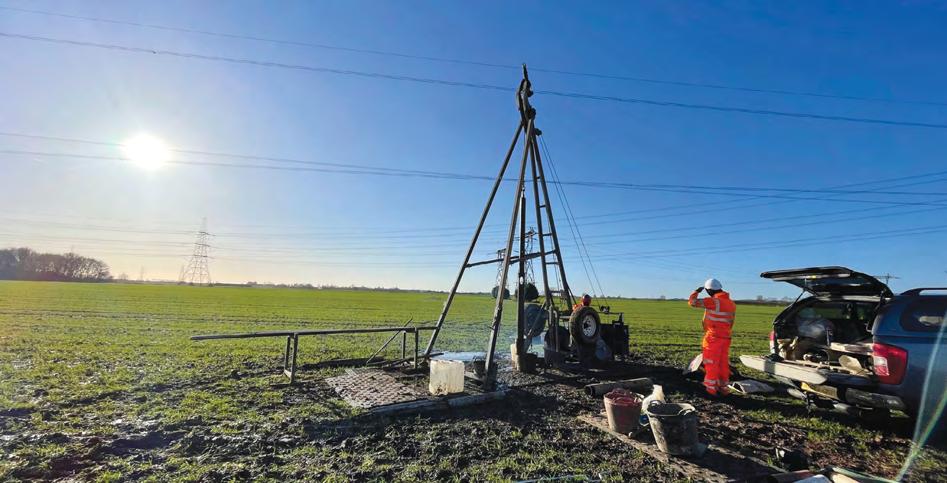
opportunities with existing key national clients, provision of new high quality complimentary services, extension of our geographic footprint and collaboration with other like-minded organisations. The opportunity with Herrington Consulting sits particularly well with that strategy and is tremendously exciting to us, representing a very natural progression for our next step. The collaborative opportunities here are significant and wide ranging, particularly around our innovations with geomatics in 3D ground modelling and materials management and how we will now link with drainage strategies for genuinely joined up solutions to the key development constraints our clients continually face.”
Simon Maiden-Brooks, MD of Herrington Consulting says: “Our key criteria for any change in the company management structure was always to ensure that the values and ethos of Herrington Consulting are maintained. We wanted to join a Group that can complement the technical and specialist skills that Herrington has to offer and the reciprocal - a Group that we can assist to grow. We wanted opportunities to expand geographically and across new sectors, with Partners of a similar size, but most importantly with the same ethics and vision. We believe we have found that with EPS and the future is very bright.”
The combined entity creates a 60 strong team across five locations at Cambridge, Leeds, Bristol, Canterbury and London with annual sales revenue in the region of £4million.
www.epstrategies.co.uk
www.herringtonconsulting.co.uk
70APEA tel: 0345 603 5507 www.apea.org.uk Press Releases
Suresite Group partners with Vianet in strategic move to drive innovation in the unattended contactless payment space
New unattended contactless payment solution launched through the partnership will enable the forecourt retail specialist to tap into new sectors, such as vending.
London, UK, Nov 24, 2022: Leading forecourt retail specialist Suresite Group has recently partnered with payment solutions provider Vianet, propelling them into the growing ‘unattended’ contactless payments industry.
The rise in popularity of unattended card transactions across a variety of settings is expected to surge, as consumer confidence and adoption of contactless payments continues to climb: Juniper Research’s latest Contactless Payments research predicts contactless transactions will grow 130% globally in the next five years, taking the market size from its current $4.7tn to $11tn in 2027. For merchants in the unattended space, this brings to the table an attractive prospect of ‘more-sales-less-cost’ and highly compliant payment options.
The partnership sees Suresite Group’s market-leading acquiring services join forces with Vianet’s contactless payment solution hardware. The result is a competitive, user-friendly and highly secure payments solution able to futureproof any unattended or automated retail business, from charging points and unmanned car washes to air and vac stations.
Crucially for the forecourt retail specialist, the new solution will allow Suresite Group to not only offer its existing customer base even more payment options with the ability to accept payment via contactless devices at any unattended site, but also penetrate new sectors such as vending.
Nick Horne, sales and commercial director at Suresite, explains the strategy behind the move: “As the fuel industry evolves and fuel prices continue to soar, we’re seeing a resurgence in consumer demand for electric vehicles and with it a slow but sure shift from fuel to electric. Typically, dispensing electricity is lower risk than
petrol or diesel, making it ideal for unattended contactless payment.
“Our strategy at Suresite is to continually innovate, introducing more and more hardware options to our customer base. The partnership with Vianet will allow us to grow our presence outside of the fuel industry, yet leverage those existing customer relationships in the forecourt sector - which alongside charging points, also opens up opportunities with unmanned car washes, jet washes and air and vac stations.”
Alongside existing opportunities in the forecourt sector, the partnership will also open the door for expansion into new sectors for Suresite, who have already signed vending contracts with facilities management companies, as well as contracts with car wash companies.
“At Vianet, as well as vending machines and car washes, we’re seeing more demand for unattended contactless payments being applied to the likes of pool tables, ticket machines, arcade games, jukeboxes, photobooths, laundromats, golf ball dispensing in driving ranges and much more,” says Craig Brocklehurst, Chief Operating Officer at Vianet.
“Enabled through the Internet of Things (IoT), our innovative payment solutions offer many benefits for both the merchant and end user. The usability of the device - which is easy to interact with, hygienic, and convenient - is the main benefit from a cardholder’s perspective. From the merchant perspective, contactless payment solutions in general enable operators to maximise sales and reduce costs, but our hardware specifically is PCI level 1 compliant, making it highly secure, transaction fees are competitive, and it also has the capability to advertise other services on it. Unique to the market, if the merchant has coffee and donuts available in store, for example, they can advertise this to their car wash customers whilst they’re sitting in their car, either on the device itself or from a wireless 4K stream to a local TV.”
UKPIA welcomed the roll out of higher ethanol content petrol in Northern Ireland
UKPIA welcomed the roll out of petrol with higher ethanol content in Northern Ireland as a further step towards reducing greenhouse gas emissions.
The move to petrol known as E10, which contains up to 10 percent ethanol, is fully supported by the downstream oil sector as a practical measure to further reduce transport carbon emissions with minimal impact on drivers, filling station operators, or the wider community.
Before today standard (or ‘premium’) petrol in Northern Ireland contained up to 5% ethanol. The move to E10 in Northern Ireland aligns with Great Britain which successfully switched in September 2021.
Elizabeth de Jong, UKPIA Chief Executive Officer, said: “UKPIA is clear that transport will need low carbon fuels if the UK is to meet its Net Zero target by 2050 and today’s change is an important step in the UK’s broader energy transition journey.
“Petrol and diesel engines will continue to be a large part of the vehicle fleet, as will hybrids, beyond the 2030 phase out of new combustion engine vehicle sales which are not zero emission at the tailpipe.
“E10 can reduce emissions of such vehicles and deliver greenhouse gas savings early. This move will also support the development of low carbon fuels that will be required over the longer-term for aviation and heavy goods vehicles.”
71 APEA tel: 0345 603 5507 www.apea.org.uk Press Releases
Mark Tentis named a Vendor Director on ICA Board of Directors
Northville, MI – January 18, 2023 – OPW Vehicle Wash Solutions is pleased and proud to announce that Mark Tentis, the company’s Senior Vice President for Global Sales and Service, has been named as one of two new Vendor Directors on the 2023-24 Board of Directors of the International Carwash Association.
The ICA is a non-profit organization that for more than 65 years has represented the interests of the vehicle wash industry in the United States and around the world.
“For many years, the International Carwash Association has been a vital and steadfast advocate for the vehicle wash industry worldwide, so it is a great honor to be selected as a Vendor Director on the association’s Board of Directors,” said Tentis. “I can’t wait to
start collaborating with my fellow board members as we work with a wide array of ICA members and their companies to find new and exciting ways to identify challenges, craft solutions and generally optimize performance within the vehicle wash industry around the globe.”
Tentis, who has 22 years of experience as a professional in the vehicle wash market, was nominated for the Vendor Director position by his fellow colleagues in the industry. He will serve a two-year term, which began on Jan. 1, 2023, as a Vendor Director.
To learn more about the complete range of vehicle wash equipment and payment systems offered by the companies of OPW Vehicle Wash Solutions, please visit opwvws.com.
ISTOBAL maintains its delivery deadlines despite tensions in supply chain
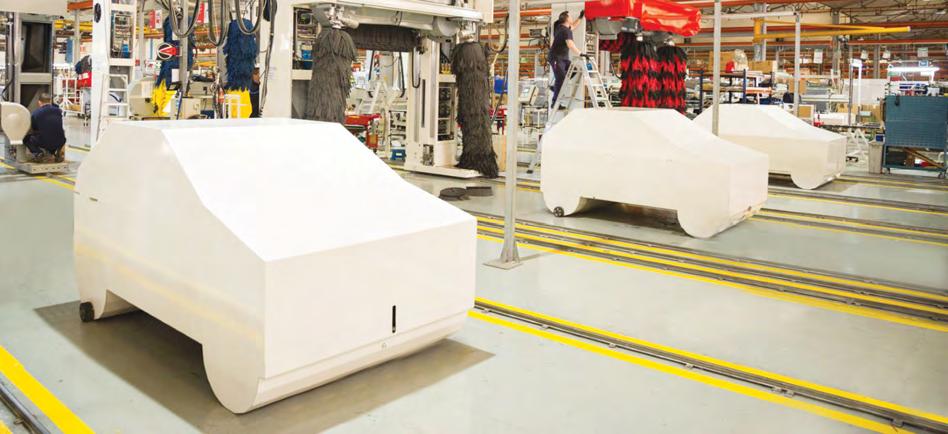
•They broke production records in November and December 2021, as well as container exports, despite the difficult situation of the ports and the shortage of containers and materials.
•The monitoring of supplies and data management in real time, logistics alternatives, transversal communication throughout the value chain, among other measures, have allowed them to speed up their service times.
ISTOBAL, the leading Spanish group in vehicle wash and care solutions, maintains its delivery deadlines in 2022 despite the tensions in the supply chain thanks to the measures adopted in advance at its production plants, production, warehouses and production planning.
The digital transformation of ISTOBAL’s operations, together with the coordination of all its departments and the continuous improvement of its processes, has allowed the company to increase its agility and flexibility. This way, ISTOBAL manages all its resources more efficiently and guarantees customer service, despite the scarcity and increase in the cost of materials, the increase in logistics and freight costs, the difficulties in international transport, among other problems of Supply Chain.
Mª José Ramón, Director of Operations of ISTOBAL, has highlighted that the adoption of new strategies that permeate the entire value chain such as the implementation of crisis rooms or “war rooms”, the deployment of the S&OP (Sales and Operations Planning) process, in addition to the continuous improvement of
72APEA tel: 0345 603 5507 www.apea.org.uk Press Releases
processes and systems, has allowed the company to face the crisis in the supply chain and offer the best solution to its customers.
“Thanks to the actions carried out with our teams, we achieved production records in November and December of last year and broke container export records, despite the difficult situation of the ports and the crisis of lack of components and containers”underlined Mª José Ramón.
ISTOBAL’s strategic plan to deal with difficulties in the supply chain is based on three methodologies that promote agility and the level of competitiveness in the current context to guarantee the continuity of production, distribution, and customer satisfaction.
Faced with the supply crisis, ISTOBAL has activated several crisis and monitoring rooms, focused on the visualization and management of real-time supply data and supplier management, made up of a multidisciplinary work team for quick decisionmaking. Likewise, it has promoted a single operational model with all its subsidiaries and has enabled a specialized logistics team to manage transport, in addition to promoting transversal communication throughout the value chain, from the supplier to the customer.
One of the initiatives carried out has been the elimination of external warehouses, integrating all this material in the ISTOBAL facilities with a double objective, to reduce manufacturing lead time and improve internal logistics. In order to launch this project,
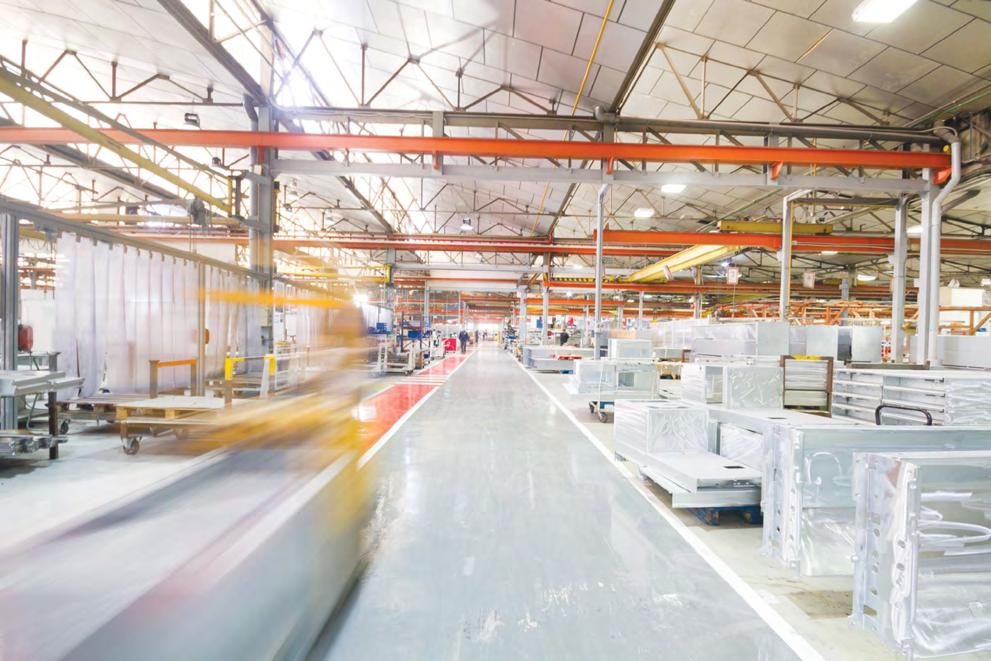
important changes have been made to the layout in the production plant, which have not at any time affected production at the company’s headquarters or affected any order.
Additionally, ISTOBAL has launched various processes at the level of stock management to maintain the same level of service for its customers under current conditions.
In the opinion of Mª José Ramón, communication, coordination and synchronization of teams and processes in an agile manner, which affect the entire value chain, have been the keys to success.
Thanks to the flexibility of production lines and adaptation to the complexities of the supply chain, ISTOBAL has managed to increase its degree of efficiency, improving quality indicators, delivery times and customer satisfaction, becoming a company with ratios of first level with robust, automated and digitized processes.
In recent months, not only have production and export records been achieved while maintaining delivery deadlines, but thanks to the focus on continuous improvement, ISTOBAL has managed to exceed its best results in the main operational management indicators. Thus, the results obtained in the internal efficiency indicators of the production chain have been increased by up to 30%, reducing by more than 50% the quality incidents detected in regular controls thanks to the numerous improvements implemented in products and processes, and with the best full compliance with deliveries achieved to date.
73 APEA tel: 0345 603 5507 www.apea.org.uk Press Releases
Implico Group with new leadership
Hamburg, Germany – The global digitization specialist for the energy industry, Implico Group has repositioned its management team. After four years at the company, the previous CEO Tim Hoffmeister leaves at his own request. Effective immediately, Rolf Adam, formerly of Hitachi Solutions, takes over the lead.

“In the last years, we have reorganized our internal processes and structures, we have successfully built up our partner network, and we have positioned ourselves as a thought leader in the energy industry. On this sound foundation, Implico will develop itself further as a global product company with major international customers. Now that this milestone has been completed, I deem it a good time to hand over the reins and take on new challenges outside the company,” says Hoffmeister, explaining his move.
“With his broad expertise and experience, Tim Hoffmeister has developed a cloud strategy for Implico and thus made a significant contribution to its further development as a global digitization specialist,” says Nikolaus Winther, Partner at Implico shareholder BPE, regretting the decision. “We express our special appreciation and thank him very much for his achievements and his work for our portfolio company,” Winther continues.
Succeeding Hoffmeister, Rolf Adam will assume responsibility for the Implico Group as CEO with immediate effect. He will manage the company together with Dr. Volker Braun as CTO. Adam is a proven expert at the interface of digitization and cloudification with many years of international management experience in the energy and IT industries. Most recently, he was Senior Vice President and General Manager for the DACH countries (Germany, Austria, Switzerland) at Hitachi Solutions.
With the new management team, the Implico Group aims to further drive the internationalization and digitalization of logistics processes beyond the energy sector in the context of SAP Industry Solutions. Furthermore, the company will keep a strong focus on the cloudification of the terminal management market.
ISTOBAL launches a new online configurator for the customisation of their rollovers
This new tool is now available for public use on ISTOBAL’s website. The program allows immediate visualization of the equipment in the user’s choice of brush colors and lighting configurations in a fast, intuitive way.
•It offers customisation of its entire range of rollovers quickly and intuitively – choose brush colors, lighting options, and various other components according to the needs of each customer.
•The configurator generates a customised render in only a few minutes providing a reference document with details to download, share, or connect to a sales consultant.

74APEA tel: 0345 603 5507 www.apea.org.uk Press Releases
•The tool offers a high visual impact, shortening debates on equipment options and brush colors in the decision-making phase.
ISTOBAL, a leading Spanish group in the wash and care solutions for the automotive industry, has launched a new online configurator for the customisation of rollovers. The company introduces this innovative tool to the car wash and care industry through the group’s website. Easy and quick to operate, the program’s main use is to facilitate the configuration of ISTOBAL rollovers.
The new product configurator makes it possible to customise the full range of ISTOBAL rollovers. In a few simple steps, the program generates a customised render according to the preferences of each customer and the options allowed for each piece of equipment.
Aimed at improving and automating the design, presentation, sale,
and management of ISTOBAL rollovers, this innovative online tool generates a tailor-made render according to the customer’s tastes and needs in just a few minutes. It provides customers an easy way to adapt the image of the rollover in a wide variety of ways such as, the choice of brush colors (solid, striped, and custom), available lighting options, as well as fairing designs and colors.It also provides a reference document with all the details of the configuration to connect with a sales consultant. In this way, it offers a great visual impact in the purchasing phases of an ISTOBAL rollover and shortens the product configuration times.
Accessible from the product sheet on the ISTOBAL website, once the rollover customisation process has been completed, it allows the PDF with all the configuration details to be downloaded and shared via e-mail or WhatsApp.
The ISTOBAL product configurator is currently available in two languages, Spanish and English, and will soon be available in other languages of the group’s key markets in Europe.
SGB GMBH becomes part of the Elaflex HIBY group
ELAFLEX HIBY and SGB are pleased to announce that the ELAFLEX HIBY Group, with its headquarters in Hamburg, has acquired the German supplier and manufacturer of leak detection technology SGB GmbH, headquartered in Siegen, as of December 1st, 2022.
SGB GmbH celebrates its 60th anniversary this year. SGB leak detectors are used for monitoring any double-walled tanks and pipes for leaks. The technology leader of innovative leak detection solutions thereby sustainably protects the environment.
The goal of both companies is to strengthen and further develop the entire portfolio of leakage and monitoring systems for doublewalled tanks, pipelines, and containment areas. The focus is on leakage and monitoring systems for high-vacuum applications for hydrogen and LNG.
Stefan Kunter, CEO of the ELAFLEX HIBY Group says, “We are absolutely delighted to welcome SGB as part of the EH Group, which has been recognised for decades, with its management and employees. The acquisition of such a high-performance company provides us, as an internationally operating system supplier for refueling technology, with an excellent basis for further development of our product concepts.”
SGB will retain its operational independence and sales channels in the
new constellation. Jost Berg will remain as Managing Director and continue to lead his team of 45 employees at the location in Siegen. Jost Berg explains, “We are very much looking forward to working together as we share the same visions and values. By combining our expertise and experience, we strengthen our leading positions in the market and create a future oriented basis, for our high-performance equipment and service standards. The SGB team will continue to support all customers and partners with its quality, innovation and perfect service in the future.”
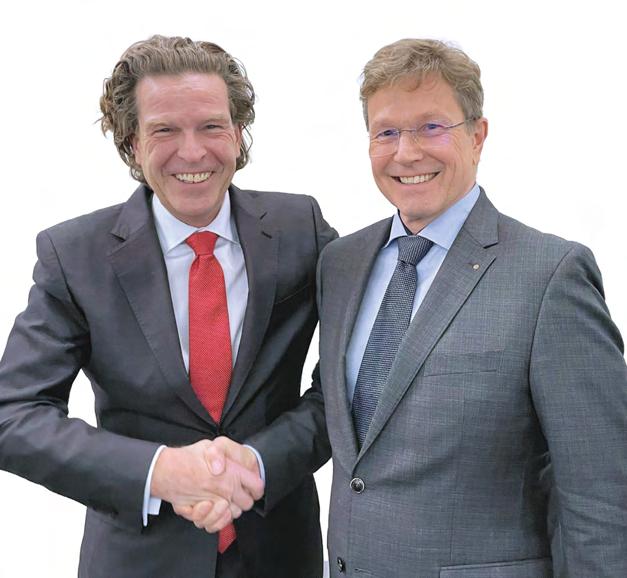
75 APEA tel: 0345 603 5507 www.apea.org.uk Press Releases
Stefan Kunter and Jost Berg
UKPIA calls on Government to speed up publication of its hydrogen transport and storage business model or risk Net Zero targets
In response to the Government’s consultation, UKPIA has expressed concern about plans to publish the business model by mid-2023 because the delay could hold back vital investment decisions.
Some low carbon hydrogen projects will need transport and storage facilities to be in place before final investment decisions are made, and it can take up to four years for the infrastructure to be built.
Elizabeth de Jong, UKPIA’s CEO, said: “The message from our members is clear - the timescale for publishing the business model
is too long and risks delaying investment decisions for vital hydrogen projects. Government should consider how it can bring forward the publication of the business model to help bring these projects to fruition as quickly as possible.”
A coordinated approach is needed to align the development of transport and storage infrastructure with that of major production facilities. This will help ensure that hydrogen production has an associated demand that can be supplied. Otherwise, there is a risk that production plants could start without customers, or transport and storage infrastructure standing idle due to a lack of production infrastructure.
UKPIA Statement on the Competition and Markets Authority Update Report
Following the publication of the Competition and Markets Authority (CMA) update report, a UKPIA spokesperson said: “UKPIA welcomes the interim decision by the Competitions and Markets Authority (CMA) not to make a market investigation reference at this time, following the CMA’s initial update report on its road fuel market study which it published. We note that the CMA agrees with our view that ‘refining margins are largely
dictated by global supply and demand.’ “UKPIA understands that price increases at the pumps are a concern for motorists, families and businesses across the UK. Prices this year have been most affected by changes in crude oil prices and other supply and demand factors, which have been particularly volatile in 2022 due to factors outside of the industry’s control. “We will continue to work with the CMA as their analysis is completed.”
Branches
Irish
The Irish Branch held a meeting on the 11th of October in Gormanstown Co. Meath which was well attended by members from both Northern Ireland and the Republic of Ireland.
The main topics discussed were as follows:
•Competent person training – Fuel retailers are finding it increasingly difficult to have trained staff managing the forecourt/fuel authorising process as a result of high staff turnover.
•The Department of Enterprise, Trade and Employment are proposing new Regulations to update the previous 1979 Dangerous Substances (Licensing Fees) Regulations. The updated fee structures proposed would generally see an increase in the fuel store licensing fees and would be more reflective of the cost of processing license applications incurred by each licensing authority.
•The recent tragic incident in Donegal where 10 people lost their lives following an explosion in a retail petrol station.
•The regionalisation of the dangerous substances licensing regime was once again discussed. While it hasn’t progressed much this year, discussions between the relevant government departments are still ongoing.
•There were a number of Vapour Recovery courses run nationally in September/October for Local Authority and Fire Authority officers. The courses were held in different venues around the country. Most authorities were represented, the courses were well attended and the feedback was positive.
•The date for the AGM was set for the 24th November and suggestions for guest speakers was discussed.
76APEA tel: 0345 603 5507 www.apea.org.uk Press Releases/Branches
The Irish Branch held their AGM on the 24th of November in Gormanstown Co. Meath. Once again it was a very well attended event with representatives from both the North and South of Ireland, the petroleum industry, the Regulatory Authorities and the relevant Government Departments.
The Chairman Tom Daly presented his report outlining the activities of the past year. There was an increase in the number of training courses run nationally. These courses presented a great opportunity to highlight both the profile of APEA and the benefits of membership, and were an excellent forum for networking and the sharing of technical knowledge and information. The Chairman thanked the officers and members of the outgoing committee for their work and support during the year and wished the incoming committee every success for the coming year.
The Treasurer Danny Keohane presented the accounts to the meeting which were proposed, seconded and accepted by the membership. The incoming committee were then elected and the meeting was concluded.
Following the meeting there were three excellent presentations given by guest speakers as follows:
1.John Kennedy of Maxol gave a very good presentation on the rollout of Electric Chargers in the Maxol fuel station network in North/South Ireland. His presentation outlined the many challenges they faced during this process which included obtaining planning permission, the complicated and costly process of securing the necessary power supplies, and the challenges faced installing the infrastructure onsite.
Scottish
The Scottish Branch held a meeting in the Glynhill Hotel near Glasgow Airport on 9th September 2022. Ten members attended.
The guest speakers were Fraser Stevenson, Vice Chairman of the British Fireworks Association, Chris Mason, fireworks display organiser and Scott Boyd of the Scottish Government’s Building Safer Communities Department.
The topic for presentations and discussion was the new Fireworks and Pyrotechnic Articles (Safety) Act 2022. The Act comes into force in stages after receiving the Royal Assent on 10th August 2022 and aspects of the effect of the act on Trading Standards Departments and the Fireworks industry were discussed by Scott Boyd, Fraser Stevenson and Chris Mason.
The explosives and fireworks legislation leading up to the new Act was outlined in a presentation by Ian Hillier, the Branch Representative. Fireworks are still subject to the Explosives Act of 1875 but are also subject to a range of subsequent regulations including the Explosives Regulations of 2014.
Scott Boyd outlined the general principles of the new Act and emphasised that it only applied to Scotland. The Act will come into force in stages by Commencement Orders issued by the Scottish Government.
Fraser Stevenson outlined the effect that the new Act will have on
2.Finbarr Power of An Post (Irish Post Office) gave a presentation on An Post’s increased use of HVO and electric vehicles in its fleet, thus reducing their fleet emissions significantly in recent years. They have recently achieved zero emission postal deliveries in Dublin by the use of EV’s and e-trikes, and nationally manage much of their postal delivery services using EV’s. All An Post HGV’s use HVO and Finbarr presented impressive data on the benefits of HVO use in terms of reduced fleet maintenance costs, comparable fuel costs and reduced emissions. His presentation was well received and had lots of tangible facts and figures to make the use of HVO in HGV’s an attractive consideration for HGV operators.
3.Dr. James Carton, Professor of Sustainable Energy at Dublin City University gave the final presentation of the day on Hydrogen Fuel Technology Development. His presentation discussed how Ireland’s overall energy requirements will likely evolve, and specifically how hydrogen development and production will likely fit into this energy model. He described how the three hydrogen fuelled buses currently in use in Dublin since 2021 were evidence of transport fuel change. Overall his presentation was very informative on future fuels for transport on land/air/sea, and how wind energy/offshore wind energy is evolving so that over-production of electricity from wind energy could be used for future hydrogen generation.
Michael O Connell APEA Irish Branch Representative
fireworks retailers in Scotland and the possibility of illegal sales increasing to fulfil demand.
Chris Mason gave a presentation on the possible problems that may attach to the increased demand for community fireworks displays.
At the end of the presentations all of those attending took part in a discussion on the possible new legislation to restrict the sale of fireworks to certain periods and ban all year round sales of fireworks. Also discussed were the promotion of fireworks exclusion zones and the introduction of a licensing system for the purchase of fireworks.
CPD certificates were awarded to all members.
UPDATE
The first Commencement Order came into force on 10th October 2022. This brought into effect the section which bans the proxy sale of fireworks to anyone under 18. It is now a criminal offence in Scotland to buy fireworks for a person under 18 or to give fireworks or pyrotechnic articles to a person under 18. There is an exemption for Category 1 fireworks which are not covered by the section of the Act.
Ian Hillier Scottish Branch Representative
77 APEA tel: 0345 603 5507 www.apea.org.uk Branches
Training
Online Training courses
To book go to the Training page on the APEA website at www.apea.org.uk for the link or to https://apea.org.uk/pages/training or https://apea.mykademy.com/

Key Areas of a Filling Station £50
The Future of Fuels £50
Drainage, Vapour Recovery and Leak Detection £50
Road Tanker Delivery and Consignor Requirements £50
Petroleum (Consolidation) Regulation 2014 £50
Dangerous Substances and Explosive Atmospheres Regulations
2002 £50
Inspection Preparation Online Training £50
The Red Guide £50
8in1 APEA Full Course Bundle £250
8 Courses
Key Areas of the Filling Station
The Future of Fuels
Drainage, Vapour Recovery and Leak Detection
Road Tanker Delivery & Consignor Requirements
Petroleum (Consolidation) Regulation 2014
Dangerous Substances and Explosive Atmospheres Regulation
2002
Preparing for Inspection
The Red Guide
Training course dates and locations 2023
3 Day Combined Petrol Filling Stations –Construction, Audit and Inspection Course
27 - 29 March 2023Manchester Airport
12 - 14 June 2023Solihull
4 - 6 September 2023Stansted Airport
2 day Electrical Installations - An Awareness
17 - 18 April 2023Manchester Airport
15 -6 September 2023Swindon
Explosives and Fireworks
5 October 2023Stansted Airport
Please contact the APEA office for a quotation for a bespoke course we can run at your offices, for any of the courses listed below, at admin@apea.org.uk, with an approximate number of delegates and preferred dates.
Wetstock Management
17 April 2023Manchester Airport
11 September 2023Stansted Airport
DSEAR
19 April 2023Manchester Airport
12 September 2023Stansted Airport
Petroleum (Consolidation) Regulations 2014
24 March 2023Manchester Airport
7 September 2023Stansted Airport
Petrol Filling Station courses on request
Vapour Recovery Installations
Leak Investigation
Enforcement Procedures
Safe Installation and Use of LPG
78APEA tel: 0345 603
www.apea.org.uk Training
5507
Course Fees
Prices excluding VAT.
More information and booking details on the “Training” page at www.apea.org.uk.
Anyone booking a training course that is not an APEA member will automatically receive complimentary “Individual” membership to the APEA for one year.
Courses will be designed around the (4th edition) Blue Book Guidance for the Design, Construction, Modification, Maintenance and Decommissioning of Filling Stations (May 2018).
A hard copy and a pdf version of the 4th Edition is available from the Publications page of the APEA website at www.apea.org.uk
The hardcopy is £75.00 to APEA Members and £150.00 to non APEA members. There is no VAT charged on the hardcopy or pdf formats. The pdf version can be purchased with a licence for individual use and cannot be shared or printed. It is strongly
recommended that attendees have access to this document during courses.
For details of this and any other training enquiry, please contact:
Jane Mardell - APEA Business Manager
email: admin@apea.org.uk
Tel: + 44 (0) 345 603 5507 or Thomas Daly (Training Committee Chairman)
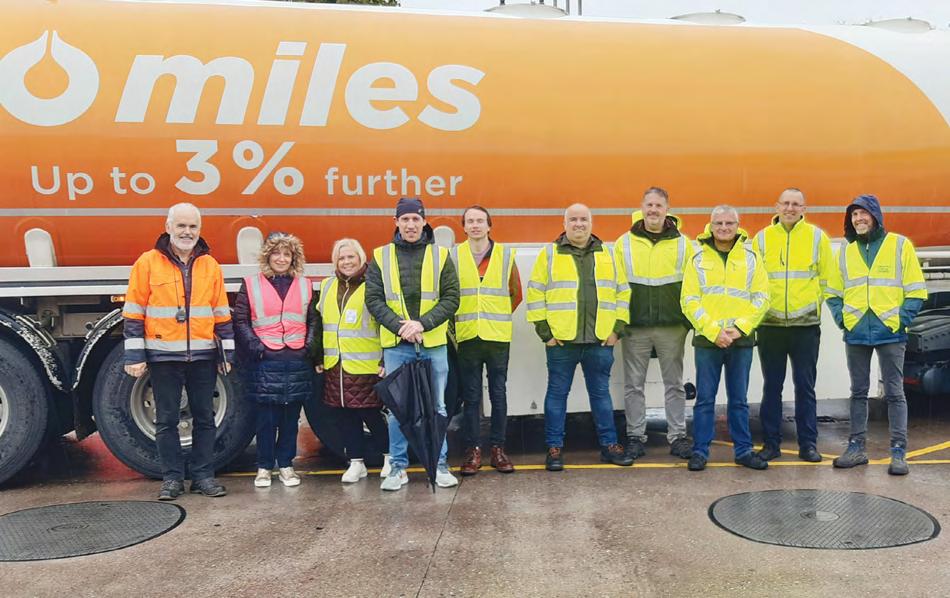
Tel: +353 876899281
email: thomasdaly@apea.org.uk
79 APEA tel: 0345 603 5507 www.apea.org.uk Training
APEA MemberNon member 3 day course with accommodation£1020.00 £1120.00 3 day, day delegate rate £810.00 £910.00 2 day course with accommodation£650.00£750.00 2 day, day delegate rate £550.00 £650.00 1 day course £260.00 £310.00
Delegates from the Vapour Recovery course held at the Circle K Eastgate Service Station in Ballincollig County Cork, Ireland.


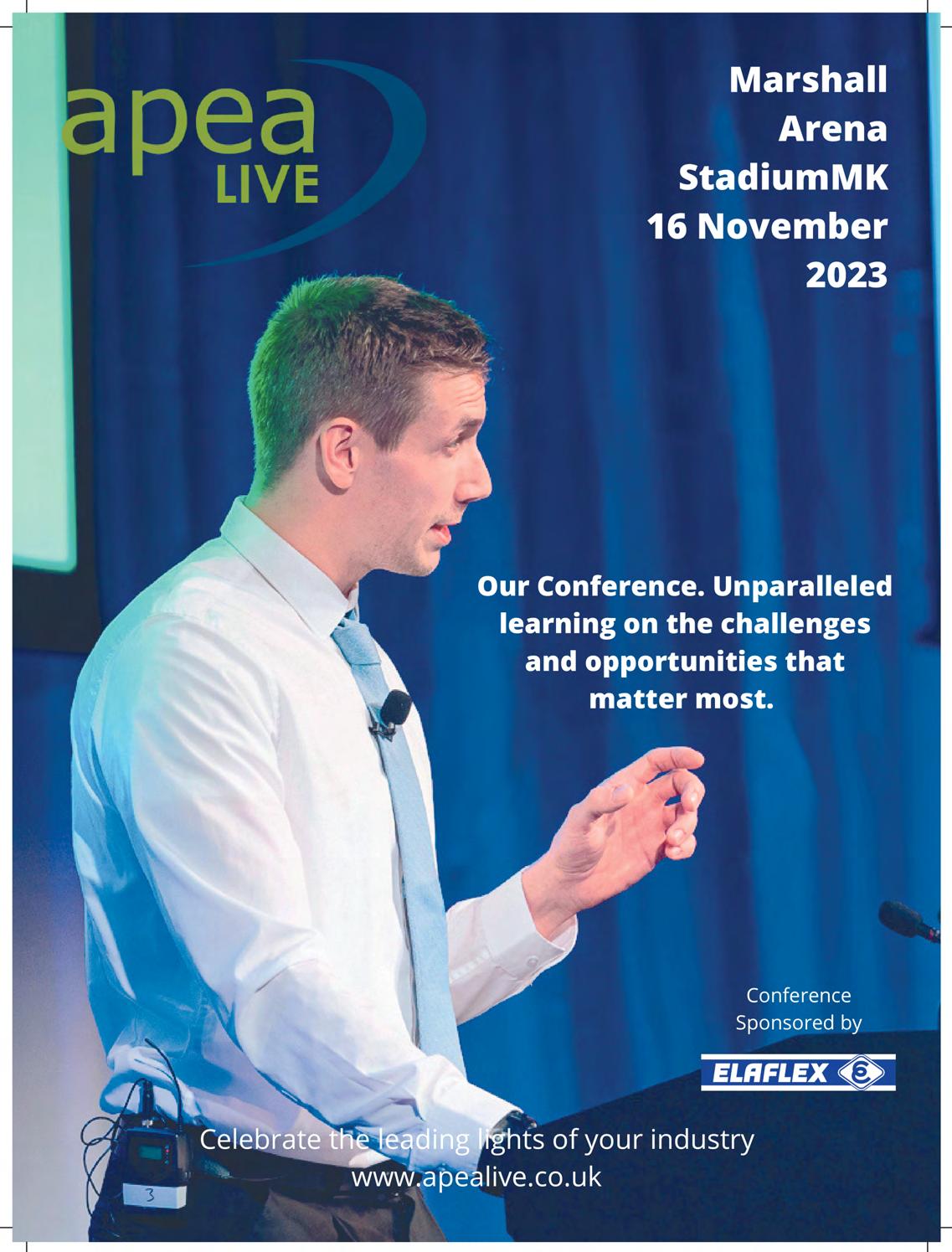



 APEA (The Association for Petroleum and Explosives Administration)
APEA (The Association for Petroleum and Explosives Administration)


























 By Jane Mardell, APEA Business Manager
By Jane Mardell, APEA Business Manager























































































